The post Huge PETA Win! You Can Now Enjoy Guilt-Free Sips Without the Upcharge at Starbucks appeared first on PETA.
This post was originally published on Animal Rights and Campaign News | PETA.
The post Huge PETA Win! You Can Now Enjoy Guilt-Free Sips Without the Upcharge at Starbucks appeared first on PETA.
This post was originally published on Animal Rights and Campaign News | PETA.

Plant-based giant Beyond Meat has partnered with foodservice operator SSP Group to bring the Beyond Burger to UK airports and train stations. It is available at 13 locations, including The Camden Bar & Kitchen at London Stansted and Brigg & Stow at Bristol Airport, and will be rolled out at another six in December.
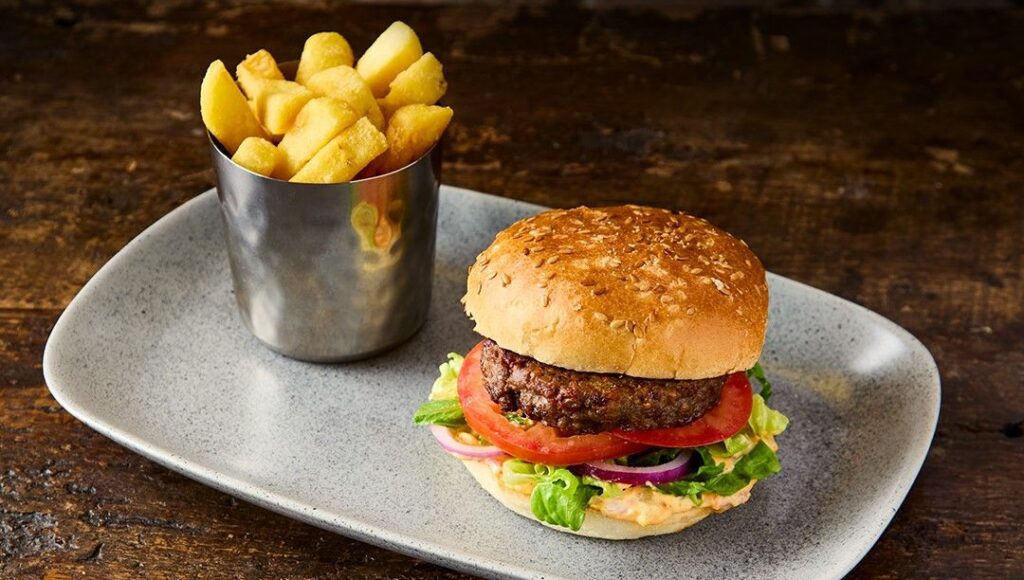
Beyond Meat is also delivering on its promised expansion in Germany, expanding from freezers into the chilled aisles of Edeka, which now stocks burgers, hack (mince), sausages, and more.
Speaking of Bristol, local favourite VeBurger is opening a second location on Whiteladies Road in Clifton. It will give away 100 free vegan burgers on day one.
Across the Atlantic, Slutty Vegan‘s location in Birmingham, Atlanta is reopening months after it was temporarily shut, but this time under new ownership. Company founder Pinky Cole has gifted the restaurant to its former general manager Reatta Hall, a local resident who has been at the company for three years.
London-based Grounded has brought its clean-label plant protein milkshakes to the US, with Whole Foods Market carrying its chocolate and mint-chocolate variants in 150 stores across both coasts.
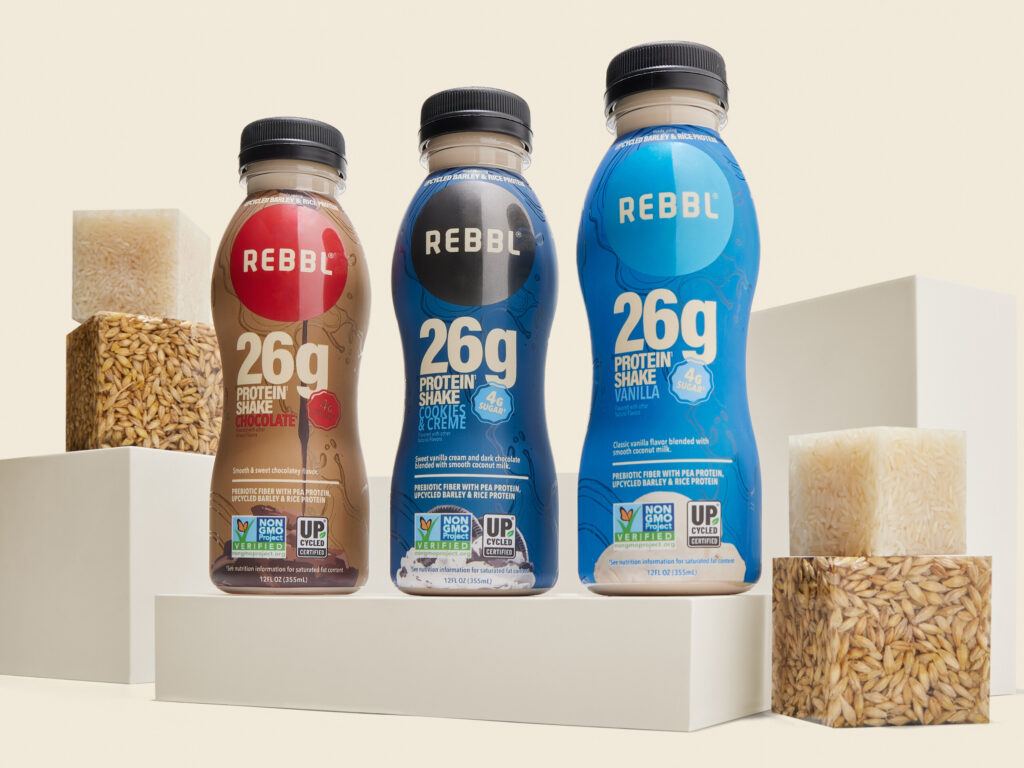
In more milkshake news, Californian functional beverage maker Rebbl has launched a line of vegan protein shakes with 26g of protein per bottle. They are powered by EverPro, an upcycled barley protein developed by AB InBev’s EverGrain, and come in chocolate, vanilla, and cookies and creme flavours.
Californian juicer manufacturer Nama has unveiled its M1 Plant-Based Milk Maker, which can produce “barista-quality milk” in under two minutes, alongside infused oils, soups and flavoured waters. It’s available in North America for $400.

On the opposite coast, New York-based Edenesque has introduced its debut line of “chef-crafted” milk alternatives, featuring unsweetened and barista oat milks, and a barista pistachio-cashew milk.
Also in New York, Elmhurst 1925 has released a limited-edition OatNog for the holiday season, made from a base of oats and cashews.

Another US alt-dairy launch comes from Danone-owned Silk, which has rolled out an oat milk for kids aged five and over with 8g of protein per serving, alongside DHA omega-3, choline, and prebiotics.
In Italy, vegan cheesemaker Dreamfarm has expanded its lineup with a new almond and cashew ricotta, which is currently available exclusively at Esselunga ahead of an EU-wide launch.

And Australian firm Pectin 360 has teamed up with The Original Juice Company to transform food waste into pectin and fibre. The two will set up a pilot plant with an undisclosed research and commercialisation entity, with the aim of saving over 10,000 tonnes of citrus peels and apple pomace waste annually.
In Canada, Modern Plant-Based Foods has acquired vegan pet food startup AnimalKind, marking its expansion beyond human food products.
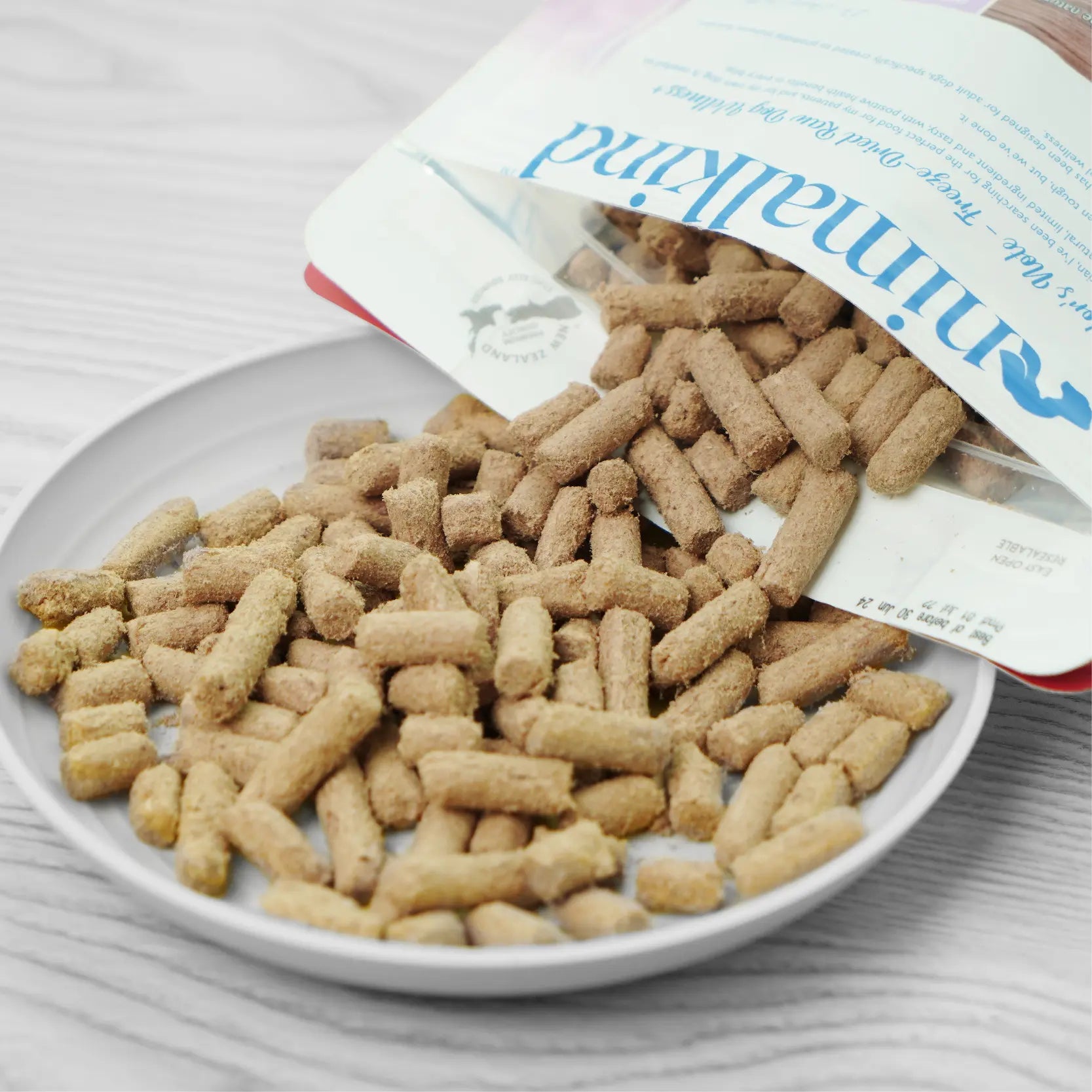
French firm C&DAC has brought in €1.6M ($1.7M) from Yeast, ILP Group, and Alsace Business Angels to speed up the development of its fermented legume-based flour for the plant-based industry.
Polish food waste platform Foodsi, which allows restaurants and stores to sell discounted surplus food, has raised €1.2M ($1.3M) in a seed extension, taking its round’s total value to €2.5M ($2.7M).
US biomanufacturing firm Liberation Labs has secured a $3.5M investment to support the ongoing construction of its large-scale precision fermentation facility in Richmond, Indiana. It comes ahead of its Series A round, which is expected to close at $37.5M.

Also in the precision fermentation realm, Chicago’s Hydrosome Labs – whose H2O technology can double yields and decrease production time by up to 25% – has bagged $3.7M to scale up operations to improve nutrient uptake in skincare and provide enhanced hydration in performance drinks.
German dairy giant Hochland, which has been around for almost 100 years, has joined Food Fermentation Europe, a coalition of companies aiming to advance regulatory approvals of novel fermentation-derived proteins.
In sadder news, molecular farming startup Tiamat Sciences has announced that it ceased operations a few months ago, a decision it attributed to “financial constraints”. As of last year, it had raised $5M in total funding.

Dutch cultivated pork startup Meatable, Chilean biotech firm Sticta Biologicals, and the University of Chile‘s Center for Mathematical Modeling have been awarded a research grant by the Good Food Institute to develop a precise and genome-scale metabolic model of porcine cells.
Finnish state investor Business Finland has granted €10M ($10.8M) in R&D funding to FoodID and FinBioFAB for projects to create alternative proteins and materials, which have been accepted into the Global Centers research programme led by the US National Science Foundation. Participating collaborators include Onego Bio, Enifer, Fazer, MeEat, and others.
The US Department of Agriculture has announced $1.5B in grants for 92 partnership projects to advance nature conservation and climate-smart agriculture, as part of the Inflation Reduction Act and the Farm Bill.

Hong Kong-based alt-dairy giant Vitasoy has agreed to be a shirt sponsor for A-League club Melbourne City FC. The brand’s logo will appear on the men’s team’s training shirt and shorts for the 2024-25 season, alongside LED signage at AAMI Park.
Alternative protein advocacy group ProVeg International has opened an outpost in Brazil, its first office in South America. It comes months after it set up an office in Portugal.
New York startup Pureture, which has been working on a vegan casein alternative, has developed a yeast-based protein with a complete amino acid profile to match the muscle recovery and growth attributes of casein and whey.

The China National Center for Food Safety Risk Assessment has released new safety assessment materials for GMOs used in food processing trials, a regulatory step that can help commercialise precision-fermented foods in the country.
Further progress for precision fermentation comes from the Netherlands, whose House of Representatives has voted in favour of allowing public tastings of foods made from this technology. The agriculture ministry will now consult with stakeholders on the motion’s contents.

Researchers in the US have created a prototype of cultivated pork grown on a new scaffold: kafirin proteins isolated from red sorghum grain.
The City of West Hollywood, California has unanimously voted to endorse the Plant Based Treaty, calling on the federal administration and other national governments to negotiate a Global Plant Based Treaty.

PETA UK has announced the winners of its Vegan Food Awards 2024, with La Fauxmagerie, Oato, Strong Roots, One Planet Pizza, and Lurpak among those receiving honours.
Yelp, meanwhile, has published its list of the best 100 vegan restaurants in the US, based on user reviews. Lil’ Vegerie in Redondo Beach, California bagged the top spot.
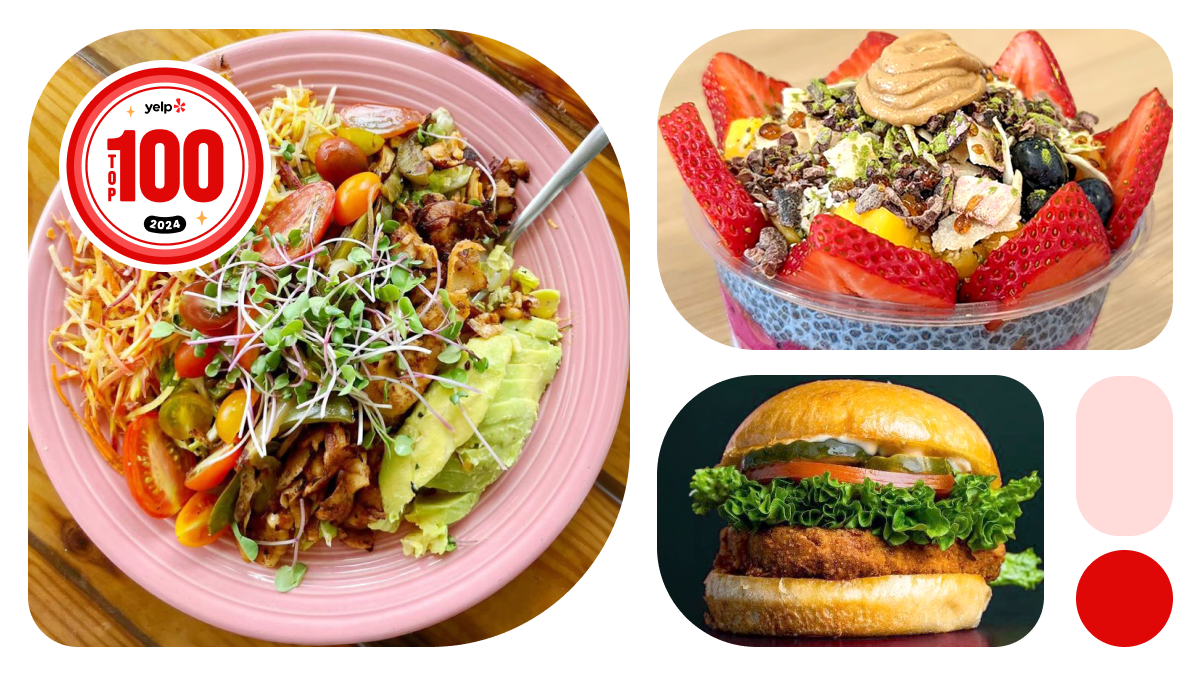
Finally, cultivated seafood has made it to Japanese TV, with actor Keita Machida explaining the concept on featuring on an episode of Manga Artist Ienaga’s Complex Society Redefined.
Check out last week’s Future Food Quick Bites.
The post Future Food Quick Bites: Yelp’s Best Vegan Restaurants, Alt-Milk Launches & Fermentation Wins appeared first on Green Queen.
This post was originally published on Green Queen.

If British universities transitioned to a fully vegan catering menu, they could save up to £1.5M annually and lower emissions by 80%, with meals using up a third of the water and nearly 90% less land.
This is because plant-based meals are 30% cheaper than meat and 21% cheaper than vegetarian dishes, while emitting 84% fewer greenhouse gases compared to meat-rich options, according to analysis by UK consultancy Bryant Research.
The firm compiled the climate impact data, wholesale price, and portion sizes of 140 different ingredients to estimate the environmental footprint and food procurement costs for a range of meals at universities.
“Our model found that plant-based meals are consistently the most sustainable across various environmental measures, compared to vegetarian and meat-based meals. Crucially, we also found that a plant-based transition provides an opportunity for caterers to reduce their food procurement costs,” Bryant Research director Chris Bryant and political researcher Billy Nicholles said in a joint statement.
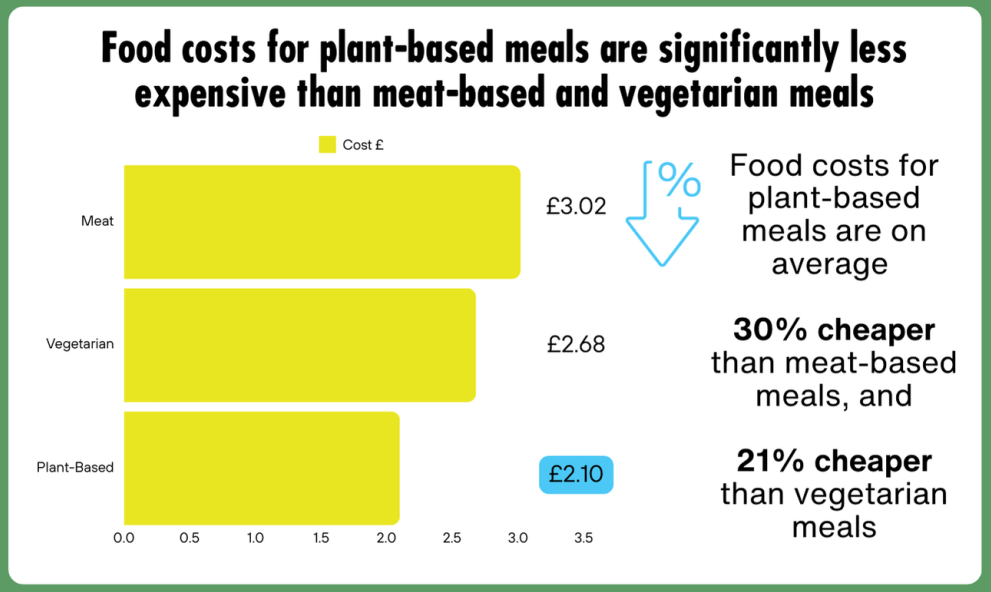
The average costs and environmental footprints were calculated based on three weeks of sample menus, with one plant-based, vegetarian and meat-based meal each day, totalling 45 meals. The researchers found that the average price of a meat-rich dish was £3.02, versus £2.68 for vegetarian meals, and £2.10 for plant-based.
“All environmental measures demonstrated a clear and consistent trend: the plant-based meals performed better compared to meat-based and vegetarian meals, often by a significant margin,” the authors wrote.
In every example, vegan meals were associated with the lowest emissions. Even vegetarian meals generated three times as many emissions (1.5kg CO2e on average) as vegan options (0.5kg CO2e). Meat-based dishes were linked with 3.2kg of CO2e on average. For example, a beef lasagna with cheesy garlic bread, fries and a side salad emitted 11.4kg of CO2e, much higher than what a chestnut and oyster mushroom kebab with chips, pickled onions and chillies generated (0.5kg CO2e).
Similarly, plant-based fare used 69% less water (115 litres) than meat-heavy dishes (370 litres). But unlike other metrics, vegetarian dishes weren’t far away from the water footprint of meaty ones (350 litres). This is because dairy – and cheese, in particular – demand high volumes of water.
The greatest difference between vegan food and meat comes with land use. The average amount of land used to produce a meat-based meal is 12.3 cubic metres, versus 1.2 cubic metres for plant-based dishes – this means the former uses over 10 times as much land as the latter. Vegan lunches also need 73% less land than vegetarian ones.
This echoes other studies that show the outsized environmental impact of meat production. Livestock farming makes up 57% of agricultural emissions, while using up 80% of all farmland and 30% of the world’s freshwater supply – all while providing just 18% of the world’s calories and 38% of its protein.
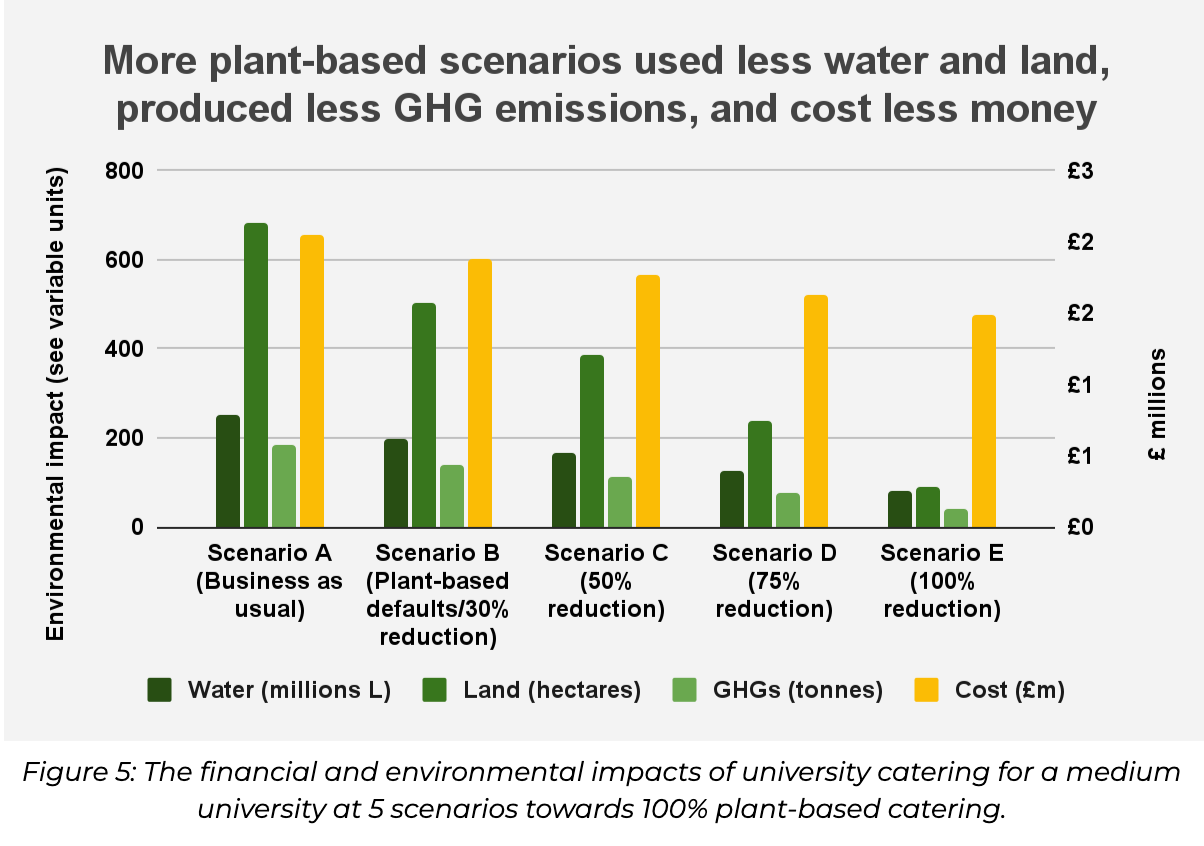
The report worked out the total savings different-sized universities can make across five scenarios, ranging from business as usual to a transition towards a 100% plant-based menu.
These institutions can cut food procurement costs by 27% and reduce emissions by 79% if they transition to a fully vegan catering menu. The associated water consumption would also be decreased by 67%, while land use would be down by 87%.
A small university of 5,000 students could therefore save around £280,000 per year, which rises to £50,000 for a medium-sized institute of 10,000 students. For larger universities (up to 25,000 people), this would amount to £1.4M in budgetary savings.
To bring about these changes and reap their benefits, Bryant Reserach has outlined four recommendations for universities. First, they should publicly commit to a phased shift to a 100% plant-based menu by 2030, setting clear annual targets for increasing the proportion of such meals.
Then, they should engage and educate stakeholders, from Students’ Union leaders and prospective and current students to catering managers, commercial directors, chefs, and sustainability managers. The menu options they decide on should be “diverse, nutritious and appealing as well as environmentally and financially advantageous”.
The report also encourages them to implement a plant-based by default approach, which involves offering vegan dishes as the main choice, with meaty meals available if diners ask for them. This choice architecture strategy can normalise plant-based eating and is relatively easy to implement.
Finally, universities should utilise support services to increase the plant protein ratio, like Humane Society International’s Forward Food programme, which has already supported over 30 universities with hands-on culinary training, evidence-backed menu formulation strategies, and bespoke food sustainability reports.
Caterers like Sodexo and Compass Group have both pledged to reduce meat and dairy in favour of vegan meals to meet their climate commitments. And last year, over 650 academics and campaigners penned an open letter to UK universities demanding a switch to 100% vegan catering menus, comparing the shift to fossil fuel divestment commitments by 101 institutes in the country.
So far, the students’ unions of the University of Stirling, Birmingham University, Queen Mary University, London Metropolitan University, Kent University, Cambridge University, and Newcastle University, among others have all voted to introduce 100% plant-based menus.
The post If Universities Went Vegan, They Could Save As Much As £1.4M in Catering Costs & Cut Emissions by 80% appeared first on Green Queen.
This post was originally published on Green Queen.

Mr Charlie’s Told Me So, home of the McDonald’s-spoofing vegan Frowny Meal, has received a “strategic investment” from Carma HoldCo, the parent company of several brands from cultural icons.
The plant-based fast-food chain, which has locations both in Los Angeles and in San Francisco stateside, as well as in Sydney, Australia, is now eyeing expansion both domestically and internationally via a franchise model.
This will be facilitated by the investment from Carma HoldCo, whose portfolio brands specialise in the cannabis and wellness sector. These include Tyson 2.0, founded by boxing legend Mike Tyson; Ric Flair Drip and Wooooo Energy from wrestling icon Ric Flair; and Evol by the rapper Future.
“Mr. Charlie’s is a natural choice for Carma Holdco, as we diversify into the food industry. I very much believe in the healthy benefits of a vegan diet and was a strict vegan for many years,” said Tyson. “I’m proud to align myself with partners bringing healthy alternatives that taste good to the fast food space.”
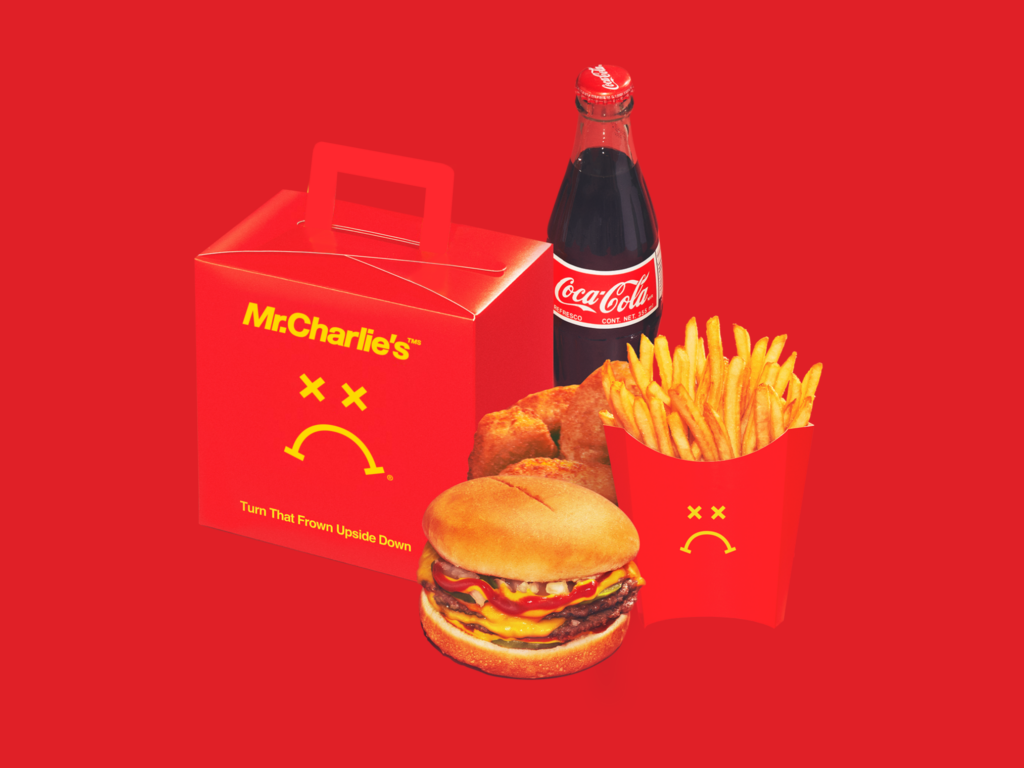
Established in 2020, Mr Charlie’s gained popularity on TikTok, where users dubbed it the “vegan McDonald’s”, thanks to its menu and branding.
Instead of a Happy Meal, diners can choose the Frowny Meal, which includes an Impossible Burger or TiNDLE chicken patty, TiNDLE nuggets, fries, and a choice of drink.
The beef burger menu features Not A Hamburger, Not A Cheeseburger, Mr Chuck, and the recently launched Mr Royale with Cheese (among others), alongside Mr Sunday and Not A Chicken Sandwich as the chicken options. Aside from the latter, all feature vegan cheese. In addition, it has a breakfast menu comprising Mr Muffin – a take on the iconic McMuffin with vegan egg, cheese and mayo – and Mr Muffin Deluxe (which adds a TiNDLE sausage to the mix), as well as tater tots.
The red and yellow packaging is paired with a parody of the famous Golden Arches, with each box featuring a sad face and crossed eyes to feign an ‘unhappy’ brand aesthetic, complemented with the tagline: “Turn that frown upside down.”
But behind the tongue-in-cheek messaging, there’s a serious community-focused mission underscoring the business. Founders Aaron Haxton and Taylor McKinnon have been committed to providing second chances to employees from underprivileged backgrounds, including those overcoming addiction or homelessness.
Mr Charlie’s has previously partnered with the Dream Center, a non-profit that helps homeless and formerly incarcerated people find accommodation and employment. For its Los Angeles eatery, the restaurant chain has hired around 60 workers from the organisation, which helped McKinnon through a dark time once too.
It pays employees above minimum wage, with management-level staff receiving a $300 credit card allowance to build up a credit score. The chain aims to create more jobs through similar collaborations with community organisations as it expands.
“Mr Charlie’s mission to help and hire those from the homeless community is something that I am truly passionate about, and I look forward to helping many people and communities with the expansion of Mr Charlie’s across the globe,” said Tyson, who is vegan and whose wife heads a homeless shelter in Los Angeles to help victims of domestic violence find work.

Mr Charlie’s says it has several locations lined up in the US, and wants to use the investment to rapidly grow its footprint. To do so, it has developed a franchise model targeting area developers and master franchisees in large US territories, with plans in place for international expansion.
It has leveraged its partnerships with data-driven delivery platforms like Uber Eats and Postmates to use robust market data to pinpoint ideal locations for franchise expansion. This would allow for faster rollouts of new branches, and more effective penetration of local markets.
“This isn’t just an investment in a plant-based food concept – it’s a smart business decision,” said Carma HoldCo CEO Adam Wilks, who has previously worked at Cold Stone Creamery, Pink Berry, Buy N Bulk, and more. “The QSR space is ripe for innovation, and Mr Charlie’s combination of bold brand identity, crave-worthy menu, and scalable business model makes it a compelling opportunity for franchisees. We’re excited to help bring this innovative brand to more markets.”
In a joint statement, McKinnon and Haxton said Mr Charlie’s would be helped by Carma HoldCo’s experience in building disruptive brands. “Both Carma and Mr Charlie’s are about creating meaningful change – whether it’s providing second chances to our employees or delivering plant-based food in a fun and novel way,” they noted.
The investment comes at a time when plant-based and quick-service restaurants have been struggling. Kevin Hart’s fast-casual chain Hart House suddenly closed all its locations last month, joining a trove of other plant-forward Los Angeles eateries that have shut their doors in the past year, such as Vegan Drip Burger, Shojin, Nic’s on Beverly, Flore Vegan, Jewel, and Matthew Kenney’s VEG’D and Plant Food & Wine.
In fact, the Los Angeles Times reported that at least 65 well-known restaurants closed in the city last year, with high inflation rates prompting consumers to spend less on dining out – a recent survey showed that American families spend 10% less of their eating-out budgets than they did in 2022.
Restaurants themselves are also facing thin margins on top of high labour and ever-increasing ingredient costs. In 2023, pound sales of meat analogues dipped by 8% in the US foodservice sector, versus a 4% drop for conventional meat, according to Circana data cited by the Good Food Institute.
Whether they’re backed by celebrities or otherwise, restaurants – especially plant-based ones – face an uphill challenge in the current landscape. Mr Charlie’s would do well to turn the frown upside down.
The post Mr Charlie’s: Mike Tyson, Ric Flair Invest in ‘Vegan McDonald’s’ to Fuel Expansion appeared first on Green Queen.
This post was originally published on Green Queen.
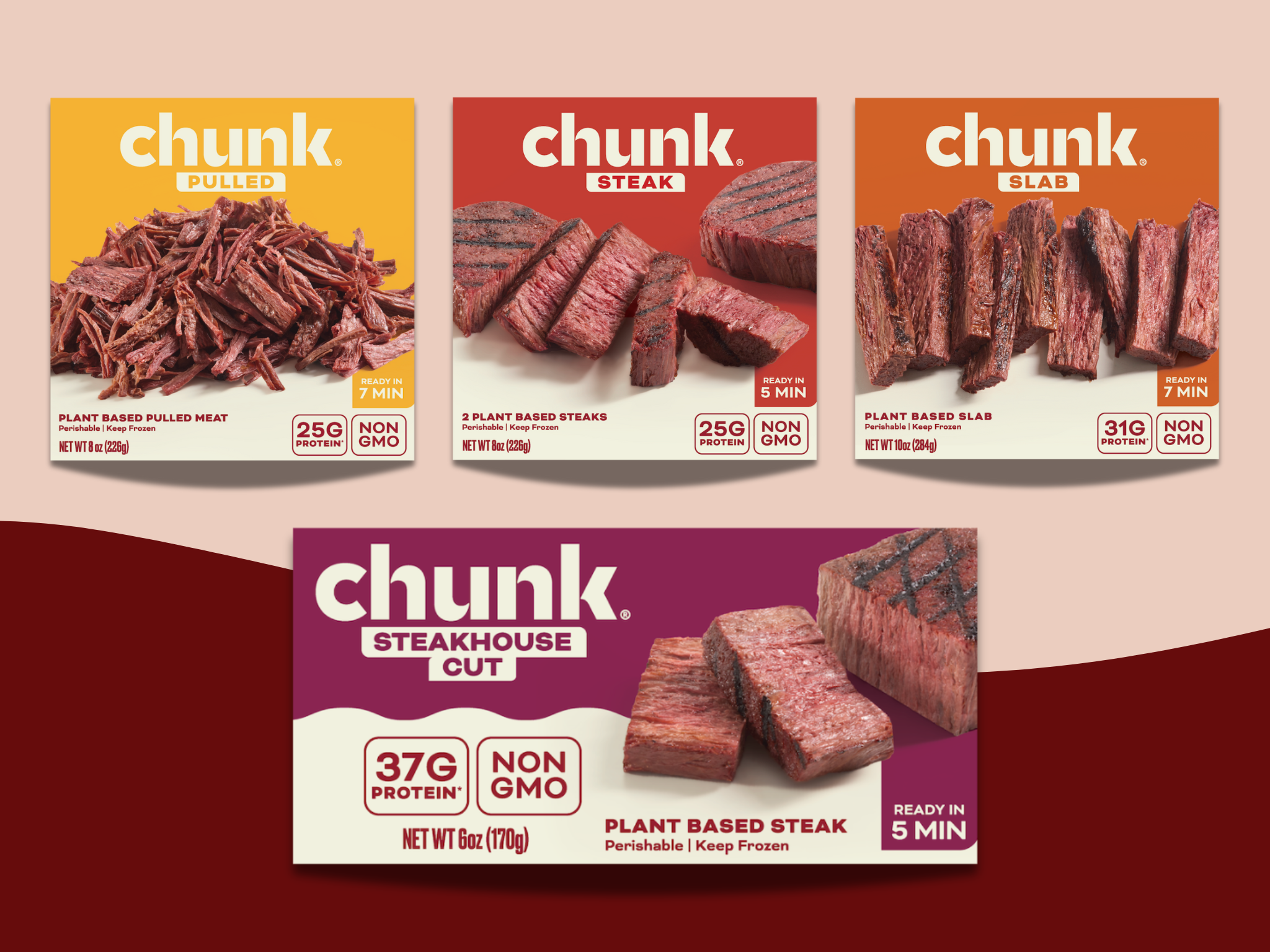
Chunk Foods, which makes plant-based steak products that replicate the whole muscle structure of beef, is making its retail debut in the US.
It is introducing four cuts of its vegan steak that lean into consumer demand for high-protein and clean-label options, containing eight ingredients (plus fortifications) and up to 37g of protein per serving.
“We are focusing on local and independent grocers in Los Angeles and New York City as part of our initial retail strategy,” founder and CEO Amos Golan tells Green Queen.
“These retailers align with our goal of engaging with communities that are passionate about high-quality, plant-based options. E-commerce will follow in late November, with plans to expand to national retailers in 2025.”
Asked what supermarkets could stock the steak SKUs next year, he says: “We are currently in discussions with Whole Foods, Sprouts, Wegmans, HEB, and several other national retailers.”

Golan founded the startup in 2020, targeting what many have described as the “holy grail” of meat analogues: whole-muscle cuts.
Chunk Foods’s USP lies in its solid-state fermentation tech, through which it creates its cultured soy protein base for the steaks (made from defatted soy flour, soy protein isolate, and wheat gluten.
The startup took a foodservice-first approach for its initial launch, appearing on the menus of New York establishments like Coletta, Anixi, The Butcher’s Daughter, Leonardo DiCaprio-backed chain Neat, and Pastrami Queen.
It has also established a partnership with the Florida-based restaurant group Talk of the Town, having launched into Charley’s Steak House in Orlando last year. Last December, it headlined a culinary experience at Art Basel Miami Beach, as part of a Philly cheesesteak.
Chunk Steak is in Philadelphia too, appearing in a short rib ragu at Monster Vegan. And it has an ongoing partnership with popular fast-food chain Slutty Vegan and its sister establishment Bar Vegan.
These collaborations have proved to be a testament to the whole-cut steak’s pedigree, which won the Plant Based Meat Product of the Year honour at the 2023 AgTech Breakthrough Awards.
Among the products being launched in retail are 4oz fillets ($8.99 for a two-pack) and a pulled format ($7.99 per 8oz pack), both of which contain 25g of protein per serving. There’s also a steakhouse cut ($9.99 per 6oz), which delivers a whopping 37g of protein, and a 10oz slab with 31g of protein ($12.99).
The prices of these products are on the higher side, at a time when inflation continues to squeeze consumer budgets and price becomes an increasingly important purchase driver.
“We are confident in our value proposition,” says Golan. “While price is undoubtedly a critical factor for consumers today, we believe that offering delicious, whole-cut plant-based alternatives that deliver on taste and texture will resonate with shoppers seeking quality and convenience in their food choices.”
He adds: “We’ve been mindful in positioning our pricing to remain competitive within the plant-based category and traditional beef products.”

Chunk Foods’s move into retail comes during a sustained decline in sales of meat analogues. In 2023, these products suffered from a 12% drop in revenue compared to the year before. And this year, too, sales were down by 9% in the year ending July 2024.
So for any meat alternative brand to enter the grocery sector right now is a bit of a risk. “Despite the broader market challenges, there is still strong demand for high-quality, healthy, and delicious plant-based products,” argues Golan.
“We’ve received significant interest from consumers and retailers alike, which has been a driving factor in our decision to enter the retail space,” he adds. “Our clean-label, high-protein whole-cuts offer a unique edge in the market, and we believe the timing is right to bring something new and exciting to the retail landscape.”
Asked how companies in the space can turn things around, he believes delivering on consumers’ expectations for taste, texture and nutrition is critical. The industry needs to focus on making plant-based foods more approachable and satisfying, and that’s exactly what we’re doing at Chunk Foods,” he suggests.
“Continued education about nutritious plant-based options, clearer product differentiation, and better storytelling about the benefits of our clean label products will help reinvigorate the category.”
Last year, Chunk Foods completed the construction of what it says is one of the world’s largest factories of its kind. It has also teamed up with plant protein company Better Balance to create new whole-cut meat analogues for the Mexican market.
And to date, it has raised $24M in funding (including a $7.5M round earlier this year). Golan confirms that the business is well-capitalised for now, so it isn’t actively fundraising. “Over the next year, we’re focused on our retail expansion,” he says of the company’s immediate plans. (It is also working on pork, lamb and poultry alternatives.)
“Additionally, we’ll continue to grow our presence in foodservice, with new partnerships and menu innovations,” he continues. “There’s also a lot of excitement around an e-commerce partnership, which will launch by late November, allowing us to reach more consumers directly.”
The post Chunk Foods Brings Whole-Cut Steak to US Supermarkets appeared first on Green Queen.
This post was originally published on Green Queen.
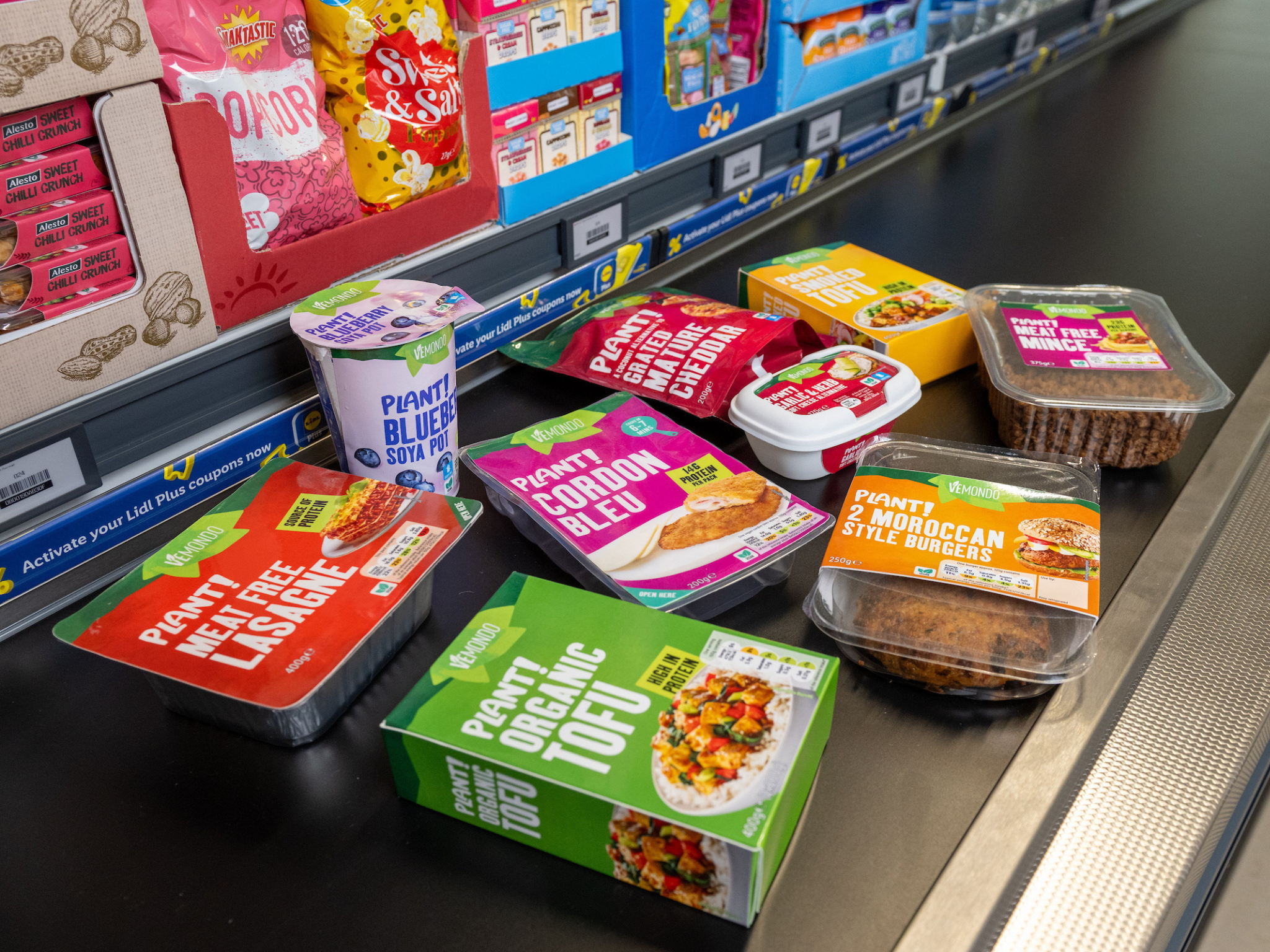
There have been a few too many doomsday-like headlines about the plant-based world in recent months, adding to a divisive narrative that the industry’s best days were behind it.
The reality is, in the US, all but four categories in the vegan sector saw sales plummet last year. And in Europe, retail sales of meat and dairy analogues collectively increased in 2023 compared to the previous year.
This is according to analysis of previously unpublished Circana data by the Good Food Institute (GFI) Europe, which found that in are athe six largest European economies – Germany, the UK, France, Italy, Spain, and the Netherlands – the sales value of plant-based food rose by 5.5% in 2023, reaching €5.4B. At the same time, the volume of sales measured by weight also grew by 3.5%.
“Europe’s plant-based sector has continued to make headway despite a difficult few years for the wider food industry,” said Helen Breewood, research and resource manager at GFI Europe.
“Plant-based meat and dairy are becoming mainstream options in many European countries, emerging plant-based categories are growing, and some products are beginning to compete with their animal-based counterparts on price.”
Here are our five major takeaways from GFI Europe’s analysis of vegan food sales in Europe.
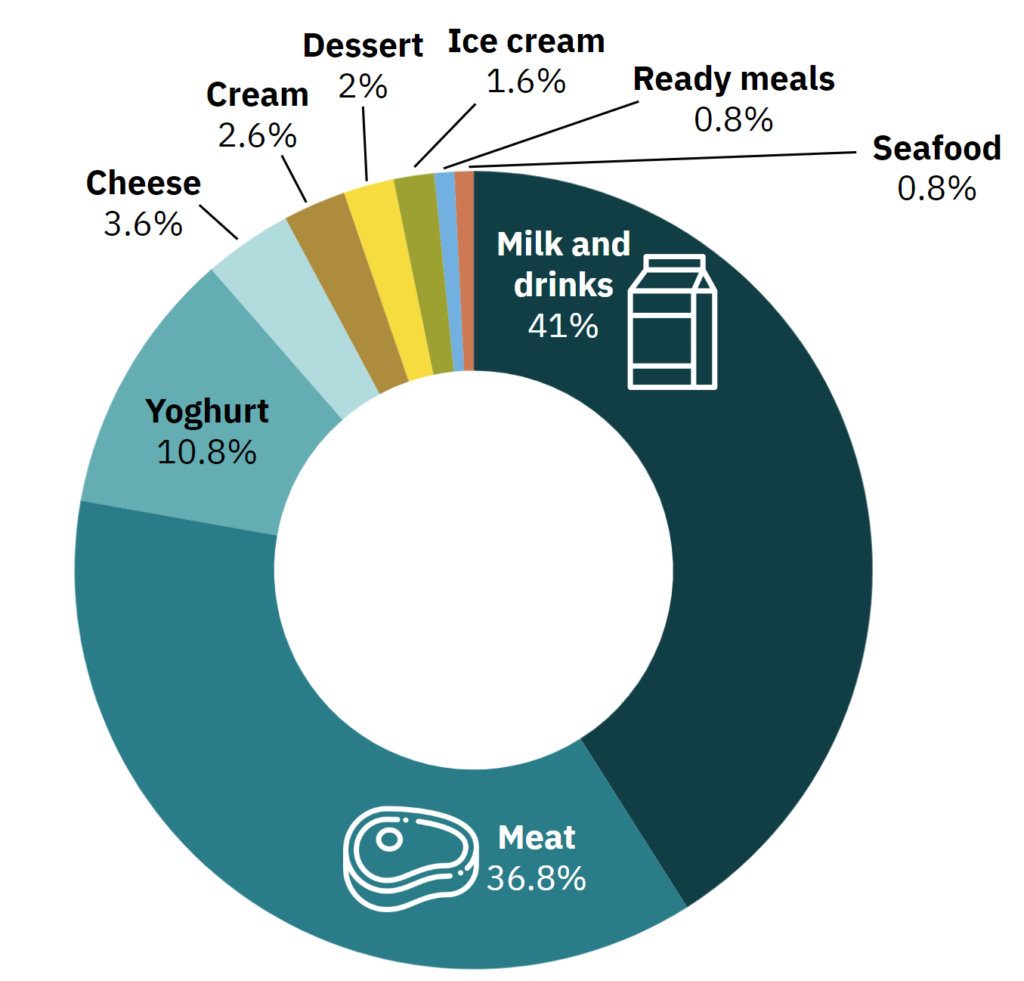
Like the rest of the world, plant-based milk has remained the largest category in Europe, accounting for 41% of all sales in 2023. This was facilitated by a 7% hike in sales value, reaching €2.2B. Unit sales also grew by 4.7%, and product volumes were up by 5.2%.
Germany is the largest plant-based milk market, netting €805M in sales value (a 37% share). This is explained by the shrinking price gap between milk alternatives and conventional dairy, which was down from 35% in 2021 to just 3% in 2023. If the VAT on the former (19%) was the same as the latter (7%), price parity would have already been achieved.
Meat analogues are second on the list with a 37% share of Europe’s vegan sales. Between 2022 and 2023, the sales value of these products was up by 3.2%, reaching €2B, while units were steady and volumes declined.
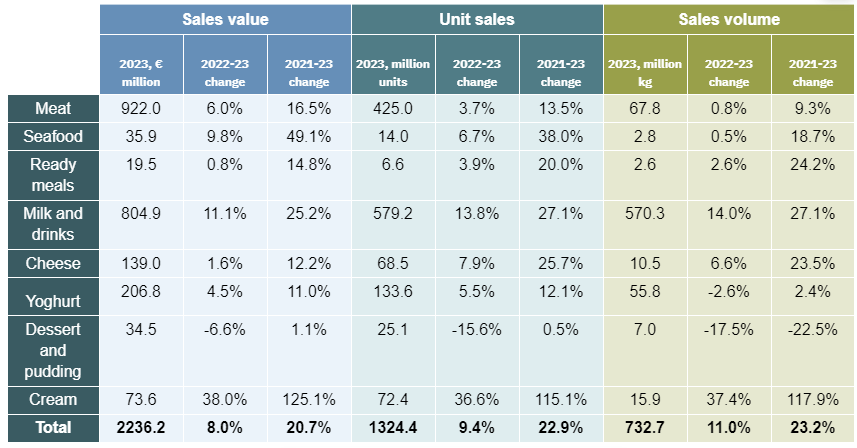
The land of bratwurst was already the largest in Europe, and it continued to dominate, taking up 40% of the market (€2.2B) among the countries analysed.
Despite being the most profitable nation for plant-based milk producers, Germany bucks the continental trend by selling more meat analogues than alt-dairy. This is because it is also the largest market for meat-free products, accounting for nearly half (46%) of all sales.
The number of households these products are reaching is also rising steadily, if gradually – plant-based milk penetrated 37.4% of households last year (versus 33.8% in 2021), and milk alternatives were bought by 36.5% (up from 36.3% two years prior).
The UK is next on the list in terms of market size, with sales reaching €942M. It was followed by France (€648M), Italy (€641M), Netherlands (€452M) and Spain (€309M).
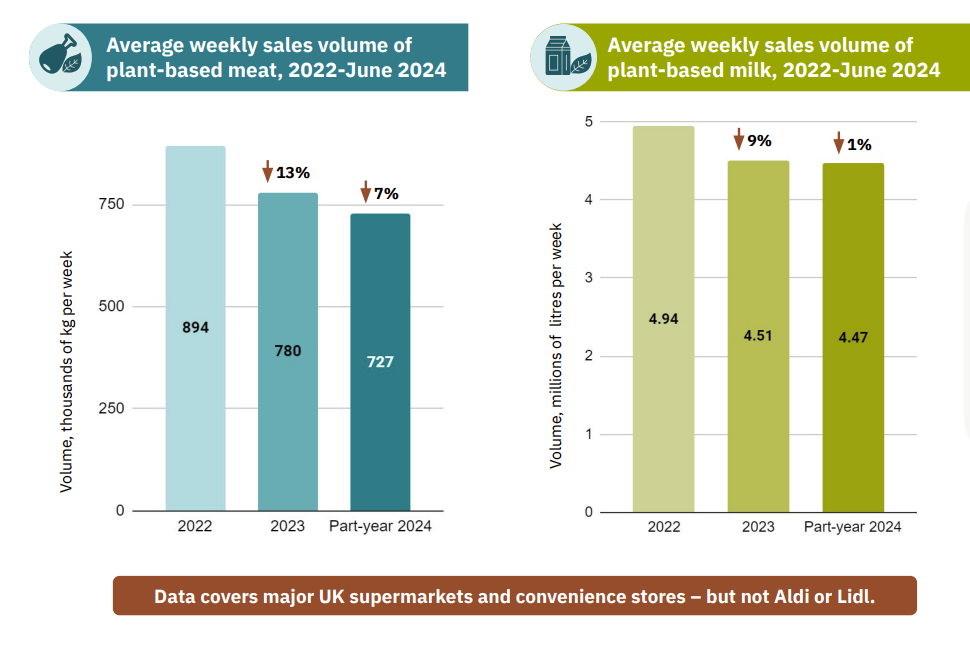
In only two markets did plant-based products perform worse in 2023 than the year before: the UK and the Netherlands. The former saw sales decline by 2.8% (with a larger 10% drop in volume), while in the latter, volume sales were down by 5%, with units dipping by 1%.
However, there are signs that this slowdown started to level off in 2023 and the early months of this year. For starters, the sales value of plant-based products in the Netherlands actually grew by 1%, and volumes have shown a slight rebound after two years of decline.
In the UK, weekly unit sales of meat analogues fell by 7% in early 2024, compared to a 12% decrease last year. And plant-based milk experienced a 1% decline in unit sales per week this year, versus 9% in 2023. And just this week, discount retailer Lidl announced it is tripling its own-label plant-based offering after seeing demand grow by 12% last year.
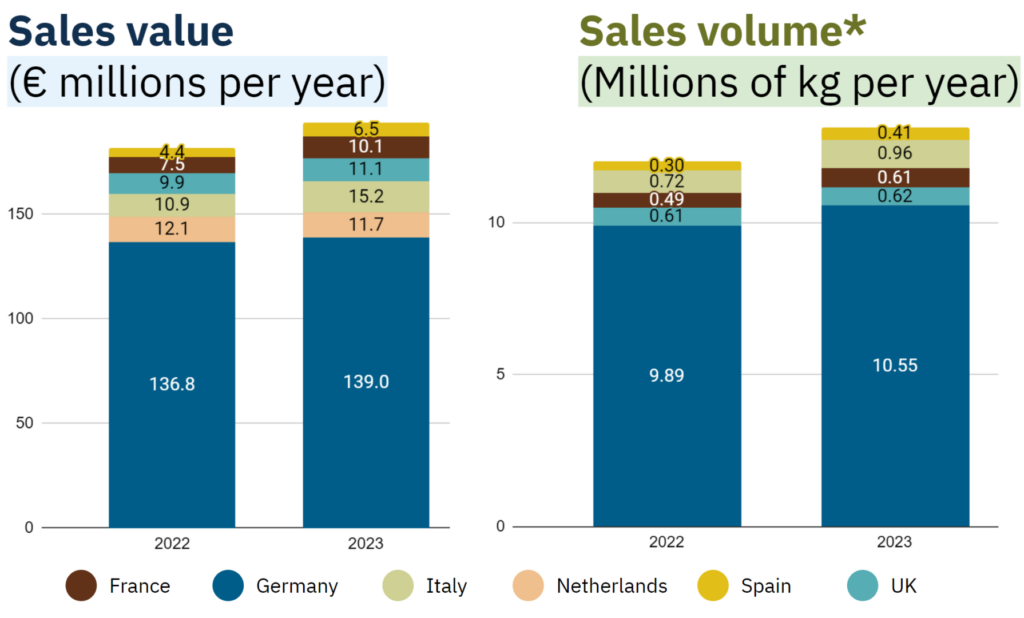
Two categories that shone last year were cream and cheese alternatives. Vegan cheese, taking up 3.6% of the total share, was the fastest-growing product in Spain, France and Italy, and plant-based cream (comprising 2.6% of the market) experienced the quickest growth in Germany, the Netherlands, and the UK.
The latter made 24% more money in 2023, representing the highest sales hike of any category, albeit being a much smaller category than vegan milk, meat, and yoghurt.
On the other hand, plant-based desserts (-3%), non-dairy ice cream (-8%), and vegan ready meals (-10% in France, Germany and the UK) have witnessed drop-offs, which GFI Europe ascribed to cost-of-living pressures that led shoppers to cut back on non-essential and convenience items.

A major finding of the analysis was that with certain products and in certain markets, the price gap between animal proteins and their vegan versions has closed – and this has been associated with better sales.
For example, branded dairy-free creams are cheaper than their conventional counterparts in Germany and the UK, spurring a 23% sales hike in the latter. In fact, private-label plant-based milk costs an average of €1.12 per litre, 13% cheaper than own-label dairy milk (€1.30).
Likewise, higher prices mean middling sales. With volume sales of plant-based meat down, manufacturers need to develop products that meet consumer expectations on both taste and price.
So finding ways to lower prices is key to the success of plant-based meat and dairy in Europe. “Our analysis finds that lower prices and higher quality can power the growth of these more sustainable options, so policymakers and manufacturers should continue to invest in innovation and infrastructure to develop tastier, more affordable products capable of building a diversified, resilient and healthy European food system,” said Breewood.
The post In Europe, Sales of Plant-Based Meat & Dairy Grew by 6% – But Price Parity Holds the Key appeared first on Green Queen.
This post was originally published on Green Queen.

As it makes inroads on its precision-fermented honey, San Francisco-based MeliBio has obtained fresh capital to scale up the distribution of its plant-based sweetener, Mellody.
The “strategic investment” from Future Food Fund by Oisix, a food tech investor from Japan, is part of MeliBio’s pre-Series A financing round. It means the company has raised around $10M in total funding since it was established in 2020, co-founder and CEO Darko Mandich tells Green Queen.
MeliBio was initially planning a Series A round this year – as revealed by Green Queen – which was expected to bring in a further $10M. But the challenges of the food tech market, where investment dropped by 61% last year, made it difficult to do so. “We shifted to [the] pre-Series A round, and will reopen Series A next year,” says Mandich.
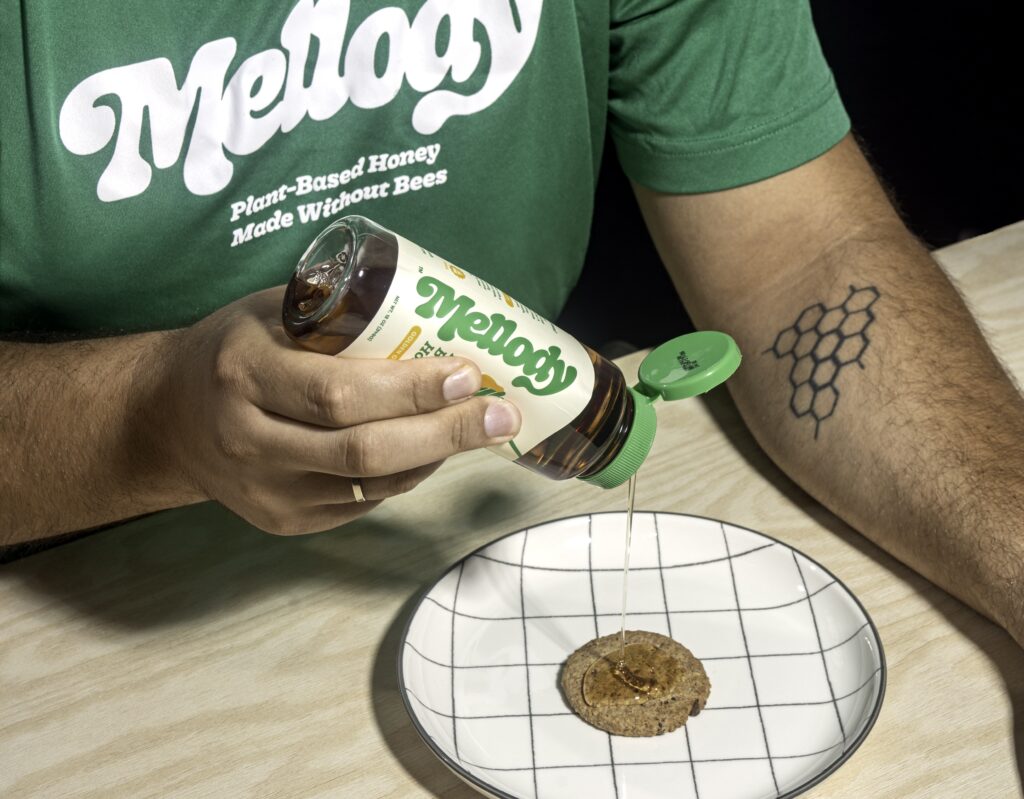
The startup initially launched Mellody through foodservice partners, before debuting the product in the D2C channel via a partnership with famed New York eatery Eleven Madison Park’s online store.
Since then, the product has been introduced across the US (alongside a new hot honey variety), available at independent retailers and a growing list of restaurants – recent partnerships include Palmetto Superfoods and Joyride Pizza in California and Moto Pizza in Seattle. Moreover, MeliBio has also expanded its distribution through KeHE, UNFI, Greco and Sons, and ACE Natural.
Unlike other vegan honey products, which make use of apples and lemons, elderflower, carob, or other ingredients, Mellody aims to replicate the honey through a combination of fructose and glucose, complemented by a range of plant extracts (red clover, jasmine, passionflower, chamomile, and seaberry), gluconic acid and natural flavours.
It aims to solve a key biodiversity problem. The demand for money has proliferated honey bee populations, and that has plunged wild bees into chaos. Many of the 20,000 wild bee species are endangered, and some are facing the threat of extinction, but they’re important pollinators (even better than honey bees) and protecting them is crucial for the survival of natural habitats.
This makes them a major cog in preserving the planet’s biodiversity and maintaining its ecosystem. But continued honey production spells grave trouble for these bees. And as for honey bees, their own ability to produce the sweetener itself has declined, thanks to widespread herbicide use, conversion of flower-rich land into monocultures, a drop in soil productivity, and climate change. It’s why plant-based and precision-fermented alternatives like MeliBio’s are needed.
The company, which can produce 10,000 lbs of Mellody per day, has also launched vegan honey in Europe through a partnership with Slovenia’s Narayan Foods. In the UK, this is in the form of Vegan H*ney under the Better Foodie, whereas it sells as Vegan Hanny or Ohney under Aldi’s private label, Just Veg. The $10M, four-year deal aims to put MeliBio’s vegan honey into 75,000 stores eventually. Additionally, it recently secured a patent win in Germany for its plant-based honey technology.

MeliBio began as a precision fermentation company, and that remains its core target in the long term. The technology combines the process of traditional fermentation with the latest biotech advancements to efficiently produce compounds like proteins, flavour molecules, vitamins, pigments, or fats.
It involves inserting a molecular sequence – derived from digitised databases rather than the relevant animals or plants – into microorganisms to give them instructions to produce the desired molecule when fermented. This enables companies like MeliBio to produce bioidentical versions of animal-derived products like honey.
While its plant-based products have been expanding, MeliBio has been working on the precision-fermented product in the background, and recently made some advancements. Aaron Schaller, the startup’s co-founder and CTO, recently announced that the team has taken three of its protein and enzyme targets from ideation to proof-of-concept to bioreactors, with a fourth soon to come.
And this week, he noted that MeliBio has increased the titer – the amount of product per unit volume at the end of the fermentation process – of its main enzyme target by 1,300%. “Taking our strains from the bench to bioreactors sent our strain productivity through the roof across only two runs,” he said. “With ample room to further optimise our bioprocess, future titer and yield improvement is imminent.”
This was a result of its collaboration with AI-led biomanufacturing startup Pow.Bio, with whom it has been engaging in scale-up efforts since March. The firm is now evaluating further biomanufacturing partners for the next phase of its precision-fermented honey.
“This investment from Future Food Fund is an exciting step forward for MeliBio. It aligns perfectly with our mission to not only transform the honey industry but also to make a measurable impact on biodiversity and the environment,” says Mandich.
“At Future Food Fund, we are excited to support MeliBio’s vision of giving bees a break while offering a new model for food production through their exceptional products,” adds Hiro Hasegawa, venture partner at the VC firm.
The post MeliBio Bags Pre-Series A Investment to Expand Bee-Free Mellody Honey appeared first on Green Queen.
This post was originally published on Green Queen.
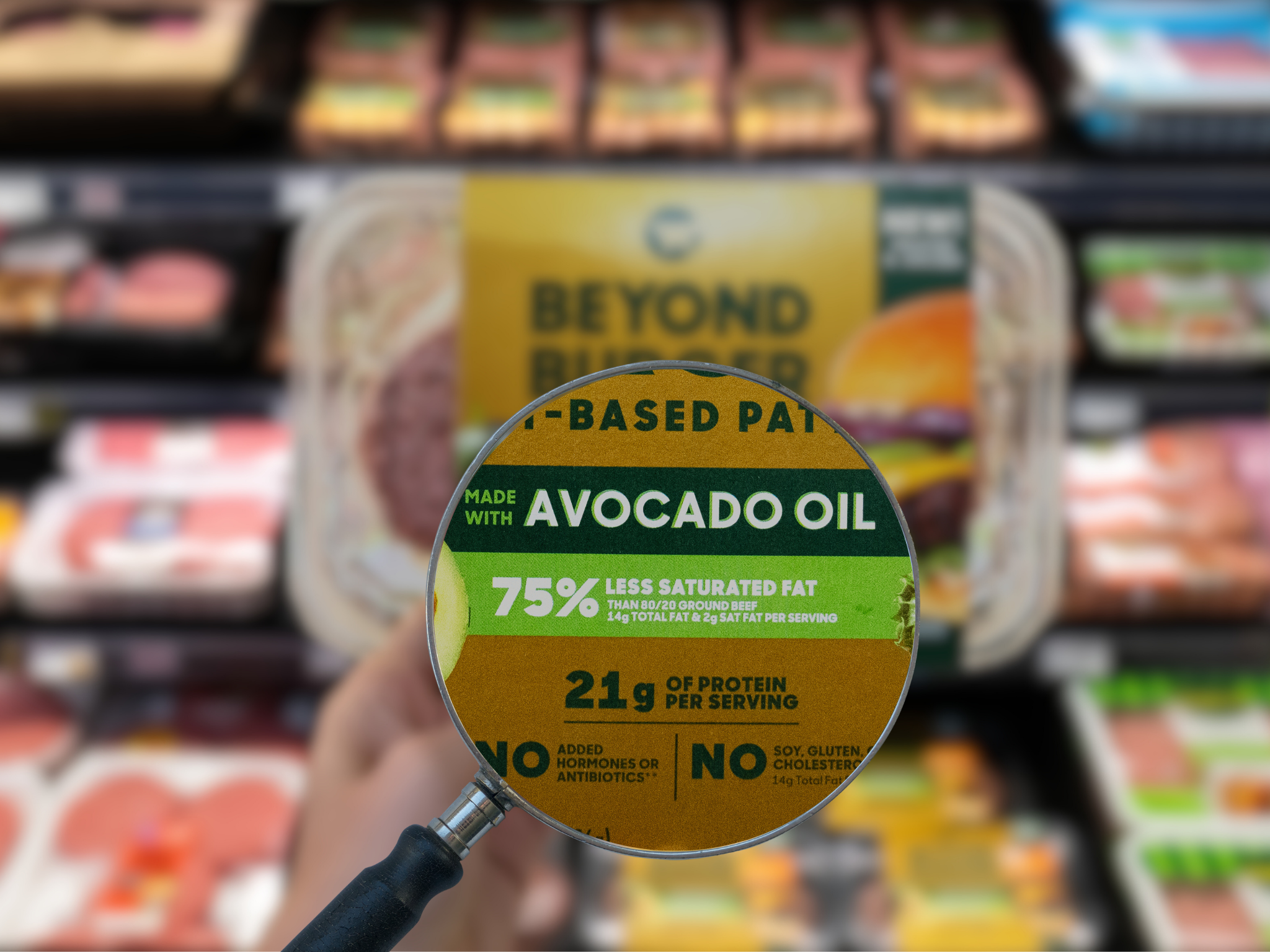
The health halo created by meat producers is fluttering. People are now actively moving away from animal proteins as they realise the burdens they put on the human body – after all, red and processed meat have been labelled carcinogens by the WHO, adding to their contribution to heart disease, diabetes and obesity risks.
Plant-based meat, of course, provides a viable alternative. And in the last year, there has been a notable shift in this industry’s marketing playbook. Climate change, the reason why most companies say they exist, is no longer the top message anymore. Now, it’s health first.
And this is an intentional effort. For Americans, health is now the top reason to shift from animal proteins to plant-based analogues. Despite their sales dwindling over the last couple of years, consumers remain interested in vegan meat products because they believe they are better for their personal health and don’t pose disease risks.
That said, there remains a large gap in purchase drivers and barriers – some households have decreased their consumption of plant-based meat due to their taste or texture and higher prices.
This is according to a new study by Kroger, the Plant Based Foods Institute (PBFI), and 84.51°, which revealed that flexitarians are gradually reducing their spending on animal proteins for the fourth year in a row. The Plant-Based Migration Analysis analysed the behaviour of over seven million US households in 2022-23 and carried out a survey this year to provide a blueprint for retailers to expand their vegan offering and drive the category’s growth.
“Despite economic challenges in the past few years, we continue to see that shoppers have remained engaged and interested in plant-based foods,” said Linette Kwon, data and consumer insights analyst at the Plant Based Foods Association, the site organisation of PBFI.
The research revealed that 48% of US shoppers think plant-based foods are healthier than animal proteins and 45% want to eat less meat and dairy due to personal health concerns, the latter sentiment representing a 7% rise since 2023. Meanwhile, 29% of Americans are also concerned about the presence of antibiotics and hormones in conventional meat.
Three in 10 respondents say they’re enthused by the greater availability of plant-based products, and their climate credentials. And 28% want to eat fewer animal proteins because of their rising costs – beef prices reached record highs last month. In fact, the number of consumers concerned about the price of meat has grown by 9% since last year.
On the other hand, a third of Americans (32%) have been buying fewer plant-based products because they don’t like how they taste, highlighting a key hurdle for manufacturers in the space. The same percentage of people moving away from animal proteins due to high costs are deterred from plant-based options for budgetary reasons (28%), a 12% rise from 2023.
While only 14% dislike the nutritional profile, 23% feel there are fewer vegan products in-store, and 16% were dismayed by the decreased amount of convenience options like ready meals. Meanwhile, 19% have trouble finding them in the store.
“Making plant-based foods more affordable, improving the taste/texture, offering greater variety and providing more nutritional benefits would make them more likely to purchase plant-based foods,” the report says.
Industry giants like Beyond Meat and Impossible Foods have been doubling down on their products’ health benefits, with revamped recipes and packaging, new health-forward products, certifications from health organisations, targeted marketing campaigns, and even online resources dedicated to fighting misinformation.
“It’s not necessarily that sustainability has become less important, but we have to meet our consumers where they are. Health is a major driver when it comes to purchasing plant-based food,” Sherene Jagla, chief demand officer at Impossible Foods, told Green Queen this week. “It’s important that we’re educating consumers about the nutritional value of our products so they can understand how it might fit into their lifestyles.”
In line with sales data, milk alternatives seem to be the most popular plant-based product. More than a third (37%) of Americans are drinking more alt-milk now, and in place of dairy. Around a quarter are doing the same with frozen meat analogues (26%), refrigerated vegan meat, yoghurt, and frozen meals (24% each).
The share is slightly lower for vegan cheese (18%)- it has jumped by 7% from last year. “Shoppers who are increasing their spend on plant-based milk, cheese, and fresh meat are actively decreasing their spend in corresponding animal-based categories,” the report states. “This indicates their dedication to making a switch to more plant-based foods.”
Julie Emmett, VP of marketplace development at PBFA, said the research showcases evidence of a protein transition for a variety of reasons: “Retailers can use this extensive research to develop merchandising and marketing strategies for long-term growth.”
In Europe, this shift is already in motion. Lidl and Ahold Delhaize are aiming to become the first supermarket groups to set sales goals in line with their climate ambitions by setting ‘protein split’ targets, which involve increasing the share of plant-based food sales while decreasing animal protein sales. The WWF last week published a methodology for retailers to measure protein sales, urging them to make 74% of all food sold plant-based.
The PBFI report recommends manufacturers and retailers optimise pricing and promotion strategies to make plant-based foods more affordable to a wider group of consumers and improve the taste and texture of products while offering unique items and cleaner labels.
They also write that making vegan food easy to find in-store and online is critical, and can be helped by digital and in-store signage. In addition, the report says companies should provide recipe inspiration and education about the health benefits of these products to pique consumer interest.
These measures are important when you consider the continued struggles of plant-based meat, whose sales fell by 12% in 2023, according to SPINS data crunched by the Good Food Institute. This decline has not been stemmed, with meat alternatives down by 9% in the year ending July, per Circana. And since 2020, the number of alt-meat brands has shrunk by 28%, from 116 to 83.
Prices of vegan meat and seafood also swelled by 9% in 2023, compared to 3% for their conventional counterparts – this meant there was a 77% price premium on the former. But consumers haven’t permanently turned away from these products. Cutting prices will attract more of them back, as was evidenced by Lidl’s trial in the Netherlands.
“As the challenges of price and findability improve, we believe different plant-based categories will have many more opportunities to better reach shoppers,” said Kwon.
The post Health is ‘Main Reason’ Americans Eat Plant-Based Meat Now – Cheaper, Tastier Products Are Key for Growth appeared first on Green Queen.
This post was originally published on Green Queen.
The Humane Society of the United States (HSUS), the American Society for the Prevention of Cruelty to Animals (ASPCA), and Compassion in World Farming (CIWF) promote the factory farming industry. Representatives from these “animal protection” organizations presently sit on the board of directors for the Global Animal Partnership, the group behind misleading “animal welfare certified” labels at Whole Foods Markets. Unfortunately, these marketing buzzwords mean nothing for animals raised and killed for food.
The Global Animal Partnership betrays animals by lying to consumers, falsely assuring them that its certifications mean that animals are being treated humanely. HSUS, the ASPCA, and CIWF continue to support this humane-washing scam in the misguided hope of changing it from the inside, even though other groups, including PETA and Farm Forward, have cut ties with the Global Animal Partnership and urged them to do the same.
A PETA investigation into Sweet Stem Farm—which was certified by the Global Animal Partnership at the time—revealed that pigs were crammed into severely crowded sheds and had painful, bloody rectal prolapses.
A separate PETA investigation into Plainville Farms—which also was, at the time, Global Animal Partnership–certified—documented that workers there kicked, beat, and threw turkeys and left ailing birds to suffer without treatment. PETA’s investigation resulted in former Plainville Farms workers being charged with six felonies and a total of 141 counts of cruelty to animals—the largest number in any factory-farmed animal case in U.S. history. Ten former workers have been convicted so far.
On October 13, PETA ran full-page ads in The Washington Post and The New York Times, calling out HSUS and the ASPCA for betraying animals and kind consumers.
Many of these organizations’ online followers were also served digital ads critiquing the Global Animal Partnership’s lies.
Similar ads targeting the Royal Society for the Prevention of Cruelty to Animals have also been spotted in the U.K.
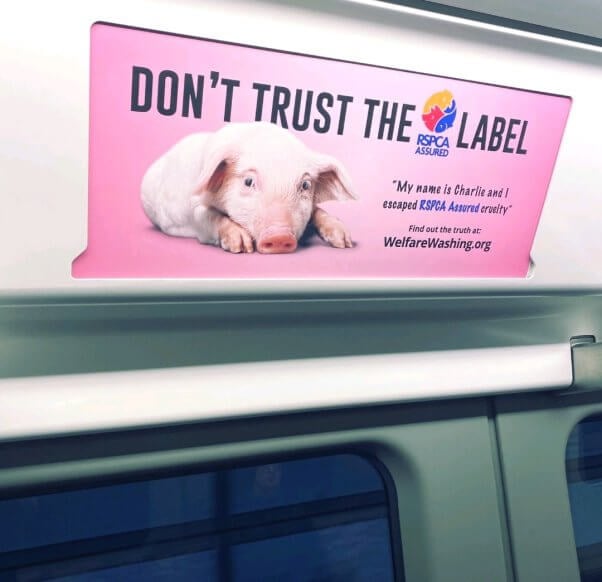
On October 10, a PETA supporter wearing a pig mask and holding a sign reading, “Stop Betraying Us!” was dragged out of the Plaza Hotel in New York City and arrested on its steps after interrupting the ASPCA’s Annual Humane Awards Luncheon.

The pig defender apologized to the awardees for the interruption but condemned the group for pimping for the factory farming industry at the expense of animal suffering and deaths. Dozens of others joined in the protest.
Before being hauled out by security, the protester implored the ASPCA’s top brass to resign immediately from the Global Animal Partnership’s board of directors.
PETA has repeatedly shared our findings and concerns with the Global Animal Partnership and the organizations that serve on its board, including in a September 2024 letter that was covered by Bloomberg.
We blew holes through the flimsy arguments HSUS offered in response one by one.
Kind consumers can take steps to end this cruelty and the “humane” lies—first, by going vegan, and second, by making sure these organizations know that you won’t support them until they end all their factory farm endorsements.
Please shun all animal-derived foods and remember that “organic” and “free-range” labels mean nothing to animals. They certainly don’t mean a humane life or death.
And please sign PETA’s petition telling HSUS, the ASPCA, and CIWF to resign from the Global Animal Partnership’s board of directors immediately and end their affiliation with the partnership and all factory farming of animals:
The post PETA Condemns ASPCA, Humane Society Endorsement of Factory Farms—Here’s How appeared first on PETA.
This post was originally published on Animal Rights and Campaign News | PETA.

Discount retailer Aldi has introduced its largest vegan Christmas range in the UK, including a plant-based version of its footlong pig in blanket, a sprouted gratin, a nut roast, a brie and butternut wellington, and a dairy-free cheese board.

Fish-free seafood maker Aqua Cultured Foods has landed on the menu of Chicago eatery Mama Delia, owned by Michelin-starred chef Marcos Campos Sanchez. The dish, called Atún Crudo, features the vegan raw tuna topped with a fried egg and potato strings.
If you’re after oat milk desserts, Kaiser is a new brand by Canadian oat farmer Nathan Kaiser. The company has introduced a bunch of ice cream tubs and bars, all but one of which are vegan. They’re available at select grocers in Quebec and will enter the Greater Toronto Area later this year, before a national rollout in 2025.
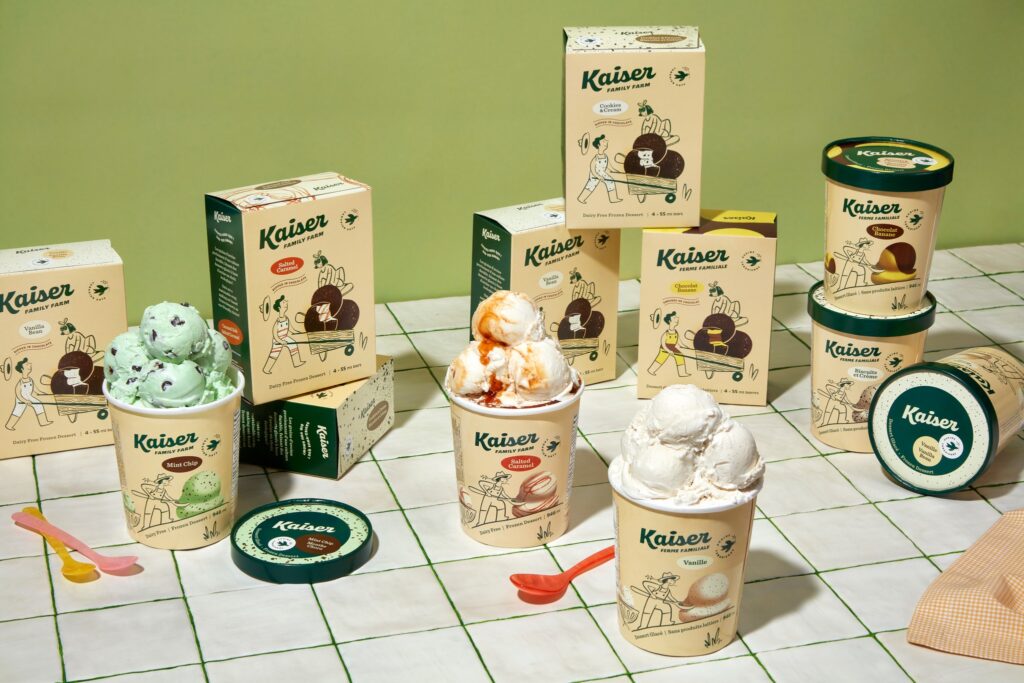
Oatly has signed a multi-year deal with UK café chain Black Sheep Coffee, which will serve its barista oat milk as the default dairy alternative across its 100 stores.
Mushroom meat maker Myco has struck a deal with Brakes, the UK’s largest wholesaler, to supply burgers, sausages and mince – made from vertically farmed oyster mushrooms – to the latter’s 20,000+ clients.

And vegan fast-casual chain Next Level Burger and its subsidiary Veggie Grill have introduced a take-home Holiday Feast menu, which features its Holiday Harvest wellington and five sides. Each $130 set feeds four to six people and requires a 72-hour notice, with the option to add dessert.
Swiss cultivated meat startup Sallea, which has created edible scaffolds for manufacturers to produce whole-cut meat and seafood from animal cells, has raised $2.6M in a funding round led by Founderful.

London-based New Wave Biotech has won the €20,000 EIT Food Accelerator Network Tech Validation Award to validate its technology with research organisation CPI. It has created an AI-powered software to help precision fermentation companies optimise their downstream processing.
Fellow UK company Vegan Food Group has sold the Weisbaum production facility it acquired in the takeover of Tofutown earlier this year to another German tofu producer, New Originals Company. It will allow the firm to focus on scaling up at its larger plant in Lüneburg.
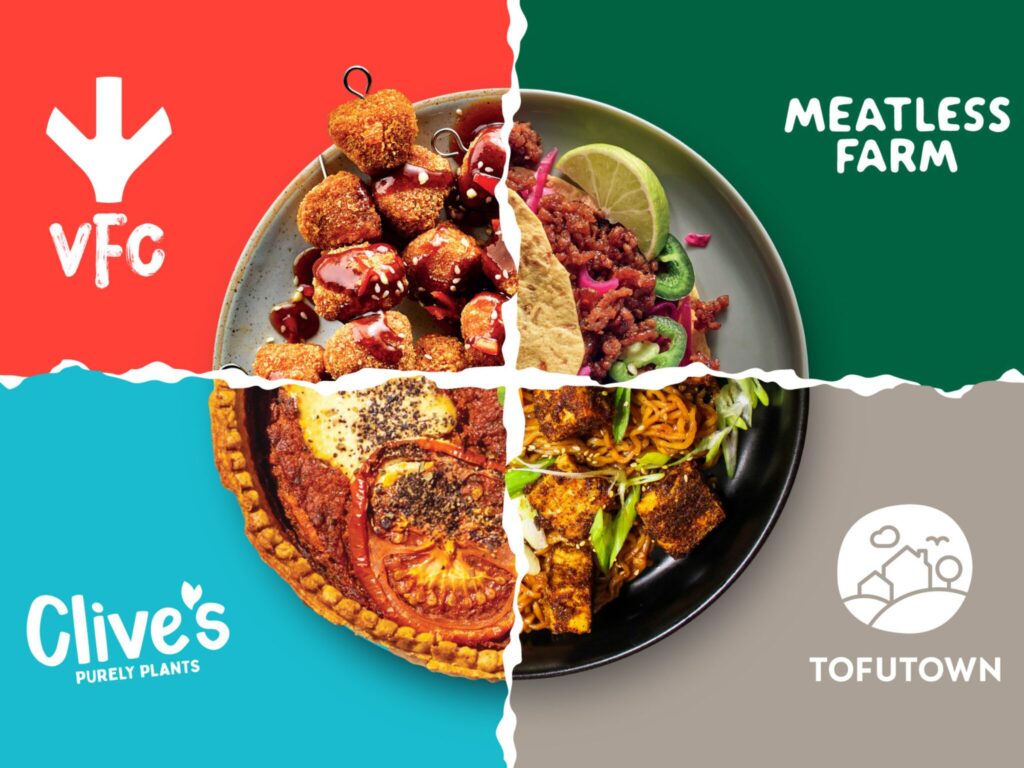
At British meat-free brand Gosh Foods, sales decreased by 7% in 2023, mostly from declines in Europe, with pre-tax losses widening from £1.3M to £3M.
Meanwhile, Framptons, another UK plant-based company, has reported a profit of £1M for the financial year ending April 2024, overturning a £3.7M loss from the previous year. It comes after its acquisition by German investment firm Profura. The manufacturer launched the Wessex Oat Company in July.

Dutch crop solutions provider AgroSpheres has closed a $37M Series B round to scale up its AgriCell technology, which protects active ingredients in pesticides from environmental pressures, and bring its biopesticides to market.
Also in the Netherlands, Qorium, led by Mosa Meat founder and cultivated meat pioneer Mark Post, has produced a 35x35cm sample of cultivated leather using a newly scaled-up tissue bioreactor.

Massachusetts continues to invest in the future of food, awarding $2.1M to the Tufts University Center for Cellular Agriculture to establish the Foodtech Engineering for Alternative Sustainable Technologies (FEAST) centre, which will advance cultivated meat R&D.
Agricultural giant Royal Cosun has invested $3.5M in Planetary to scale up the development of cost-effective ingredients derived from fermentation, convert the former’s feedstock into mycoprotein ingredients, and create new applications for plant-based food.
The Vegan Society’s VEG 1 Baby & Toddler supplement, a liquid multivitamin for children aged six months to four years, has won a three-star rating in the supplement category of the 2024 Nourish Awards.

In the Netherlands, plant-based milk is almost at price parity at Lidl (where dairy is only six cents cheaper) and Aldi (a 16-cent difference), according to research by animal rights organisation Wakker Dier.
Japanese researchers have conducted a life-cycle assessment of IntegriCulture’s serum-free, food-grade culture media for cultivated meat, revealing that electricity, animal inputs and single-use items like “lab consumables” were the main emissions hotspots.

Finally, is our brain chemistry to blame for the climate crisis? That’s the perspective of a new white paper, which suggests that humans are hardwired to desire status (which translates to material wealth and consumption), and dopamine continually craves greater rewards.
Check out last week’s Future Food Quick Bites.
The post Future Food Quick Bites: Vegan Holiday Meals, Cultivated Leather & Cheap Alt-Milk appeared first on Green Queen.
This post was originally published on Green Queen.
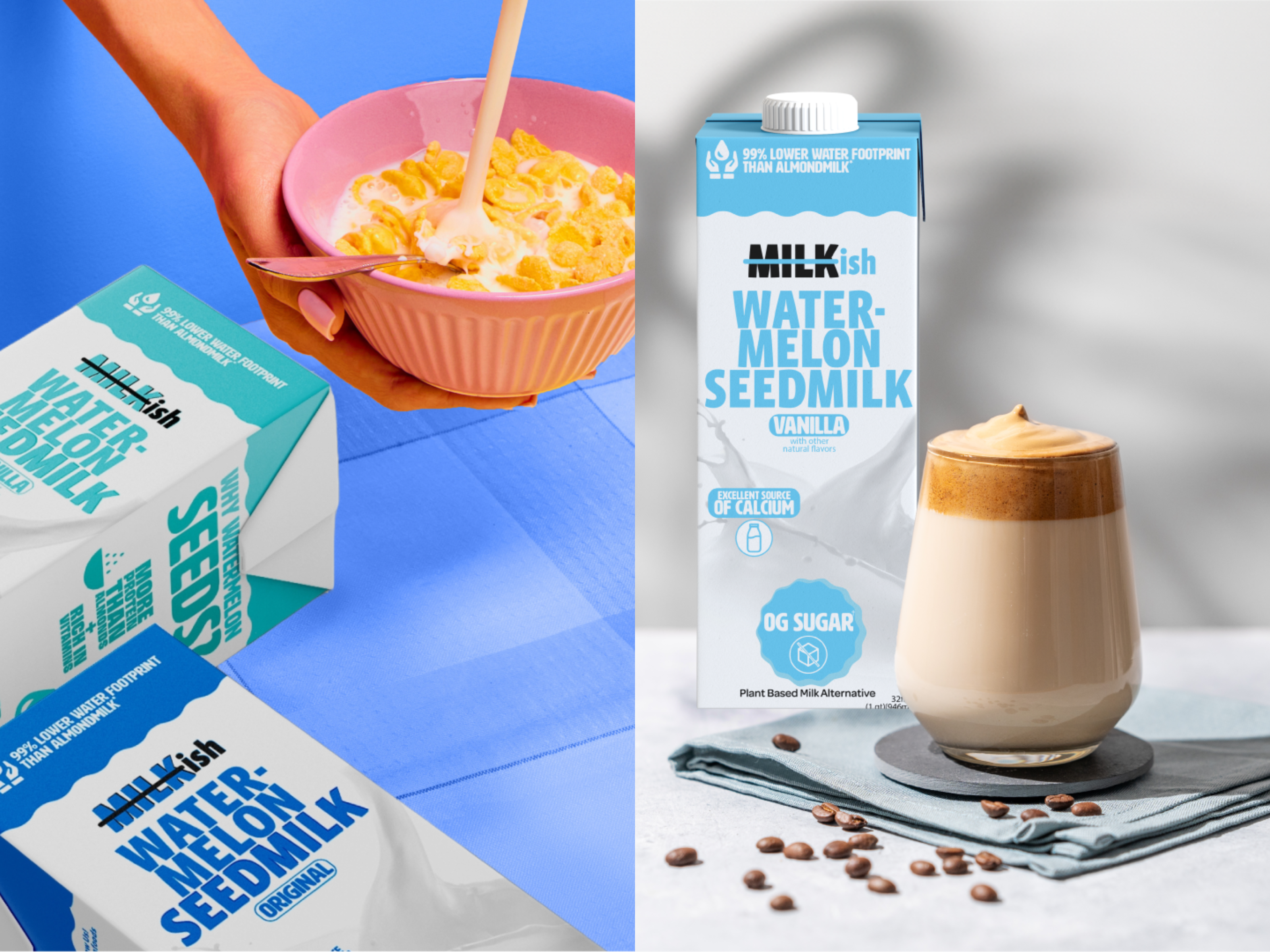
Let’s get one thing out of the way: whatever way you put it, dairy is much worse for the planet than any plant-based milk alternative.
A famous 2018 study from two Oxford University researchers proved as much, revealing that cow’s milk uses 11 times more land than the next on the list, oat milk, while generating nearly three times as many emissions as rice milk, the most carbon-intensive plant-based milk.
But one metric where plant-based milk could perform better was water use. While still much lower than the 628 litres of water needed to make a litre of cow’s milk, almond and rice milks both require a ton of water (371.5 litres and 270 litres, respectively) for the same amount.
These are numbers that have fuelled the rhetoric against plant-based milks, especially almond milk, by far the most popular alternative in the US. Addressing the water issue would help the segment hold its own against these criticisms.
Now, one Californian startup has made water waste its main focus – that too through an anti-almond narrative – with what it labels the “world’s first” milk alternative made from watermelon seeds.
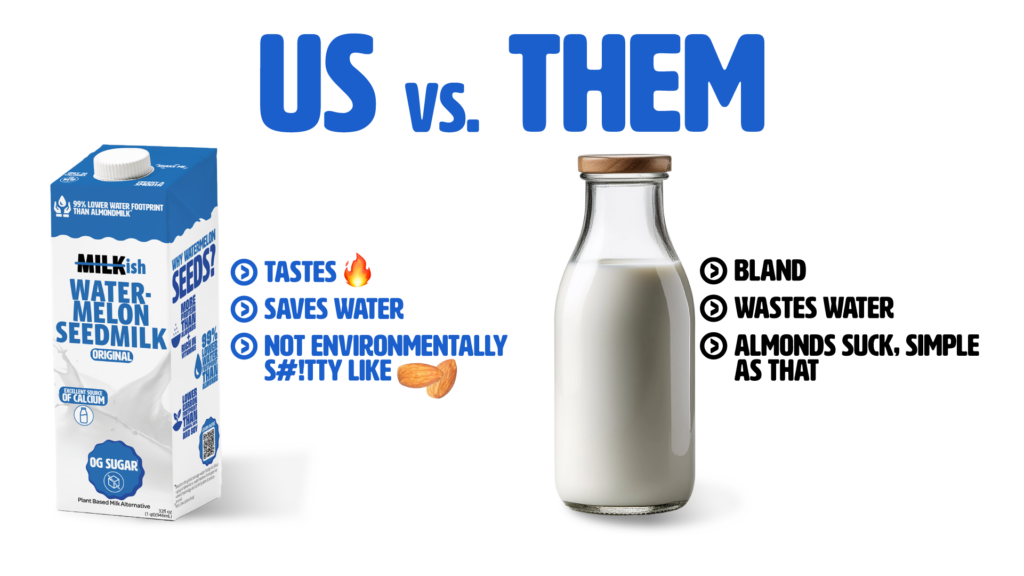
It began when Guilherme Maia Silva, a Brazilian researcher who studied Plant Sciences at UC Davis, deepened his knowledge about organic farming and sustainable agriculture. It spurred him on to establish Força Foods in 2021.
“I became fascinated by how the food we grow impacts [the] environment,” he says on the website. “Realising that many plant-based foods rely on water-intensive ingredients, such as almonds, I set out to find a better alternative.”
What began as a snack company has now turned into an alt-dairy startup. “I discovered that watermelon seeds are not only nutritious, packing more protein than almonds and rich in antioxidants, but also require 99% less water to grow than almonds,” says Maia Silva.
Força Foods’s flagship range, called Milkish, isn’t just dissing almonds. It also notes that watermelon seeds need 72% less water than oats and 53% less than soy, which are both among the mainstream plant-based milks.
The range – which comes in original and vanilla flavours – combines watermelon seeds with MCT oil, sunflower lecithin, pea protein, cellulose gel and gum, and natural flavours. They are sugar- and carb-free, have 42% fewer calories than low-fat milk, and are fortified with calcium, potassium, and vitamins A, D and E. (That said, the use of MCT oil means the saturated fat content is higher than 1% milk.)
The company is taking on competitors in a bold manner, asking consumers to “ditch the others” and declaring that “almods suck”. In a comparison with Malt Organics and Oatly, it labelled Milkish as the only product that is “delicious by itself”, noting how it can be used in frothed coffee beverages, cereals, smoothies and baking, or consumed straight up.
But despite this messaging, it seems Força Foods will follow the Oatly playbook, expanding first through foodservice locations before venturing into retail.
Força Foods isn’t the first alt-dairy company to innovate with watermelon seeds. Miyoko’s Creamery, an industry pioneer, has been selling a pourable mozzarella made from a combination of watermelon seeds and oats since 2022, and has previously introduced watermelon and sunflower seed cottage cheese. In India, Katharos Food (now owned by Nourish You) makes vegan mozzarella and Cheddar from watermelon seeds.
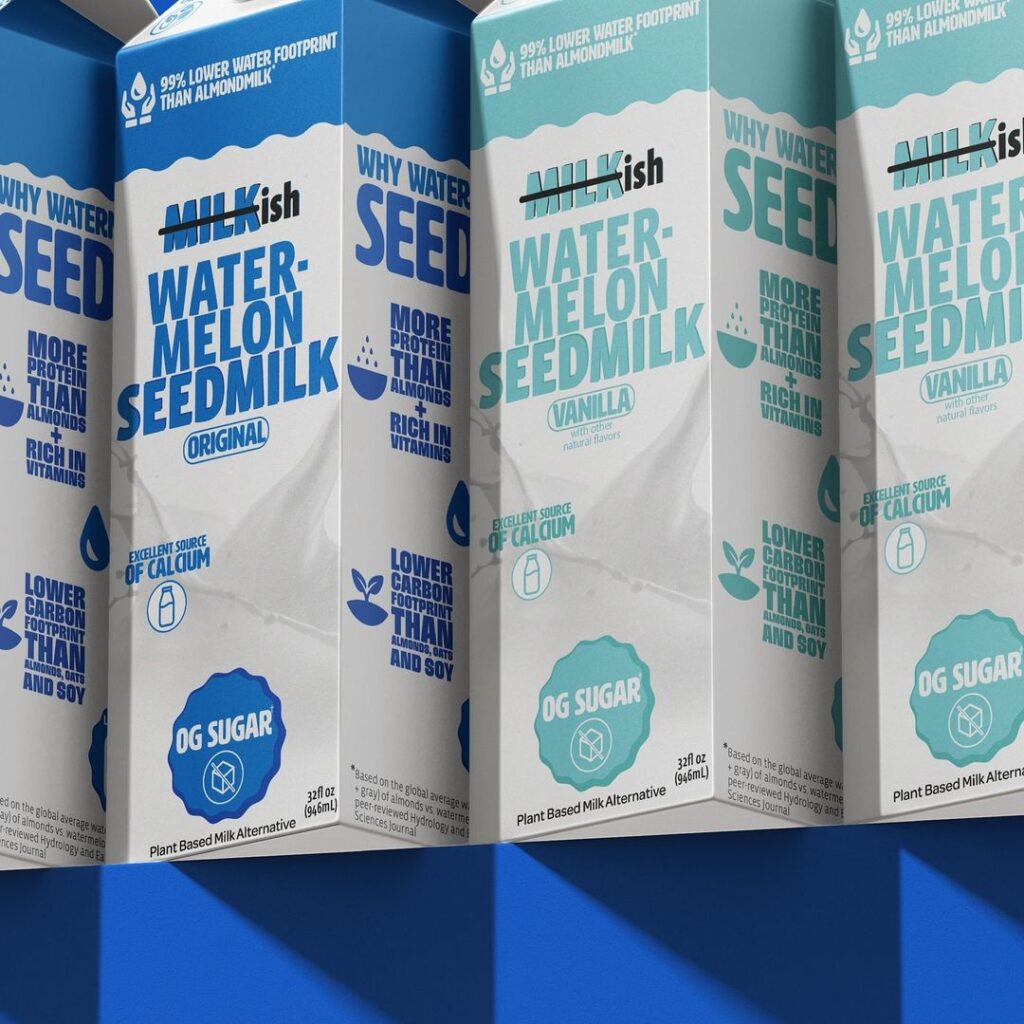
“Water scarcity is one of the biggest limiting factors to our global food supply and agriculture directly contributes to over 70% of the world’s freshwater use. Consuming lower footprint alternatives is an easy and delicious way to live more sustainably,” the company says.
This is true. Just last week, a major report found that the global water cycle is “increasingly out of balance”, and the crisis could threaten more than half the world’s food supply by 2050. One of its key recommendations is to reduce agricultural reliance on water and dependence on water-intensive foods.
But brands like Força Foods may also be appealing to something else. More and more companies are coming up with ‘non-traditional’ plant milks, or those outside the Big Four of soy, oat, almond and coconut.
Pistachio milk has become a social media darling ever since Táche burst onto the scene in 2020, while Dug’s potato milk began making waves a year later. Today, consumers can also buy buckwheat milk from Bam, sunflower seed milk from Lattini, pecan milk from THIS PKN, sesame milk from Hope and Sesame, and even banana milk from Mooala.
These brands are hoping to offer consumers something different. A new base, sure, but also cleaner labels, better nutrition, lower sugar content, and greater sustainability credentials than the status quo.
And they may be on to something. Research has shown that despite the widespread adoption of milk alternatives – 44% of US households bought these products last year, and nearly 80% went back for more – a third of Americans still haven’t found a plant-based dairy product that meets all of their needs.
“This is a call to action to the food and beverage industry. You need a fresh, creative approach to flavour creation, colour, and texture development to make products that captivate consumers,” said Sonali Dalvi, VP of innovation at Ofi, which conducted the survey last year.
Milk alternatives alone make up 36% of all plant-based sales in the US, and almond still reigns supreme. But outside of the Big Four, blends – think NotCo’s use of peas, cabbage and pineapple in NotMilk – rpreent the fifth-largest segment. Retail sales of plant-based milk dropped by 5.2% in the year ending July 14, with almond and soy milk on the decline and oat milk purchases remaining flat.
Can blends and newer options like Milkish turn the tide for the category?
The post The Newest Plant-Based Milk is Made from Watermelon Seeds appeared first on Green Queen.
This post was originally published on Green Queen.
In his groundbreaking book Animal Liberation, philosopher and bioethicist Peter Singer defined speciesism as “a prejudice or attitude of bias in favor of the interests of members of one’s own species and against those of members of other species.” Now, in a new book, Consider the Turkey—out on October 22—Singer examines how this insidious mindset directly impacts gentle turkeys, millions of whom are killed for Thanksgiving alone every year.

“This small but powerful book is full of riveting facts, including some jaw-droppers. Readers will be left wondering how, if cruelty to animals is a crime (and it is), anyone can be excused for subjecting a turkey to a raft of pain and misery so that he—invariably he—can be reduced to a carcass for the carving. Consider the Turkey promises to convert many a Thanksgiving dinner into a celebration of life.”
—PETA President Ingrid Newkirk
“In 1970, Americans ate just over 8 pounds per person annually; by 2021, that figure had nearly doubled to more than 15 pounds. In 2023, US turkey meat production for the domestic market was estimated to be a little more than 5 billion pounds a year, with another 400 million pounds exported.”
“Although each batch of birds is sent to slaughter after about 3 or 4 months, in the United States, unless there is an outbreak of disease, sheds are typically only cleaned out once a year.”
“Just ask the family and friends gathered together if they know how the bird they are eating was conceived. If they don’t, enlighten them. Then ask them whether ensuring that everyone can get a generous slice of turkey breast is worth breeding a misshapen bird who cannot mate, requiring poorly paid workers to spend all day masturbating male turkeys and pushing open the vaginas of female turkeys, who hate the procedure, but have no escape from it until they are sent off to be killed.”
“The extent of this wastage varies from species to species, but for all of them, whether we are focused on calories or protein, from eating their flesh we get back less than one-third of the nutritional value of the feed we provide for them.”
“If that term suggests that it is a simple and painless procedure, like trimming your fingernails, then once again, the industry has misled you.”
“[T]heir snoods may be removed because the bright red flesh may attract pecking from other birds; sometimes the long claw or spur on the back of the leg is amputated; and the wing feathers may be trimmed to prevent the birds from flying and so decreasing flightiness in the flock.”
“The workers were instructed not to go under the trucks, and the investigator could hear popping sounds when the truck moved forward. Once the truck had left, there were squashed remains of birds where it had been. We’ve seen this before: individual birds do not count. To take the time to save them just doesn’t pay.”
“The worker simply ripped the turkey’s foot off.”
“Presumably, that’s because turkeys don’t commit crimes. Does it make families in the United States feel better, as they chew on the corpse of one of the 46 million turkeys killed annually for Thanksgiving dinners, to know that somewhere, two of them are still alive?”
When given a good life at a sanctuary, turkeys often follow humans around looking for treats and affection. They’ve also been known to fall asleep in people’s laps while being petted.
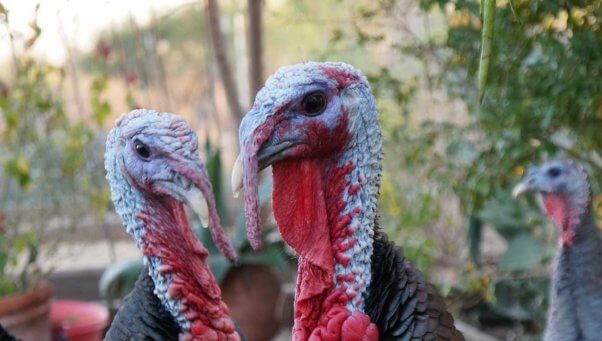
Turkeys are caring parents and spirited explorers who can live for up to 10 years, but humans kill those raised for food when they’re between 12 and 26 weeks old—millions each year for Thanksgiving alone.
Slaughterhouse workers hang the young birds by their feet from metal shackles and drag their bodies through an electrified bath. They’re often still conscious when workers slit their throats and dump them into scalding-hot tanks.
Turkeys aren’t the only animals who suffer on massive farms. Humans exploit cows, chickens, and other animals in the meat, egg, and dairy industries to produce broth, butter, and other products. These animals aren’t so different from the cats and dogs we lovingly share our homes and lives with.
Holiday traditions are comforting, but sometimes we have to get creative and find new ways of doing things. This is nothing new to vegans, who excel at improving their families’ traditions and cherished recipes by ensuring that they don’t harm animals. Most supermarkets, including Safeway and Meijer, now stock a variety of vegan options—from dairy-free butter to vegan poultry—so swapping ingredients is a snap.
The post 10 Quotes From ‘Consider the Turkey’ That Could Change Your Thanksgiving Plans appeared first on PETA.
This post was originally published on Animal Rights and Campaign News | PETA.
Attention, passengers: After hearing from PETA and receiving nearly 150,000 e-mails from our dedicated supporters, American Airlines—the world’s largest airline by daily flights—just announced that it will launch a vegan creamer option on its in-flight beverage menu in November!
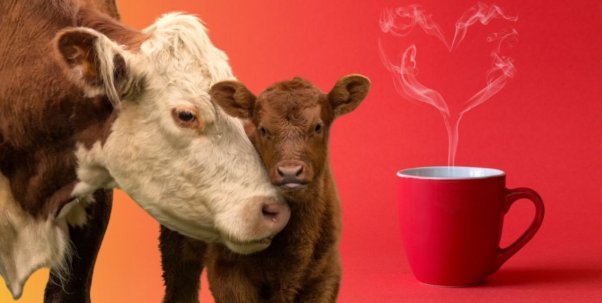
Because vegan options are kind to cows, healthier for humans, and better for the planet, the number of people ditching dairy is soaring. PETA applauds American Airlines for getting on board with oat milk creamer and urges Southwest Airlines to do the same.
PETA awarded Delta Air Lines and Alaska Airlines for being the first to widely offer oat milk options last year, and United Airlines and JetBlue added oat milk creamer this year.
Mother cows form intense bonds with their babies and often call and search frantically for them after they’ve been taken away. The demand for dairy-free milks has skyrocketed as consumers learn that cows used for dairy are forcibly inseminated and their beloved calves are torn away from them so that the milk meant to nourish their babies can be used by humans. Once their bodies wear out after repeated pregnancies, they’re sent to slaughter.
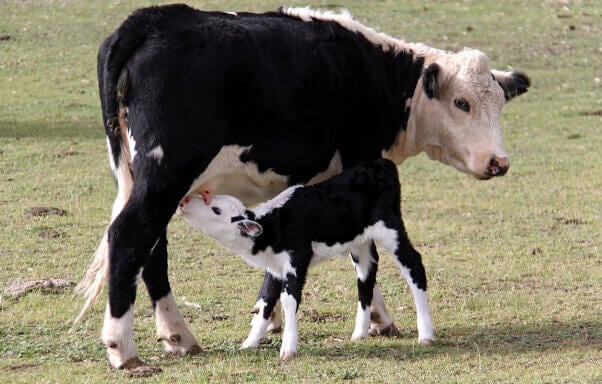
Each person who goes vegan saves nearly 200 animals a year, dramatically shrinks their carbon footprint, and reduces their risk of developing cancer, heart disease, and other illnesses. PETA’s free vegan starter kit can help anyone thinking of making the switch.
Want to do more? Click below:
The post American Airlines to Take Off With Vegan Creamer Following PETA’s Push appeared first on PETA.
This post was originally published on Animal Rights and Campaign News | PETA.
Feminist icon Joan Jett, a queen of rock ’n’ roll, gives a damn about reproductive rights for everyone—including the hens, cows, and other animals who are abused and exploited by the cruel meat, egg, and dairy industries. In a new PETA video, which will air during a commercial break in The Rachel Maddow Show on Monday, October 21, the rock legend and longtime vegan morphs into images of different women and other female animals, saying, “We are all sisters under the skin. End speciesism.”
As discussions rage over women’s rights, equal pay, abortion access, and more, Jett’s video is a powerful display of solidarity with all females.
We are daughters, sisters, and mothers. … And if any of us were forcibly bred or had our breast milk or eggs taken and sold or our children stolen from us to be experimented on, we’d all feel violated and angry and heartbroken.”
Our fellow animals can feel love, pain, and fear, yet the meat, egg, and dairy industries exploit them as if they were objects. In the dairy industry, workers forcibly inseminate (rape) cows by inserting an arm into the animal’s rectum to deliver semen with a metal rod into her vagina. Like all mothers, cows are nurturing and protective of their precious babies—but on dairy farms, workers often tear newborn calves away from their mothers within hours of birth.
In the egg industry, farms—even the ones labeled “cage-free”—typically confine hens to no more than a square foot of space and cut part of their beaks off with a hot blade. Once their bodies wear out and they’re no longer deemed profitable, workers kill them on site or send them off to slaughter.
The meat industry confines mother pigs to cramped metal crates for their entire adult lives—and a PETA exposé of a pig farm revealed that piglets slowly died just out of reach of their distraught mothers.
Ask yourself: Would I wish this fate on my mother? Or my sister? Or me?”

Every animal is someone. You can speak up for all the sensitive animals used and killed for their flesh, eggs, and milk simply going vegan. Order a free vegan starter kit today:
The post Feminist Icon and Rock Legend Joan Jett Has a Message in Behalf of ALL Animals: ‘We Are All Sisters Under the Skin’ appeared first on PETA.
This post was originally published on Animal Rights and Campaign News | PETA.
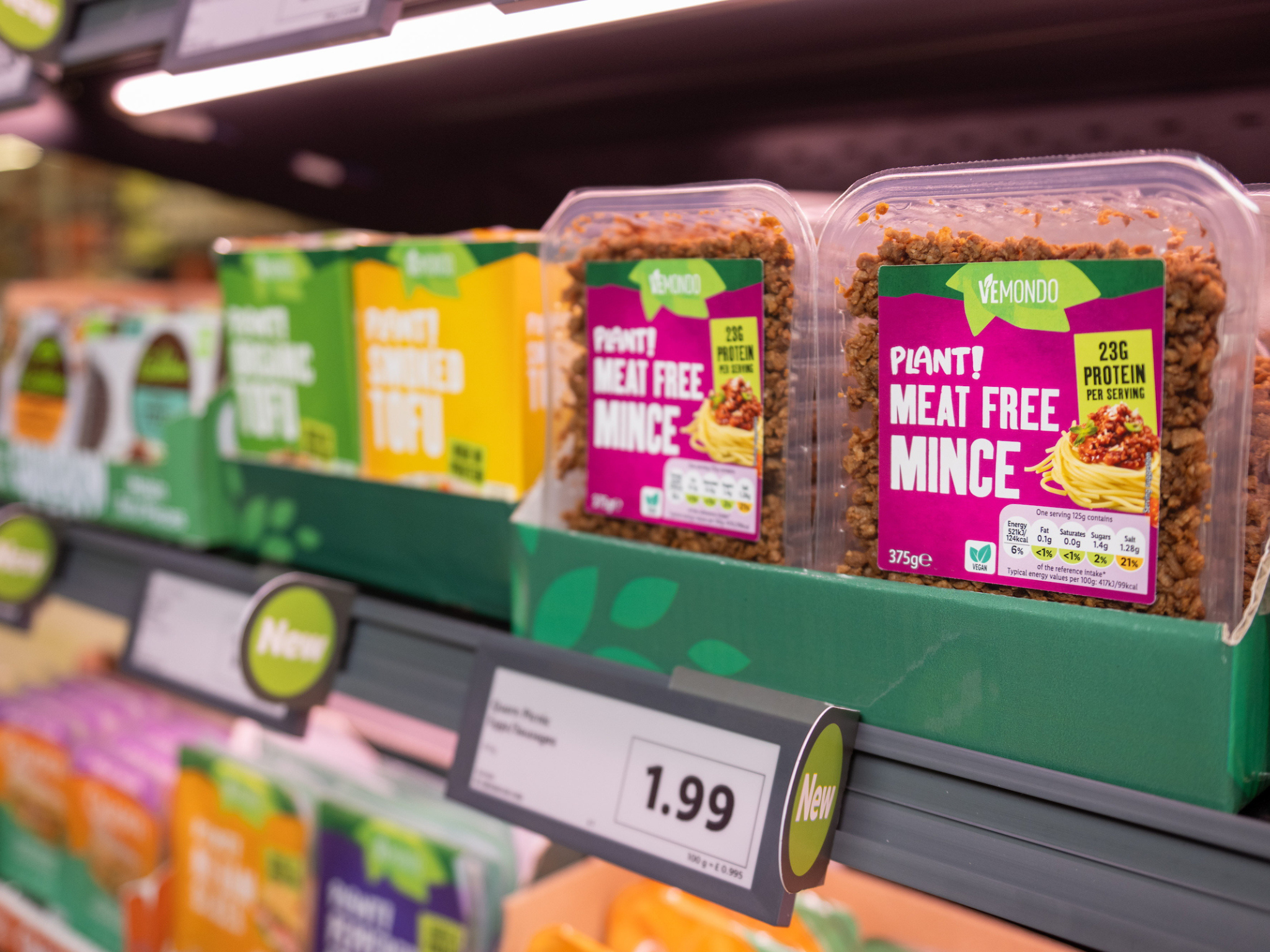
German discount supermarket Lidl is truly leading the future food shift amid Europe’s retailers. Just weeks after it set targets to reduce scope 3 emissions (which make up almost all of its climate footprint), it has now committed to selling more plant-based food in the UK.
The company has pledged to have 25% of its meat and seafood sales in the UK sourced from plants by the end of the decade, versus a 14% share in 2021. It will simultaneously double the sales share of non-dairy milk, cheese, butter and yoghurt by that time, from a baseline of 6.4% in 2021.
It makes Lidl the first retailer in the UK to set a protein split target, committing to increase the share of vegan products over animal proteins to mitigate its impact on the environment and reach net zero by 2050.
“We know that as a society, we need to incorporate more plant-based foods into our diets to ensure balance,” said Richard Bourns, chief commercial officer of Lidl GB. “That’s why we are proudly standing behind the Planetary Health Diet, which is key to achieving a more healthy and sustainable future and supports our net-zero ambitions.”
To kickstart the shift, Lidl GB has launched a new Plant! range under its vegan private-label brand Vemondo, which will help triple the number of plant-based products on offer.
“Make no mistake, this is a game-changer,” said Emily Armistead, interim director of think tank Madre Brava. “We applaud Lidl for being the first supermarket in the UK to take this bold but essential step towards a more sustainable, healthy food offering.”
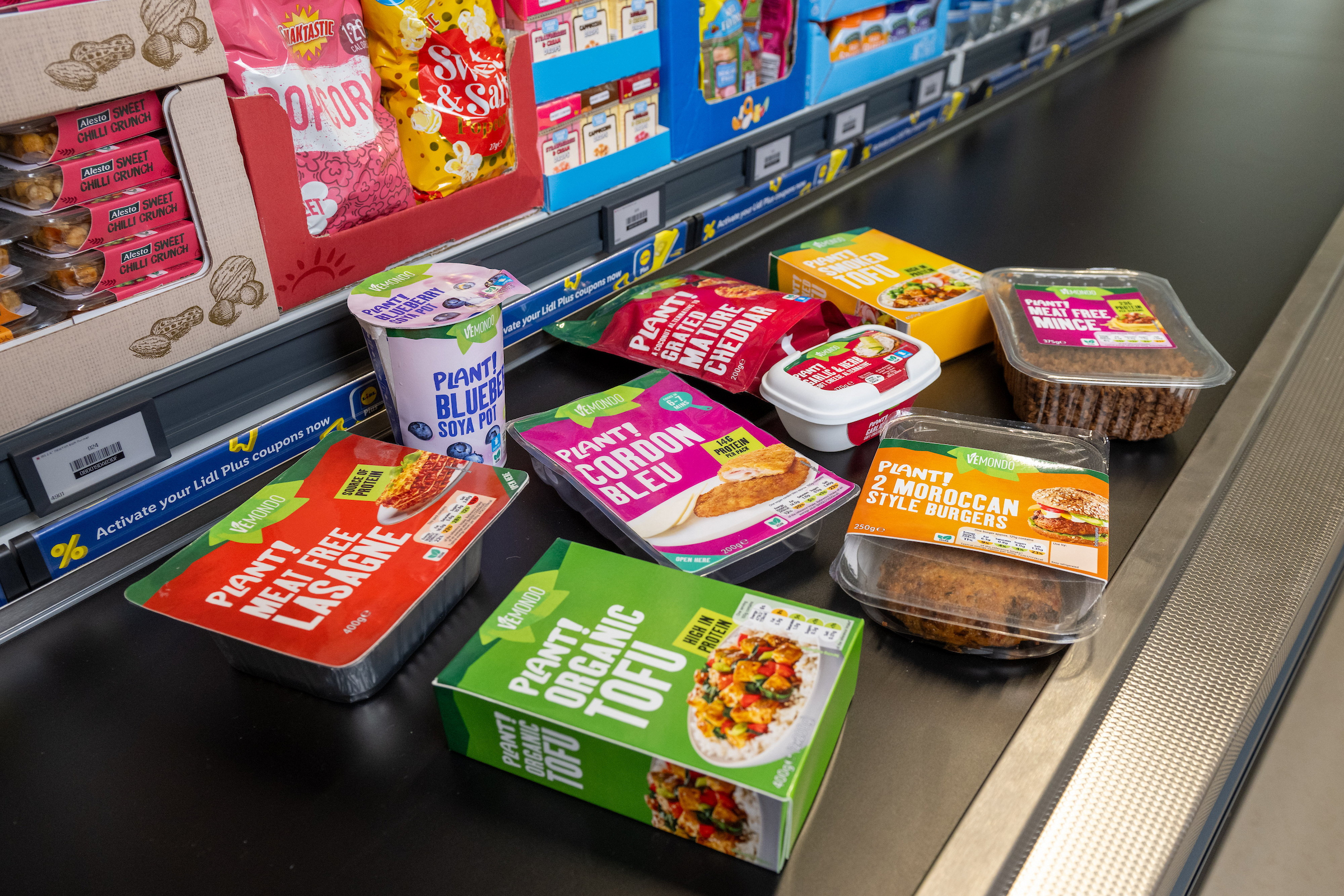
Lidl says it has witnessed a 12% increase in demand for vegan products over the past year, which pushed it to expand its plant-based offering with the new own-label range.
The Vemondo Plant! lineup features 28 new products that will be rolled out to select stores this month, ahead of a national launch in January 2025. These include multiple tofu varieties (from £1.75), burgers and sausages (from £1.89), nuggets (£1.99), and mince (£2.49), alongside vegan cheese, yoghurts, deli meats, and ready meals like lasagna and cordon bleu.
Besides the product expansion, Lidl has pledged to offer “market-leading” prices for plant-based products to amp up its protein shift. It is endeavouring to increase in-store visibility by displaying meat and dairy analogues alongside conventional products, a dedicated plant-based fixture, and increased marketing of its animal-free products.
The discounter is also focusing on the nutritional value of these products to ensure they contain micronutrients like B12 and iron, and are high in protein and low in fat and calorie content, according to Madre Brava.
“We’re the first UK retailer to set specific plant-based protein targets and are committed to breaking down key barriers that currently exist within the category, like price, quality, and availability,” said Bourns.
This speaks to consumer trends in the UK, where two in five people eat plant-based meat for its nutritional benefits, but one in five are deterred due to high prices.
“With the launch of our new own-label Vemondo Plant! range, and the expansion of our branded offering, all at market-leading prices, we’re making high-quality plant-based foods accessible to everyone, ensuring that more customers can afford to make healthy and sustainable choices,” Bourns added.
The retailer will today be honoured with the Bronze Planet Friendly Award from animal welfare organisation Compassion in World Farming (CIWF) at the Good Farm Animal Welfare Awards. “Lidl is setting an example in the UK retail sector, and we hope their initiative inspires other supermarkets to consider the impact their business has on planetary health,” said CIWF director of food business Tracey Jones.
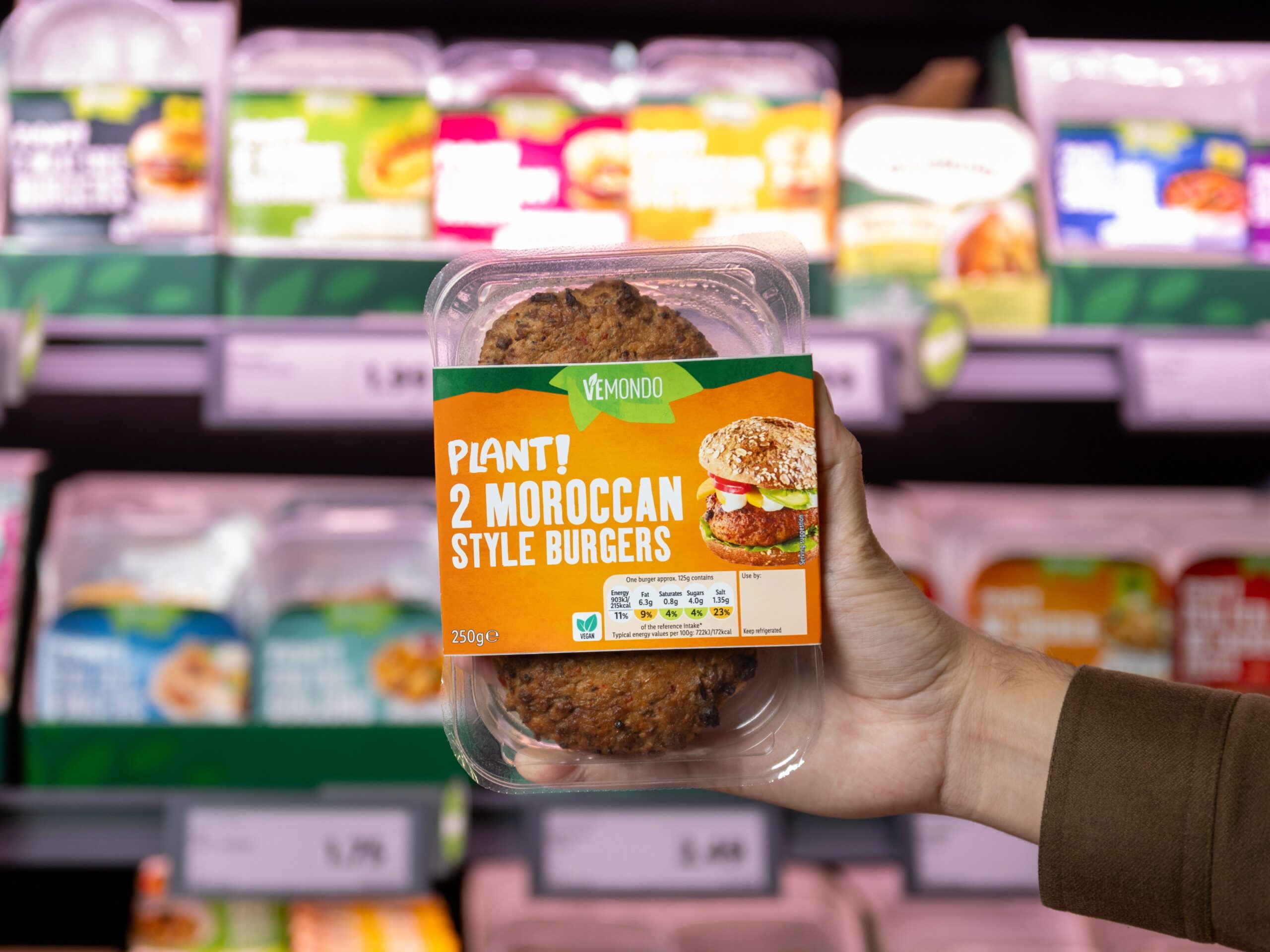
The move is the latest in a series of initiatives over the last 12 months, through which Lidl is aiming to greenify its own portfolio and lead the protein transition race among retailers globally. Just this month, the supermarket expanded its scope 3 reduction targets, aiming to cut these emissions by 35% in the next decade, and curb emissions from agriculture, forestry and land use by 42.4%.
The most effective way to do this is to replace climate-harming animal proteins with planet-friendly plant-based foods, and Lidl has recognised this by lowering the prices of plant-based analogues to match their conventional counterparts (or even beat them on price) in Germany, Denmark, Hungary, Austria, Belgium, and the Netherlands. It has positioned these products next to conventional meat and dairy items on shelves as well, which has brought sales success.
“Our commitment to sustainable proteins will contribute to significantly reducing our scope 3 CO2 emissions and support a more balanced and sustainable food system for the future,” said Bourns.
The UK is the seventh market where it has set a protein ratio target, although Madre Brava has repeatedly called for a 60-40 split in flavour on plant proteins by 2030. Still, the current target is a start, and a further sign of Lidl’s intentions.
“We can legitimately call Lidl GB a pioneer in this country, and it is notable that a discounter is publicly leading the way. All eyes will be on which supermarket will be the next to take the opportunity to offer more healthy, sustainable food,” said Armistead.
“All the solar panels and electric delivery vans in the world are of no use if supermarkets don’t also tackle the emissions from the products they sell, and shifting sales to more plants and less meat is the truly effective way of doing this.”
Rebecca Tobi, senior business and investor engagement manager at the Food Foundation – which recently published research finding meat analogues better for human and planetary health – echoed this sentiment. “Setting targets is a hugely important step, serving as a North star for driving meaningful change in shifting the food on offer so that supermarkets are better supporting both people’s health and the plan,” she said.
Lidl GB is also working with the World Wildlife Fund (WWF) on a five-year, 31-country project to make the retailer’s supply chain more eco-friendly, advocate for sustainable diets, and reduce food waste. The WWF itself published a methodology for retailers to measure protein sales last week, urging them to make 74% of all food sold plant-based.
The post Lidl Becomes First UK Retailer to Set ‘Protein Split’ Targets, Committing to Sell More Plant-Based Meat & Dairy appeared first on Green Queen.
This post was originally published on Green Queen.
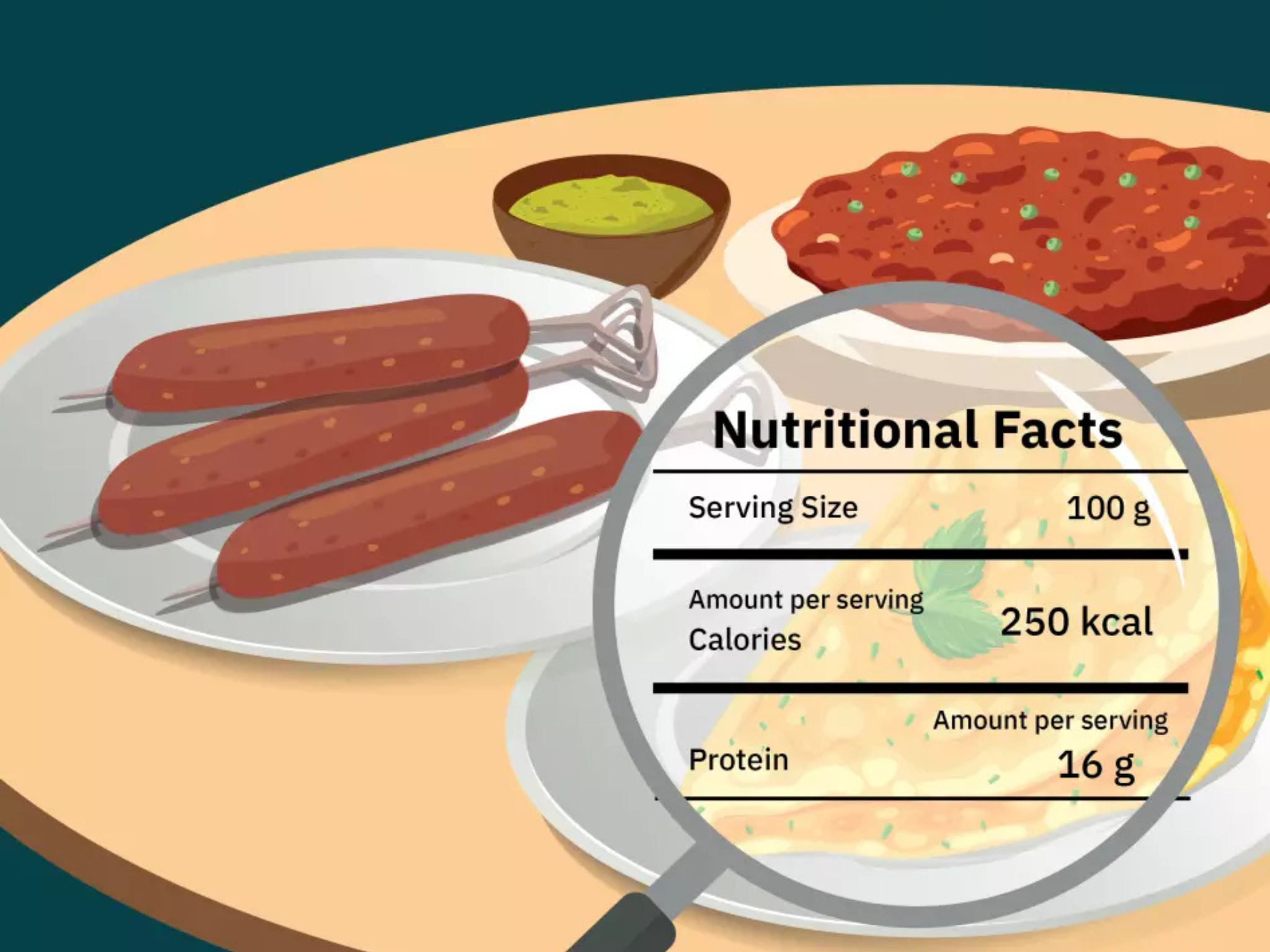
In a country where food attitudes are driven as much by health as they are by religion, and four in five citizens are protein-deficient, a new analysis is aiming to reinforce the potential of plant-based meat and eggs to meet India’s consumption needs.
Comparing over 100 meat and egg alternatives with their animal-sourced equivalents, researchers found that most vegan products have an equivalent or higher amount of protein. And those that combine two or more sources of plant proteins have a balanced amino acid composition.
The study, titled Decoding Smart Protein Nutrition, was conducted by the Good Food Institute (GFI) India, and aims to provide nutritional information to Indians while listing out recommendations for plant-based companies and the government based on its findings.
“This analysis underscores the nutritional strengths of plant-based alternatives, particularly in terms of protein and fibre content,” said Padma Ishwarya, science and technology specialist at GFI India, and the report’s author. “By offering consumers healthier, sustainable options, we can chart a path toward nutrition security and a more resilient food system.”

The study was conducted in two phases. The first reviewed the nutritional labels and ingredient lists of meat and egg products, both conventional and plant-based, and this was followed by a quantitative analysis of amino and fatty acid composition to determine their nutritional quality.
In total, 112 meat analogues in 11 categories and eight egg substitutes in four categories were analysed. The researchers found that in the Indian market, 30% of meat alternatives feature soy as their sole protein source, while 20% use a blend of soy and wheat gluten, and 16% feature pea protein. A quarter of the vegan egg offerings are also made from a soy and pea mix, with the rest being a combination of various other proteins.
GFI India found that the average protein content in plant-based meat ranged between 9% and 21%, with products using a combination of sources exhibiting higher levels of the nutrient. All products fall under the Food Safety and Standards Authority of India’s (FSSAI) minimum requirements for a ‘source of protein’, the average protein content in formats except nuggets, sausage, momos, and biryani are classed as ‘high-protein’ foods under the regulator’s definition.
All of the plant-based egg formats similarly fell under the high-protein classification, with levels ranging from 8-50%. These products also have lower fat and saturated fat content than chicken eggs across the four formats (scramble, egg powders, omelette pre-mix, and scramble pre-mix). The egg powder and scramble products also fulfil the requirements for sources of omega-3 fatty acids.
In meat analogues too, all formats barring samosas have a lower or comparable amount of average fat than animal-derived meat, with chunks, curry and strips showing lower mean saturated fat too.
The one metric where plant-based products outperformed conventional meat and eggs was fibre. The FSSAI considers foods with at least 3g of fibre as a source of the nutrient, with products containing over 6g classed as high-fibre foods.
None of the animal-derived products met either criteria, but 10 of the 11 plant-based meat formats (except biryani) and all the egg analogues are considered high-fibre foods. This is important considering nearly 70% of Indians consume less fibre than recommended.
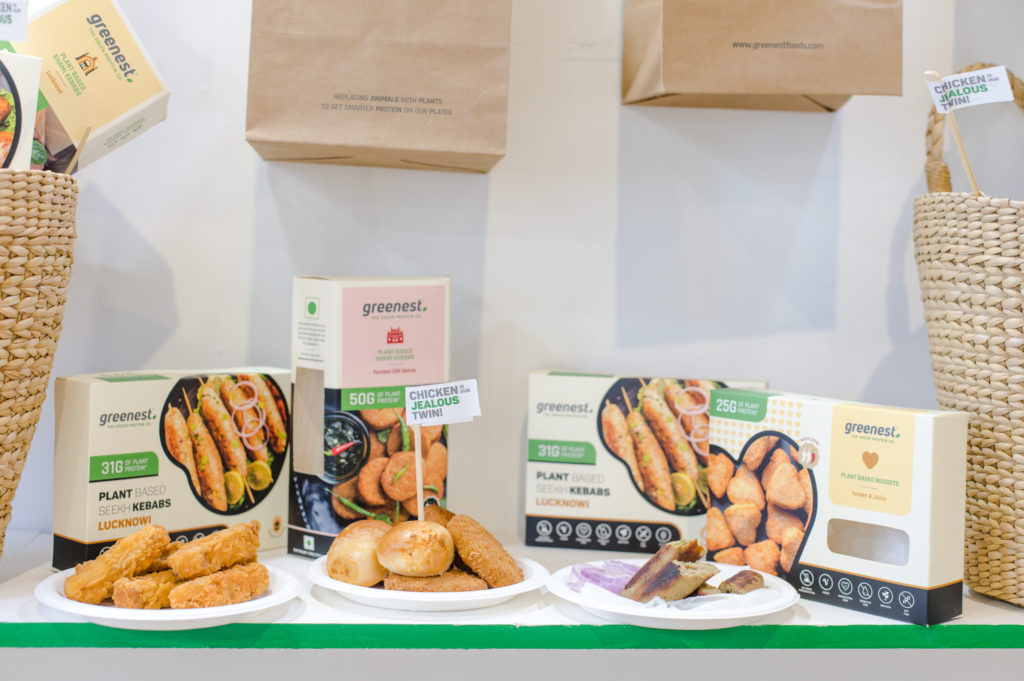
There are still several strides plant-based meat producers can make to enhance their products’ nutritional value to India’s consumers. For example, meat analogues need improvements to fulfil the nutrient content claims on unsaturated fats (specifically, the energy derived from them), as well as omega-3 fatty acids.
Ishwarya also pointed to the need to reduce sodium and saturated fat levels, and increase micronutrient profiles. “This could be achieved by upstream strategies such as crop optimisation for enhanced nutritional content and quality, ingredient diversification, and functionalisation, besides science-based product reformulation efforts,” she said.
GFI India suggested India’s smart protein sector can develop more effective communication and marketing strategies to educate consumers, and explore more unconventional plant protein sources with better amino acid composition. Manufacturers can also tweak plant protein blends to get the best out of their products, and formulate novel fat alternatives with superior fatty acid content.
Instead of using a trial-and-error approach to reduce fat and sodium levels, product reformulation efforts should be evidence-based, the report noted.
It also left some recommendations for government investment bodies, urging them to direct funds towards new plant-based product development focused on achieving nutritional parity, and ingredient optimisation and salt reduction for healthier meat and egg alternatives.
Public sector capital should also go into R&D projects that leverage Indigenous crops to diversify the “ingredient basket” of the vegan sector, as well as those exploring novel structuring approaches like microgelation and oleogelation to reduce the dependency on texturisers and enhance the application range of current lipid offerings.
Finally, the government should also support investigations into the protein digestibility and nutrient bioavailability of plant-based analogues. The report argued that understanding the long-term benefits of vegan diets on gut health and mitigating diseases would bolster the category’s strength.
“With support from the public and private sectors, the continued development and improvement of these products has the potential to enhance nutritional benefits for individuals while also protecting public health and the environment,” said Ishwarya.
The post Indian Plant-Based Meat Products Are Nutritionally On Par With Animal Proteins – And Sometimes Even Better appeared first on Green Queen.
This post was originally published on Green Queen.

With retailers playing a key role in the food system’s emissions and its transition towards a low-impact industry, the World Wildlife Fund (WWF) is helping them with a new methodology to enable the protein transition.
Meat and dairy take up 57% of agrifood emissions, and up to a fifth of the world’s total emissions, while also using up 80% of farmland and 30% of the global freshwater supply. But despite this disproportionate use of resources, livestock farming only supplies 17% of the world’s calories and 38% of its protein.
Experts have suggested that emissions from the food system alone will blow us past our 1.5°C budget, and maybe even the 2°C mark – there’s no way for us to meet our climate targets without addressing agriculture.
On the flip side, vegan diets have been found to reduce emissions, land use and water pollution by 75% compared to those rich in meat. And even if we replace just half of our meat consumption with plant-based alternatives, it can lower farm and land use emissions by nearly a third, while halting deforestation and reducing hunger by 3.6%.
Hence, the protein transition – i.e., the shift away from animal- to plant-based food sources. Dietary change is the most effective lever in lowering greenhouse gas emissions, and as gatekeepers of both sides of the supply chain, retailers play a crucial role in enabling this shift.
“Retailers are critical in accelerating the transition to healthy and sustainable diets, particularly in countries with high consumption-related environmental impacts,” said Brent Loken, global food lead scientist at WWF. “This transition requires a rapid transformation of food environments and for healthy and sustainable foods to be made more affordable and accessible to all.”
To help move the needle, its Planet-Based Diets Retailer Methodology aims to support supermarkets in promoting plant-based food consumption over animal-sourced foods, which the conservation organisation says is critical to “restoring nature, limiting the impacts of climate change and supporting consumer health and wellbeing”.

The report breaks down food sources into seven groups: meat, plant proteins, and meat analogues; dairy and dairy alternatives; fats and oils; fruits and vegetables; grains and cereals; tubers and starchy foods; and snacks high in fat, salt and sugar.
The methodology proposes a stepwise approach to help retailers drive the shift towards a more sustainable food system. The first step of the protein transition is to measure the balance of animal and plant-based sales for whole products like sausages, chicken breasts, chickpeas and yoghurt, as well as categorise composite products (like meals, salads, and sandwiches) into meat-based, seafood-based, vegetarian, and vegan. This step covers both branded and private-label offerings.
It recommends that retailers measure foods by weight instead of protein content, and provides several reasons for it. First, ‘protein transition’ doesn’t refer just to the macronutrient, but the overall diet. Plus, focusing on protein in the analysis could then delve into complexities like bioavailability and amino acid profiles, which raises the question of where to draw the line.
Secondly, focusing on the weight also allows the analysis to capture the entire spectrum of a retailer’s offering, not just their protein content. It also aligns with the methodology of other dietary models like the Planetary Health Diet or national guidelines, which aim to find the most optimal foods to achieve specific goals like meeting nutritional requirements and lowering climate impact.
Next, sales-based measures of products offer a standardised way to compare different products and categories, as well as across food groups. And finally, WWF says measuring sales in weight is straightforward and practical for most retailers, as they often manage inventory and sales data based on volume.
“This approach aims to provide a practical, consistent and holistic methodology that helps retailers effectively manage and improve the sustainability and health of their product range, while remaining aligned with established dietary frameworks and taking a broad view of diet quality,” the report reads.
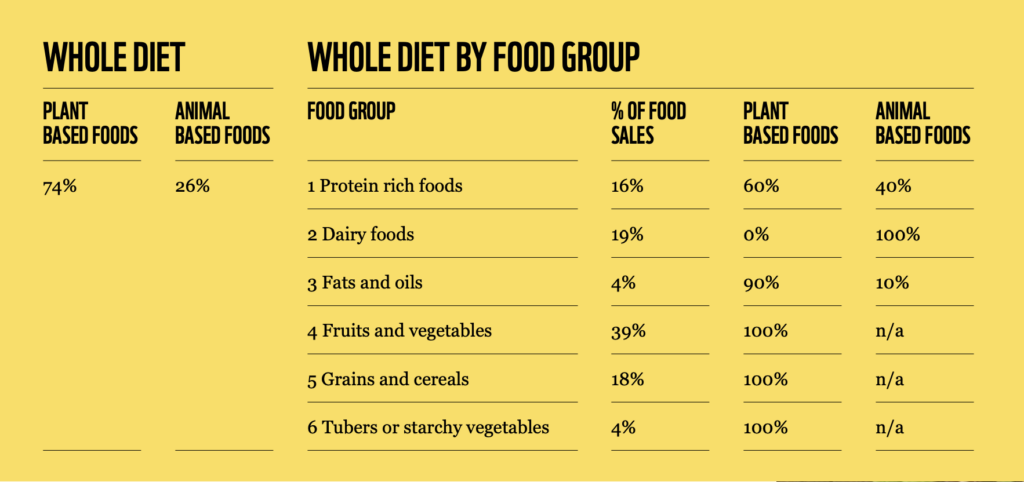
In step two, the WWF outlines an opportunity for retailers to dive deeper into the data of their own-brand products. This involves breaking down their composite products on an ingredient level to enhance the granularity in product categorisation. Here, retailers would measure the weight of each ingredient with a product, rather than using its total weight. For example, in a vegan lasagna, the 70g plant-based mince would go in the first food group, and the 20g non-dairy cheese in the second food group.
The methodology also offers a way for supermarkets to go beyond the protein transition and promote a healthy and sustainable dietary shift by addressing foods outside meat, dairy and their alternatives. “Retailers should track the proportion of whole grain sales compared to refined grains, as well as the proportion of fats from animal-based or plant-based sources,” it explains.
WWF is now urging retailers to set clear targets to rebalance diets in favour of plant-based – or planet-based, as it likes to say – foods. It has recommended setting targets to achieve a ratio of 60% plant-based protein sales, as well as an overall sales split of 74% in favour of plant-based foods (including vegetables, grains, starches and other food groups).
Some retailers in Europe have already done so. Lidl and Ahold Delhaize have set protein ratio goals in certain markets, and are vying to be the first to establish an international target.
“Retailers must be prepared to adapt their sales strategies to achieve both their own sustainability commitments and contribute to global goals,” said Mariella Meyer, senior manager of sustainable markets at WWF Switzerland.
“We know that intensive agriculture is the number one driver of the catastrophic decline of wildlife and nature, so promoting healthy, sustainable dietary choices is key. In countries where animal-source foods are overconsumed, food retailers can lead the way by rebalancing their products.”
The report also suggested that reformulating meat analogues that are high in salt, fat or sugar and may lack essential micronutrients is key to the protein transition. This is also why dairy alternatives need to be fortified, and why WWF champions plant proteins like tofu, tempeh and seitan to replace meat consumption.
The post WWF Develops Tool to Help Retailers Meet Planetary Goals By Ramping Up Plant-Based Food Sales appeared first on Green Queen.
This post was originally published on Green Queen.

Gut health guru Tim Spector, environmentalist Chris Packham, and climate journalist George Monbiot are among a large group of experts urging the UK’s National Health Service to adopt a ‘plant-based by default’ approach in its hospitals.
In an open letter addressed to every NHS Trust and healthcare leader in the country, more than 1,200 health professionals and 22 organisations are calling for the normalisation of vegan meals in UK hospitals to lower costs and emissions while advancing inclusivity and health outcomes.
Coordinated by Plants First Healthcare, a new campaign led by senior NHS doctors, the letter highlights the success of a similar initiative in New York City’s public hospitals, which led to a 36% reduction in carbon emissions, cost savings of 59 cents per meal, and a 90% satisfaction rate while serving 1.2 million meals since March 2022.
The NYC campaign was spearheaded by non-profit Greener by Default, which is now also working with Plants First Healthcare to bring the plant-based by default approach to the UK’s public hospitals, which would cut the NHS’s food-related emissions by up to half.
“We have a long way to go to transform both staff and patient meals in hospitals. When staff and patients are made aware of the health and climate benefits of plant-based meals, they are supportive of incorporating more lower-carbon, health-promoting foods,” said Shireen Kassam, a consultant haematologist at King’s College Hospital London and co-lead of the campaign. “The aim is to advance this transformation with Plants First Healthcare.”
The open letter, launched on World Food Day, coincided with the UK Health Alliance on Climate Change’s (UKHACC) Food Systems Policy Report, which calls for the normalisation of plant-based meals in all healthcare settings.
The UKHACC is among the 22 organisations that signed the letter, which also include the British Dietetic Association’s Sustainable Diets Group, the Centre for Sustainable Healthcare, and Nuffield Health (among others). Together, they represent over one million members.
“‘Plant-Based by Default’ menus offer and incentivise plant-based meals as the primary menu option without restricting choice – meat and other animal products remain on the menu,” the letter reads.
“There is now overwhelming evidence that shifting towards a plant-predominant food system can significantly improve national health outcomes, address health inequalities and is essential for meeting our climate and nature targets,” it continues.
“By encouraging a higher consumption of fruit, vegetables, whole grains and legumes we can reduce the prevalence of heart disease, high blood pressure, type 2 diabetes, obesity and certain cancers.”
In 2020, 70,000 deaths in the UK were associated with insufficient consumption of nutritious plant-based foods, like produce, whole grains, legumes, nuts and seeds. “Hence showcasing the benefits of a plant-based diet within healthcare settings should be part of educational efforts to change dietary habits of the UK public,” argued Kassam.
“70% of my work as a GP is managing chronic diseases,” added Sue Kenneally, an obesity physician. “And I think if people followed a plant-based diet, I could probably put my feet up.”

Aside from the health outcomes, the letter also makes the case for the climate and cost benefits of promoting a vegan-first approach to NHS menus. The health service has pledged to reach net-zero emissions by 2045, with food making up 6% of its carbon footprint.
Newcastle upon Tyne Hospitals Trust, Sussex Community NHS Foundation Trust, Hampshire Hospitals and Great Ormond Street Hospital have all signed the Cool Food Pledge to curb food emissions by 2030, while hospital trusts like Leicestershire and Rutland have committed to a ‘low carbon menu’ and Leeds Teaching Hospital NHS Trust and Queen Victoria Hospital are cutting back on polluting foods like beef and lamb.
The NHS has also partnered with Quorn to offer blended burgers and sausages to reduce its environmental footprint. But the overall pace of change is slow, the campaign says, pointing to a recent independent investigation that outlined the need for a ‘greener NHS’ that focuses on ‘the power of prevention’. Plants First Healthcare argued that the default vegan approach would help the NHS get on track with its net-zero goal.
A 2,000-person survey this year found that 35% of Brits would back a switch to a 100% vegan menu at NHS hospitals, although only 23% feel the republic would support plant-based meals as the main option, and two in five believe it would have negative impacts on patient health (versus 20% who think they would benefit).
That said, 30% say it would be more planet-friendly, and a quarter believe it would save the NHS money. And as the letter points out, this could indeed ring true. A modelling study shows that a ‘plant-based by default’ approach could save the service £74M each year, with significant household savings if patients are supported in making these dietary shifts.
Likewise, research by the Office of Health Economics found that if England were to adopt a completely plant-based diet, the NHS would witness an annual net benefit of up to £18.8B. “No other intervention can deliver such significant health benefits alongside cost savings and environmental benefits,” the letter reads.
“It would probably save the NHS in many ways, because the NHS is really, really struggling. So I think it really is the future for our country,” said Kenneally.
The letter is now being sent to the CEO, lead dietitian, sustainability director, and medical director of every NHS trust and integrated care board in the UK, with Greener by Default providing free one-on-one consultations, menu analysis, marketing collateral and other support services to hospitals.
The post UK Hospitals Urged to Follow NYC’s Lead & Make Vegan Food the Norm By 1,200+ Health Experts appeared first on Green Queen.
This post was originally published on Green Queen.
Ahead of this year’s “ThanksVegan” celebrations, PETA has been urging people across North America to choose a compassionate holiday feast.
Each year in the U.S., approximately 46 million turkeys are killed and sold for Thanksgiving. Turkeys are playful, intelligent individuals who protect their flocks and bond with humans—some turkeys who live on farm sanctuaries have even been known to choose their favorite people.

In the meat industry, turkeys are killed when they’re only 3 to 5 months old, and during their short lives they’re denied even the simplest pleasures, such as running, building nests, and raising their young. And there’s no such thing as “humanely raised” turkeys.
We’re urging people to show turkeys, pigs, cows, and all other animals respect by leaving them off their Thanksgiving table.
Here are some of the ways PETA has helped make Thanksgiving better for all animals in 2024:
Ahead of Thanksgiving in Canada on October 14, we placed ads on 25 benches in Winnipeg, Manitoba, that read, “Turkeys Feel Pain, Too. Don’t Have a Hand in Their Suffering. Please, Go Vegan.” The ads were located near Kid City (an indoor amusement park) and several schools and daycare centers.

We also placed a version of the ad on three digital billboards in Windsor, Ontario, since Ontario is a top turkey-producing province. PETA supporters handed out free Gardein vegan Turk’y Roasts to passersby just a stone’s throw from the sky-high messages.
In Guelph, Ontario, PETA supporters set up a table outside a local grocery store and handed out 30 Tofurky roasts to encourage people to celebrate ThanksVegan with a centerpiece that nobody had to die for. Passersby were extremely grateful, and many of them even posed for a photo with their vegan roast and a sign.
As the organizer was purchasing the roasts for the giveaway, a man in line behind her at the grocery store asked why she was buying so many. When she told him that she was working with PETA to hand them out and urge people to celebrate a vegan Thanksgiving, he offered to purchase two of the roasts as a donation to support our cause.
Having a wonderful ThanksVegan at home is a compassionate and fulfilling way to embrace holiday tradition without harming anyone.
Most supermarkets stock a variety of animal-free options at wallet-friendly prices—from dairy-free butter to vegan turkey roasts—so swapping ingredients is a snap.
PETA’s free ThanksVegan guide will help you cook the meal of your life for the next holiday and many more to come. Whether you’re hosting, traveling, or hunkering down at home for a small-scale feast, we’ve got you covered:
The post PETA Is Taking Action for Animals This ‘ThanksVegan’—and You Can, Too appeared first on PETA.
This post was originally published on Animal Rights and Campaign News | PETA.
While accused rapist and sex trafficker Sean “Diddy” Combs awaits his trial behind bars, PETA wrote to the warden asking to serve him only dairy-free meals in order to prevent him from being involved with any instances of sexual assault while in custody.
“Mr. Combs is accused of rape, sex trafficking, and similar offenses involving nonconsensual sexual acts, so please consider that the meat and dairy meals he’s given are also products of sexual violence, certainly extreme sexual violence against females in the dairy industry, whose reproductive systems are manipulated, controlled, and exploited,” the letter states.
In the dairy industry, workers forcibly restrain and artificially inseminate (i.e., rape) female cows by thrusting their hands inside them on what the industry itself calls “rape racks.”
As shown in this 60-second video, to impregnate a cow, a person jams their arm far into the cow’s rectum to locate and position the uterus and then forces a long semen-delivery syringe into her vagina. Cows often bellow and try to escape, but they are held fast, sometimes with a “twitch,” a cruel means of causing pain to their nostrils to make them afraid to move.
After a mother cow gives birth, workers tear her precious baby away from her within hours. Many mother cows cry and call out for their calves for days after they’ve been separated.
“It seems appropriate, therefore, to prevent [Mr. Combs]—and any other accused sexual offender—from contributing to the exploitation and abuse of any female while he’s in prison by serving him only dairy-free meals. And we are pleased to note that your facility already has such meals available. Serving sex offenders only dairy-free meals may also save taxpayers money by decreasing healthcare costs, since vegans have a lower risk of suffering from heart disease, obesity, cancer, diabetes, and many other common health problems than meat-eaters do.”
PETA also offered to send the prison vegan recipes.
Cows are sensitive, social animals who don’t want to be abused for their milk or body parts. Like all mothers, they want to protect and nurture their young. Please show cows and all other animals exploited and killed for food empathy by going vegan. Order PETA’s free vegan starter kit to make the compassionate switch today:
The post PETA Asks Jail to Serve ‘Diddy’ Dairy-Free Meals That Don’t Involve the Sexual Abuse of Cows appeared first on PETA.
This post was originally published on Animal Rights and Campaign News | PETA.
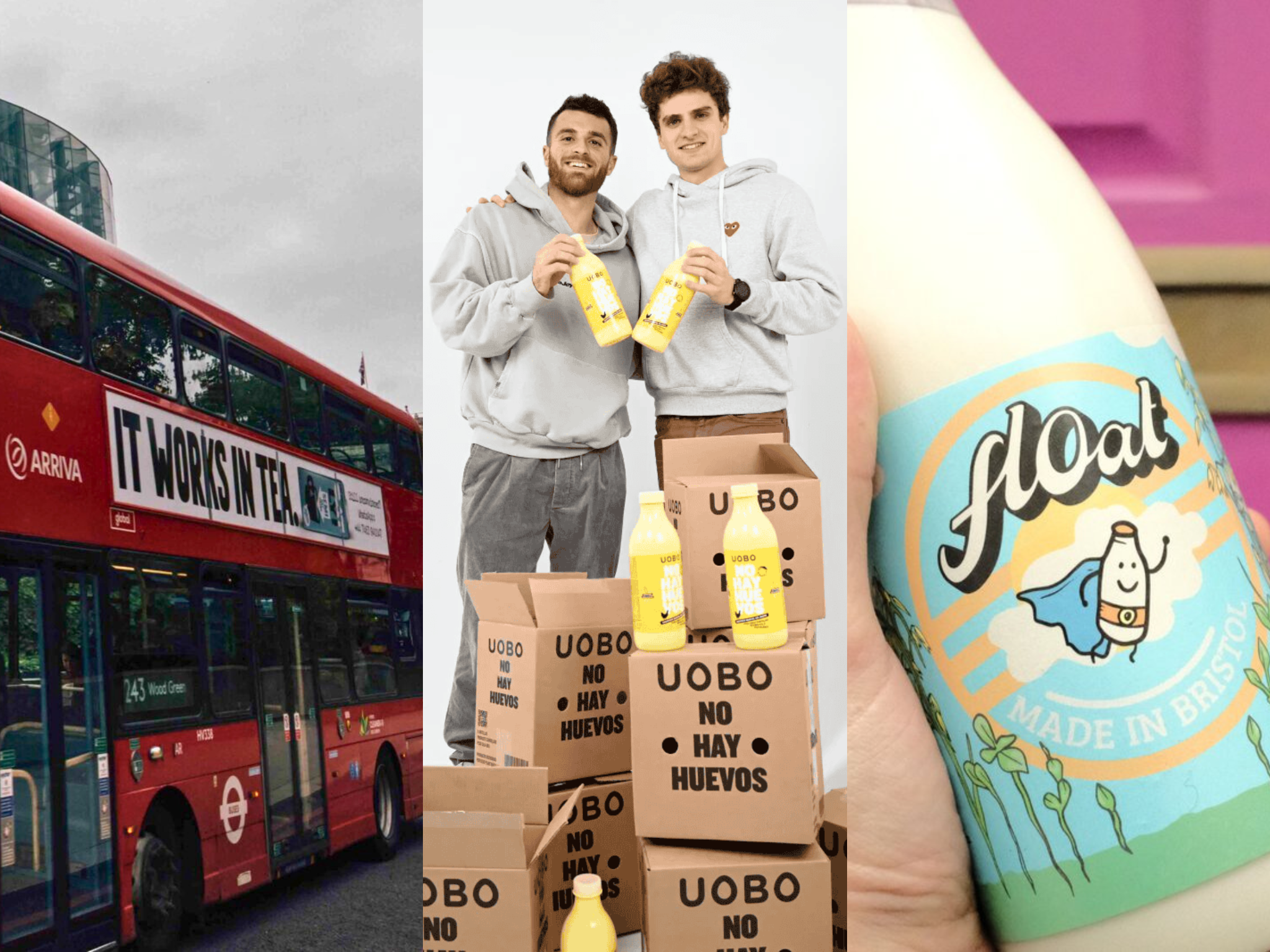
As it awaits regulatory approval in Singapore, French cultivated meat producer Vital Meat collaborated with Hue Restaurant as part of a tasting in the city-state. The event featured three dishes using the startup’s cultivated chicken powder.
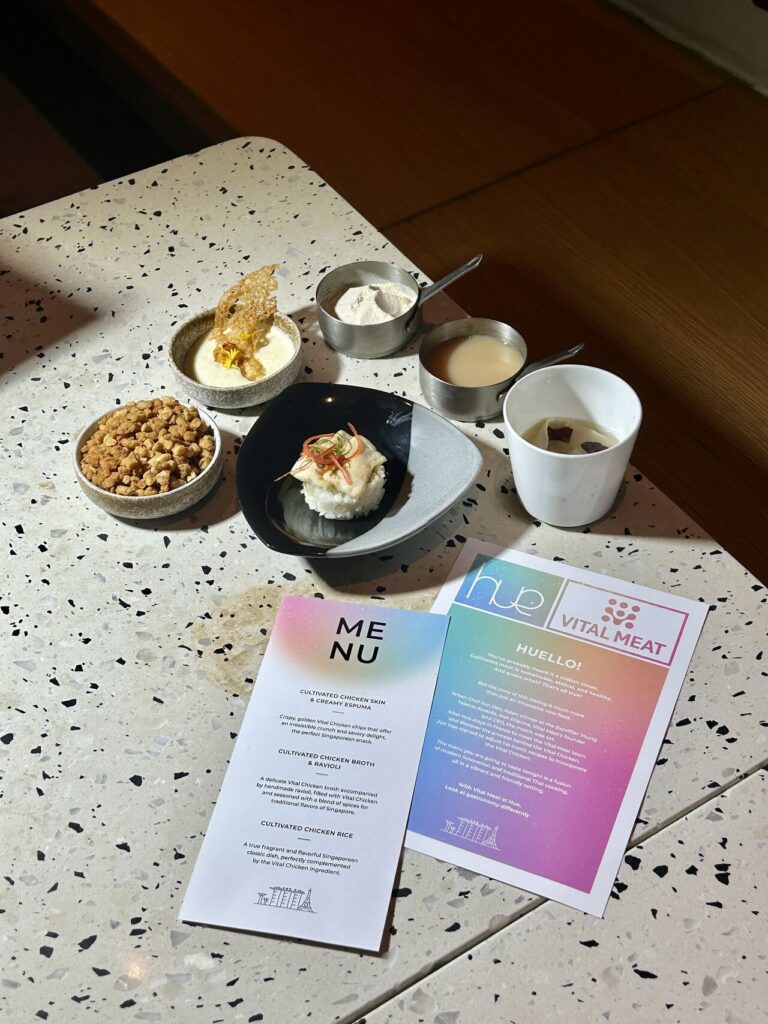
There’s a new mushroom brand in town. California’s Thallus Foods is using the chicken of the woods mushroom to replace, well, the other chicken. It calls itself the first indoor cultivator of this fungi variety.
Speaking of new companies, in Denmark, Plantbox is curating plant-based meats and cheeses for wholesale consumers, and has gained listings at SPAR, Pico Pizza, Nemlig, Wolt, and more.

Swedish oat milk giant Oatly has kicked off its new It Works in Tea campaign to target Britain’s tea-drinking tendencies. Featuring billboards in London, Manchester, and Brighton, the brand asked consumers to text a WhatsApp number if they were unconvinced. It received over 12,000 responses in the first 24 hours, who were in with a chance of winning a free tea set (with a mug and PG Tips tea).
London-based The Good Pea Co, which makes alt-milk powders, has rebranded to Kwerky, with a new five-ingredient oat and pea milk powder slated for launch next month.
Also in the UK, Tiba Tempeh has gained a listing for its tempeh block and mince at 327 Morrisons store, following a rollout in Sainsbury’s in the summer.
In more tempeh news, Mamame Foods has introduced tempeh chips made from black-eyed peas in original, hot chilli, sea salt and rosemary flavours. They’re available at Whole Foods in the UK and will come to Planet Organic this month for £4.99, alongside Erewhon and Sprouts in the US in the coming weeks.

Discount retailer Asda has added Dark Choc & Honeycomb Cake Pop Bites to its private-label Free From range in the UK.
Belgian bakery and chocolate giant Puratos has extended its ready-to-whip Ambiante line with a dairy-free chocolate flavour, which uses cocoa from the company’s Cacao-Trace programme and can be used as a topping or filling for cakes, pastries, and more.

Swedish startup Hooked Foods has teamed up with Sodexo to distribute its seafood and chicken analogues to the caterer’s network, following a successful Green Lunch for one of its clients.
Vegan frozen food company Strong Roots has launched Air Bites, a range of products designed specifically for air fryers. It is available in Crispy Spinach & Carrot, Crispy Pea & Lemon and Crispy Veg flavour for £2.95.

And back in the US, Misunderstood Whiskey has unveiled its Outrageous brand of cream liqueurs made from oat milk. The 14% ABV bottles come in espresso, coconut and bourbon cream flavours for $28.
US biotech startup Tiamat Sciences, which created animal-free growth factors for cultivated meat via molecular farming, has ceased operations following financial constraints.
Californian firm The Every Company, the precision fermentation startup making recombinant egg proteins, has conducted layoffs at its Daly City headquarters.
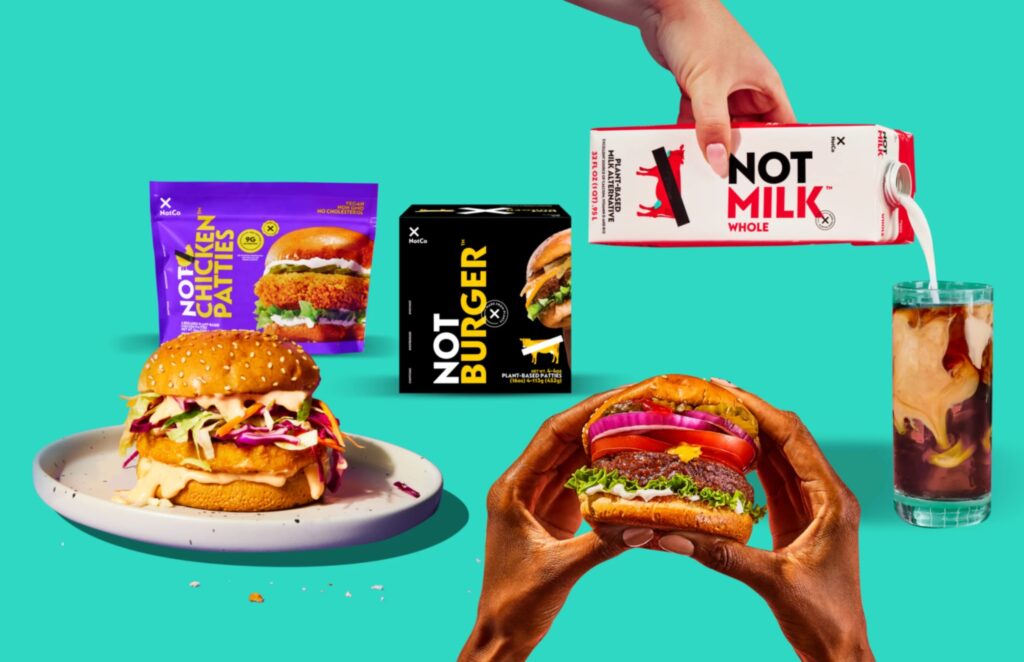
Chilean food tech startup NotCo, whose products are built on its AI platform Guiseppe, has developed a generative AI model to create new flavour and fragrance formulations.
Czech company Bene Meat Technologies, which makes cultivated meat for pets, has created a cell bank that already has over 5,000 samples stored.

Two years after the initiative’s launch, Ferments du Futur has opened an innovation centre in the Paris-Saclay science and innovation cluster. The public-private scheme is an accelerator for fermentation startups.
Spanish vegan egg maker Uobo has secured a six-figure sum in its latest funding round, and partnered with fellow Catalan startup Cubiq Foods – which makes animal-free functional fats – to develop a new egg alternative for B2B clients.

In Japan, the Ministry of Agriculture, Forestry and Fisheries has issued several grants under the Small/Startup Business Innovation Research Program. Alternative protein startups include Agro Ludens ($7.1M), Deats Food Planning ($4.5M), and Fermenstation ($3.4M).
ProVeg South Africa has been working with the Western Cape government to raise awareness about food insecurity during the National Nutrition Week (October 9 to 15), distributing 2,000 educational booklet to youngsters, hosting events for locals, and handing out 2,500 vegan nuggets from Fry Family Food in Uniondale.
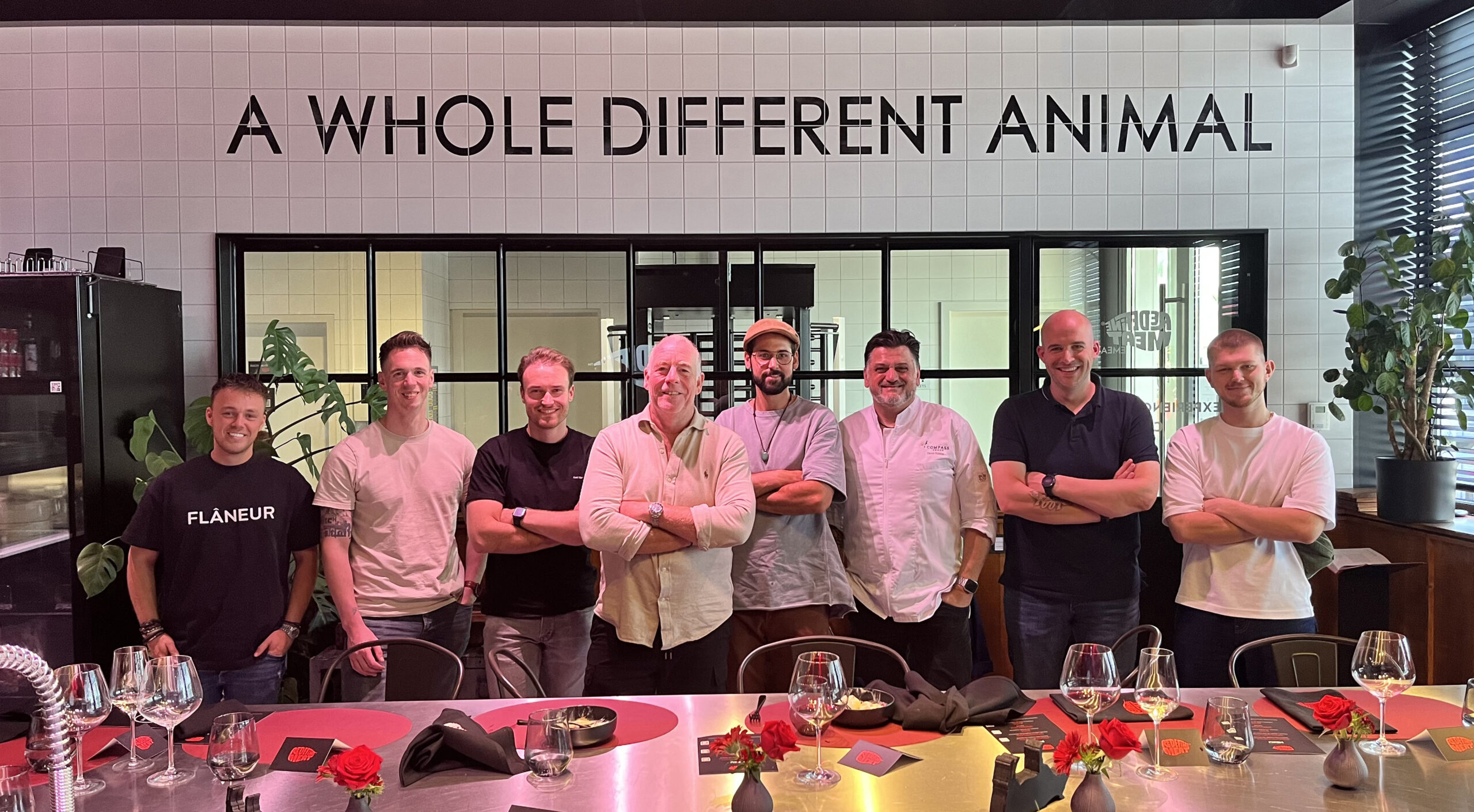
Israeli 3D-printed meat maker Redefine Meat has won plaudits from Dutch chefs after hosting them at its new visitor centre in the production facility in Best, with the startup’s R&D team taking in the feedback to improve upon its New-Meat range.
US biotech manufacturing firm Liberation Labs, which specialises in precision fermentation, has received a further $12M from cellular agriculture investor Agronomics. It brings its total equity-linked funding to $35.5M, which will be joined by its upcoming Series A round.
The APAC Society of Cellular Agriculture has signed an MoU with Temasek Polytechnic to create its first student chapter, which will foster a community of students across Asia-Pacific looking to shape the future of food through cultivated meat and seafood.
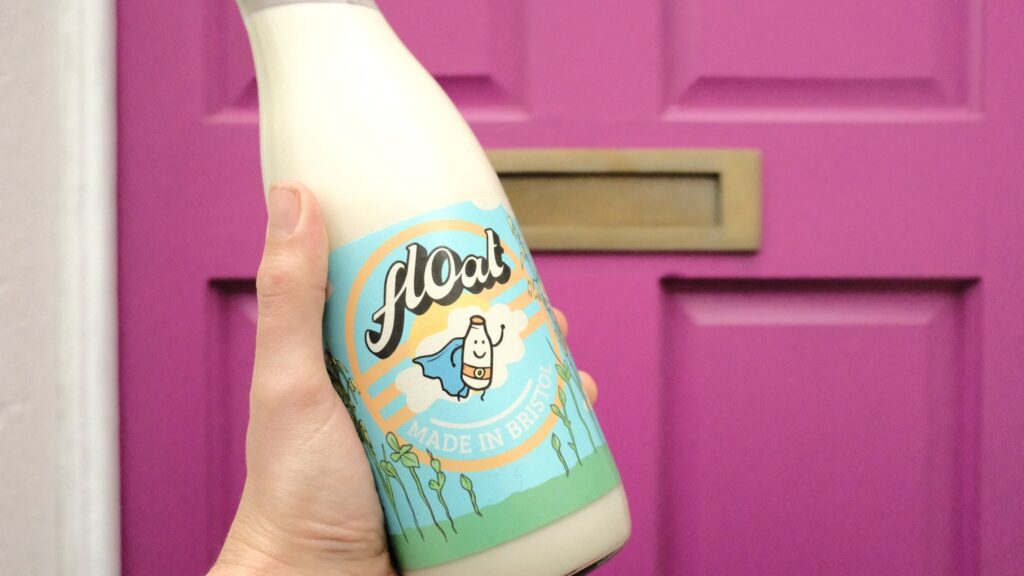
FoodBev Media has announced the winners of its 2024 World Plant-Based Innovation Awards, which include Float‘s adaptogenic oat milk, Elmhurst 1925‘s sour cream, Arla‘s JÖRÐ barista oat milk, The Mushroom Meat Co, and LOVO chocolate.
Speaking of awards, Australian cultivated meat startup Vow, which has been selling its cultivated quail since receiving clearance in Singapore this April, has won the Future Ready Award in the Australian Financial Review‘s 2024 BOSS Most Innovative Companies category.

Finally, also in Australia, Sydney will host the next edition of the AltProteins Conference in October 2025, following a three-year stint in Melbourne.
Check out last week’s Future Food Quick Bites.
The post Future Food Quick Bites: Cultivated Chicken Tasting, Oat Milk Liqueur & Alt-Protein Awards appeared first on Green Queen.
This post was originally published on Green Queen.
Three years ago, Erin Primer had an idea for a new summer program for her school district: She wanted students to learn about where their food comes from. Primer, who has worked in student nutrition within California’s public school system for 10 years, applied for grant funding from the state to kick off the curriculum, and got it. Students planted cilantro in a garden tower, met a local organic farmer who grows red lentils, and learned about corn. “Many kids didn’t know that corn grew in a really tall plant,” said Primer. “They didn’t know that it had a husk.”
The curriculum, focused on bringing the farm into the school, had an effect beyond the classroom: Primer found that, after learning about and planting ingredients that they then used to make simple meals like veggie burgers, students were excited to try new foods and flavors in the lunchroom. One crowd pleaser happened to be totally vegan: a red lentil dal served with coconut rice.
“We have had students tell us that this is the best dish they’ve ever had in school food. To me, I was floored to hear this,” said Primer, who leads student nutrition for the San Luis Coastal district on California’s central coast, meaning she develops and ultimately decides on what goes on all school food menus. “It really builds respect into our food system. So not only are they more inclined to eat it, they’re also less inclined to waste it. They’re more inclined to eat all of it.”
Primer’s summer program, which the district is now considering making a permanent part of the school calendar, was not intended to inspire students to embrace plant-based cooking. But that was one of the things that happened — and it’s happening in different forms across California.

A recent report shows that the number of schools in California serving vegan meals has skyrocketed over the past five years. Although experts say this growth is partly a reflection of demand from students and parents, they also credit several California state programs that are helping school districts access more local produce and prepare fresh, plant-based meals on-site.
Growing meat for human consumption takes a tremendous toll on both the climate and the environment; the U.N. Food and Agriculture Organization estimates that livestock production contributes 12 percent of global greenhouse gas emissions. Specifically, cattle and other ruminants are a huge source of methane. Animal agriculture is also extremely resource-intensive, using up tremendous amounts of water and land. Reducing the global demand for meat and dairy, especially in high-income countries, is an effective way to lower greenhouse gas emissions and mitigate the rate of global warming.
The climate benefits of eating less meat are one reason that school districts across the country have introduced more vegetarian — and to a lesser degree, vegan — lunch options. In 2009, Baltimore City Public Schools removed meat from its school lunch menus on Mondays, part of the Meatless Mondays campaign. A decade later, New York City Public Schools, the nation’s largest school district, did the same. In recent years, vegan initiatives have built upon the success of Meatless Mondays, like Mayor Eric Adams’ “Plant-Powered Fridays” program in New York City.
But California, the state that first put vegetarianism on the map in the early 20th century, has been leading the country on plant-based school lunch. “California is always ahead of the curve, and we’ve been eating plant-based or plant-forward for many years — this is not a new concept in our state,” said Primer. A recent report from the environmental nonprofit Friends of the Earth found that among California’s 25 largest school districts, more than half — 56 percent — of middle and high school menus now have daily vegan options, a significant jump compared to 36 percent in 2019. Meanwhile, the percentage of elementary districts offering weekly vegan options increased from 16 percent to 60 percent over the last five years.
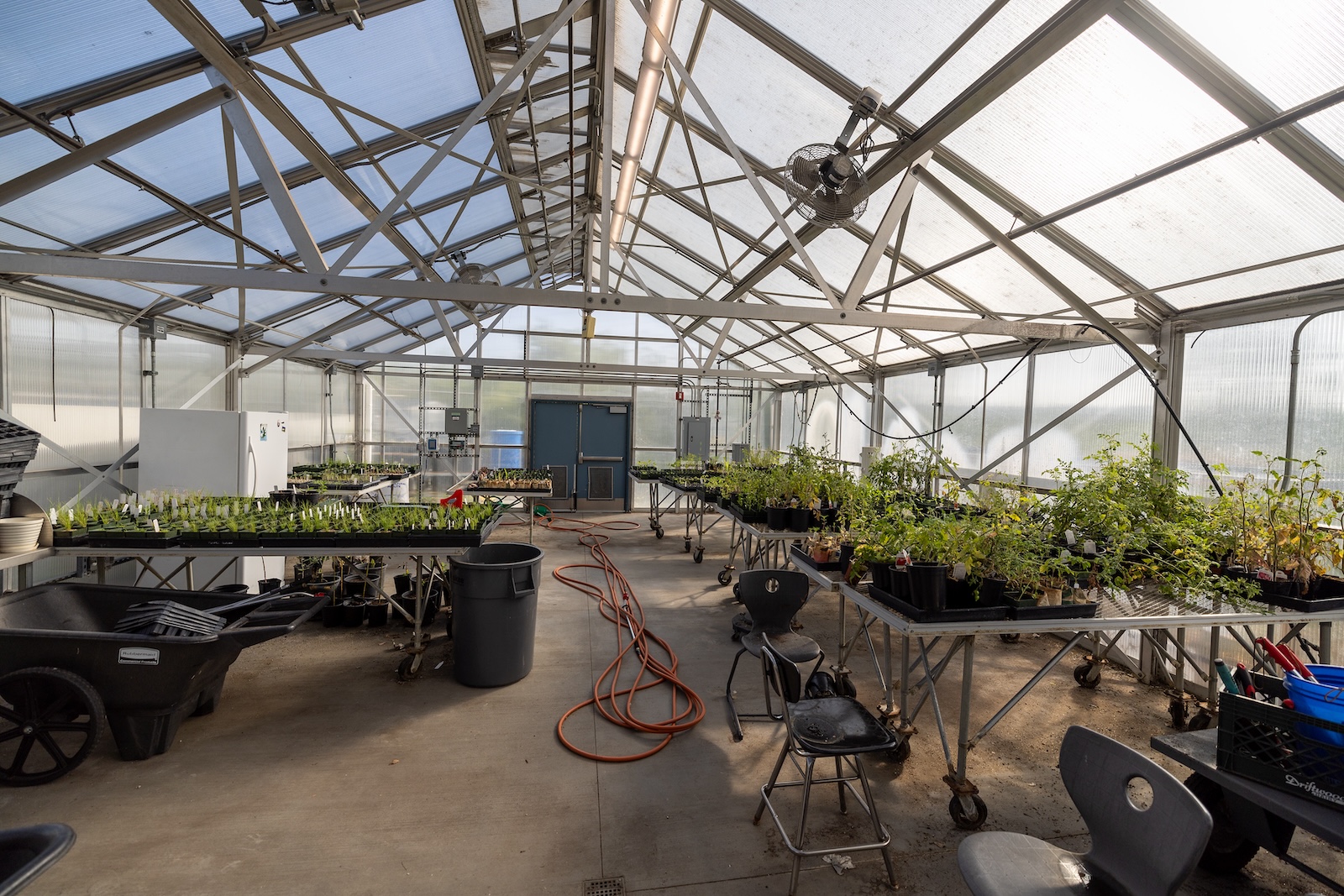
Student nutrition directors like Primer say the foundation that allows schools to experiment with new recipes is California’s universal free lunch program. She notes that, when school lunch is free, students are more likely to actually try and enjoy it: “Free food plus good food equals a participation meal increase every time.”
Nora Stewart, the author of the Friends of the Earth report, says the recent increase in vegan school lunch options has also been in response to a growing demand for less meat and dairy in cafeterias from climate-conscious students. “We’re seeing a lot of interest from students and parents to have more plant-based [meals] as a way to really help curb greenhouse gas emissions,” she said. A majority of Gen Zers — 79 percent — say they would eat meatless at least once or twice a week, according to research conducted by Aramark, a company provides food services to school districts and universities, among other clients. And the food-service company that recently introduced an all-vegetarian menu in the San Francisco Unified School District credits students with having “led the way” in asking for less meat in their cafeterias. The menu includes four vegan options: an edamame teriyaki bowl, a bean burrito bowl, a taco bowl with a pea-based meat alternative, and marinara pasta.
Stewart theorizes that school nutrition directors are also increasingly aware of other benefits to serving vegan meals. “A lot of school districts are recognizing that they can integrate more culturally diverse options with more plant-based meals,” said Stewart. In the last five years, the nonprofit found, California school districts have added 41 new vegan dishes to their menus, including chana masala bowls, vegan tamales, and falafel wraps. Dairy-free meals also benefit lactose-intolerant students, who are more likely to be students of color.
Still, vegan meals are hardly the default in California cafeterias, and in many places, they’re unheard of. Out of the 25 largest school districts in the state, only three elementary districts offer daily vegan options, the same number as did in 2019. According to Friends of the Earth, a fourth of the California school districts they reviewed offer no plant-based meal options; in another fourth, the only vegan option for students is a peanut butter and jelly sandwich. “I was surprised to see that,” said Stewart.
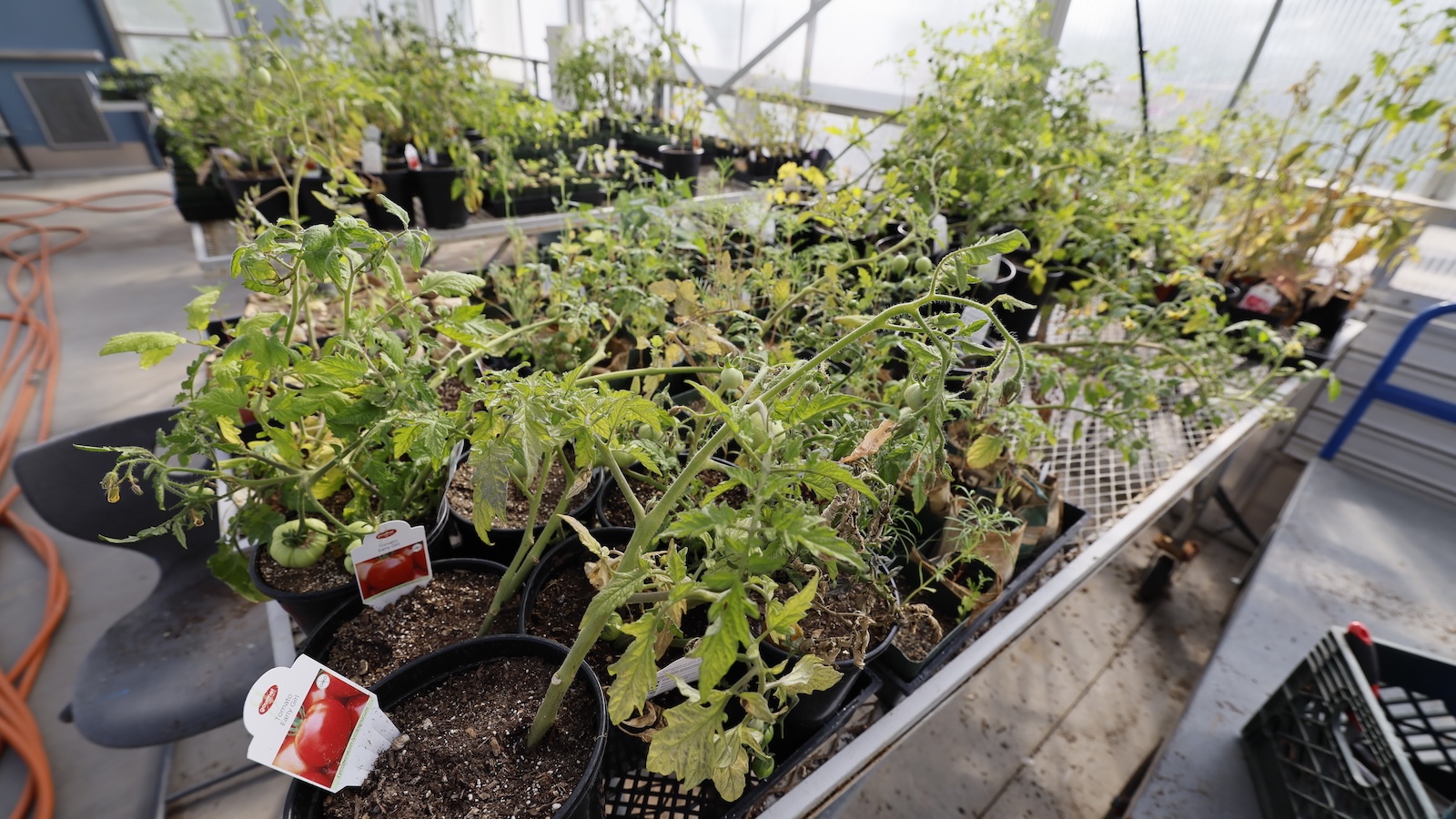
Making school lunches without animal products isn’t just a question of ingredients. It’s also a question of knowledge and resources — and the California legislature has created a number of programs in recent years that aim to get those tools to schools that need them.
In 2022, the state put $600 million toward its Kitchen Infrastructure and Training Funds program, which offers funding to schools to upgrade their kitchen equipment and train staff. This kind of leveling up allows kitchen staff to better incorporate “scratch cooking” — essentially, preparing meals on-site from fresh ingredients — into their operations. (The standard in school lunch sometimes is jokingly referred to as “cooking with a box cutter,” as in heating up and serving premade meals that come delivered in a box.) Another state program, the $100 million School Food Best Practices Funds, gives schools money to purchase more locally grown food. And the Farm to School incubator grant program has awarded about $86 million since 2021 to allow schools to develop programming focused on climate-smart or organic agriculture.
Although only the School Food Best Practices program explicitly incentivizes schools to choose plant-based foods, Stewart credits all of them with helping schools increase their vegan options. Primer said the Farm to School program — which provided the funding to develop her school district’s farming curriculum in its first two years — has driven new recipe development and testing.
All three state programs are set to run out of money by the end of the 2024-2025 school year. Nick Anicich is the program manager for Farm to School, which is run out of the state Office of Farm to Fork. (“That’s a real thing that exists in California,” he likes to say.) He says when state benefits expire, it’s up to schools to see how to further advance the things they’ve learned. “We’ll see how schools continue to innovate and implement these initiatives with their other resources,” said Anicich. Stewart says California has set “a powerful example” by bettering the quality and sustainability of its school lunch, “showing what’s possible nationwide.”
One takeaway Primer has had from the program is to reframe food that’s better for the planet as an expansive experience, one with more flavor and more depth, rather than a restrictive one — one without meat. Both ideas can be true, but one seems to get more students excited.
“That has been a really important focus for us. We want [to serve] food that is just so good, everybody wants to eat it,” Primer said. “Whether or not it has meat in it is almost secondary.”
This story was originally published by Grist with the headline More schools than ever are serving vegan meals in California. Here’s how they did it. on Oct 15, 2024.
This content originally appeared on Grist and was authored by Frida Garza.
This post was originally published on Radio Free.

The first thing I did when I got to New York City was order a burrito.
It was 2pm, so naturally I was craving breakfast. Chorizo from Abbot’s Butcher, a scramble from Zero Egg, nacho cheese from WayFare, some hash browns, some spinach, some avo.
It felt like the Avengers of vegan food, if you will, born out of a truly innovative concept by Nil Zacharias. He is the founder and CEO of Plantega, a company turning bodegas – etched in the fabric of New York City – vegan-friendly.
btterPlantega partners with vegan food producers across the country – from plant-based meat makers like Beyond Meat, Konscious Foods, Umaro, and of course, Abbot’s, to non-dairy innovators such as Miyoko’s Creamery and Follow Your Heart – and uses their products to veganise bodega classics.
Instead of opening brick-and-mortar stores, it equips the city’s existing bodegas with a deli menu that turns a combination of these offerings into NYC favourites – think butter rolls, chopped cheeses, Philly cheese subs, BECs, and breakfast burritos.
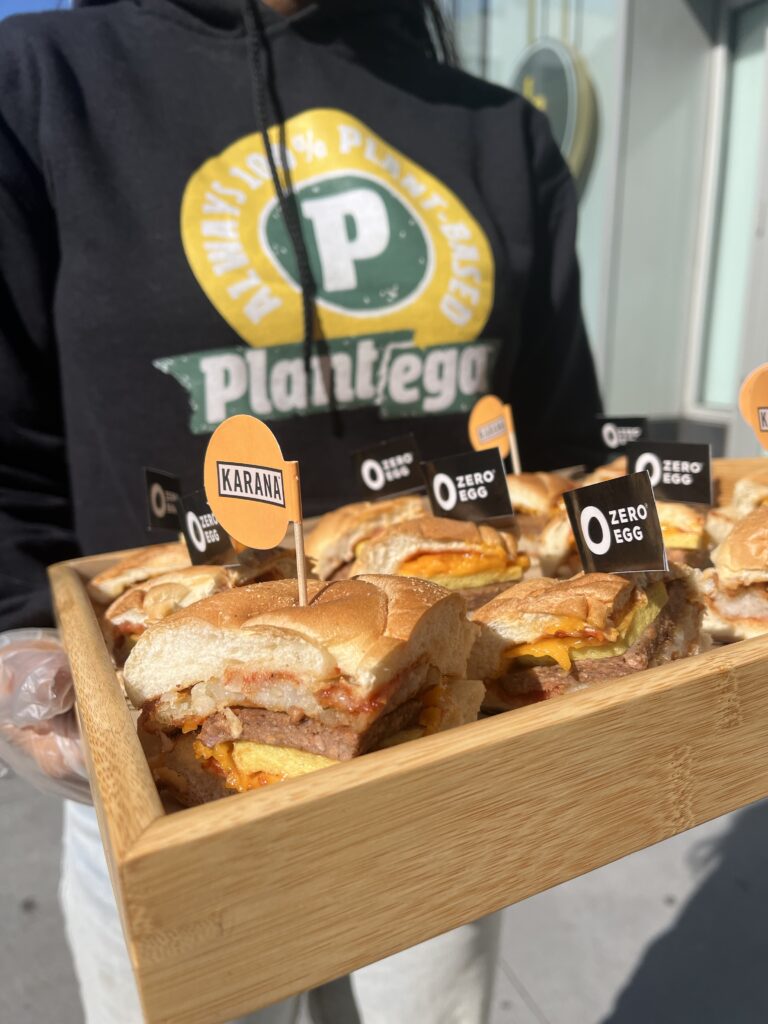
There are more than 13,000 bodegas in the Big Apple. With many open 24 hours or until late, Zacharias calls them a “lifeline that all New Yorkers depend on”. Mostly immigrant-owned, these independent businesses outnumber grocery stores in several neighbourhoods, and whip up deli classics with not much more than a grill, a fryer, and a deli counter.
Zacharias, a former ad exec and marketing consultant, started Plantega as a pilot programme in three bodegas in November 2020. This was the height of the pandemic, and bodegas’ status as essential businesses became ever more important as restaurants closed. The trial concept featured the hybrid foodservice and retail approach, with branded fridges that stocked the plant-based products, and a deli making use of them in a nostalgic yet novel way.
“We learned very quickly that people loved the sandwiches, and the retail products were a harder sell because of a range of factors, from the shopping habits of consumers to space constraints in the stores,” Zacharias tells Green Queen, “So we abandoned that approach fairly quickly when we officially launched the company later in 2021.”

For Zacharias, making bodegas inclusive to vegans wasn’t just because there was an inherent lack of such options, but also because he wanted to show that this could retain the cultural meaning of a dish, just with a change of ingredients.
“And I think it really resonated with people because we did not try to do it in a gimmicky way that hijacked the culture,” he says. “Instead, we worked from the ground up to empower the bodega owners to buy into our brand and approach and get their customers to embrace their favourite sandwiches, just made better – with better-quality ingredients, and better health and environmental outcomes.”
How receptive were bodega owners initially? “Our first conversations with bodegas were pretty simple. We asked them if their consumers were asking for more vegan or vegetarian options. The answer was always yes,” he says. “We then followed up with a question about what the plant-based options were on their menu. And they would almost always point to one or two options that usually included a bland veggie sandwich of sorts.”
This is when the Plantega team would show bodega owners the vegan menu, asking them if they’d like to see something like that in their store. “And then it really came down to explaining to them how they would make money doing it and how Plantega functioned as the easy button to add plant-based menu items in their bodegas,” explains Zacharias.
“Once they tasted the sandwiches and grasped what the model really meant, and how Plantega made this very seamless and easy for them, our concept really just sold itself,” he adds.
That doesn’t mean there wasn’t any pushback initially. “In the first year, we really had to work hard to convince bodegas to carry our menu and partner with us,” he recalls. But this was more down to the fact that they wanted a discount on their first order so they could mitigate upfront costs and risks, rather than the fact that bodega owners doubted the concept’s value or demand.
“Because our model involves selling an entirely plant-based menu under the Plantega brand name alongside their regular deli menu, in some cases, we did receive pushback from deli cooks during the first few weeks,” says Zacharias.
“They were usually not happy about having to get trained on a whole new menu and use the plant-based ingredients we supplied for it. Plantega did add a new layer of complexity to their jobs when an order came in for a plant-based sandwich, and not every cook was excited about the extra work.”
Customers, on the contrary, ate it all up. “Most were intrigued by the attractive new menu added at the deli. And the reason we probably faced little to no pushback from them is that they still had the choice to pick anything they wanted from the regular deli menu,” he points out.
“We weren’t forcing them to make a change, but were doing our best with our branding (via posters and attractive signage, as well as strategic placement of our menu) to nudge customers to try Plantega.”
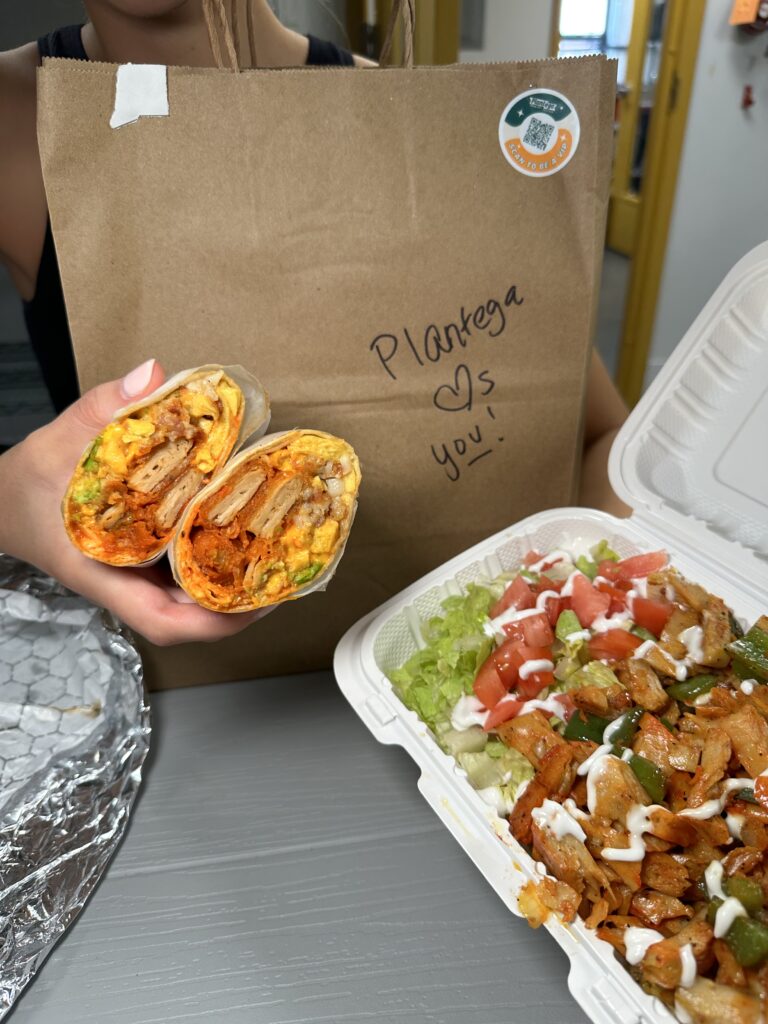
To take the load of veganising bodegas’ bread and butter items (literally) off of their owners, Zacharias and his team develop the entire plant-based menu themselves, drawing inspiration from NYC deli sandwiches and creating new dishes to showcase the plant-based ingredients as best they can.
“Our in-store menu includes 14 items, and our delivery menus feature 40+ items,” says Zacharias. Plantega supplies all the products to bodegas, organises them on their counters, trains their cooks, sets up the menus and signage, performs quality checks, and markets the stores. It also processes future orders once bodegas sell out of products, and onboards them onto delivery apps like Uber Eats, DoorDash, and Grubhub.
Due to the nature of this model, “the menu has to be consistent at every touchpoint”, says Zacharias. Plantega is currently in 56 bodegas across the city’s five boroughs, and recently opened a flagship kitchen to offer direct delivery and open its model up to corporate catering and large events.
“Because we are so widespread across the city, our primary criteria now is finding a store that’s in a neighbourhood that doesn’t have a Plantega location,” says Zacharias.

“We then analyse whether the store has a successful deli business, as well as other factors like storage space for our products, cooperative cooks that are willing to get trained by us, a clean and professional operation, and most importantly, a store owner who understands the nature of our partnership and is committed to working with us to make plant-based food more accessible to their customers.”
So how does the business make money? Plantega takes supply fees and distribution commissions from the bodegas, participation fees from the brands that offer their product, and revenue from delivery sales via bodegas. It will now also generate revenue from the new catering kitchen.
Of course, not everything has worked. The fridges that were part of the pilot in 2020 are now gone, and the menu has been updated to better reflect what its target consumers want.
“One of the most important lessons we learned pretty early in our journey was that trying to educate consumers about the health and environmental benefits of plant-based food as a way to convince them to choose something from our menu didn’t work,” says Zacharias, echoing a rhetoric floated by leading industry executives.
“On the other hand, creating a fun, uplifting, and approachable brand that gets people excited about our food made us a recognised and loved plant-based brand across New York City.”
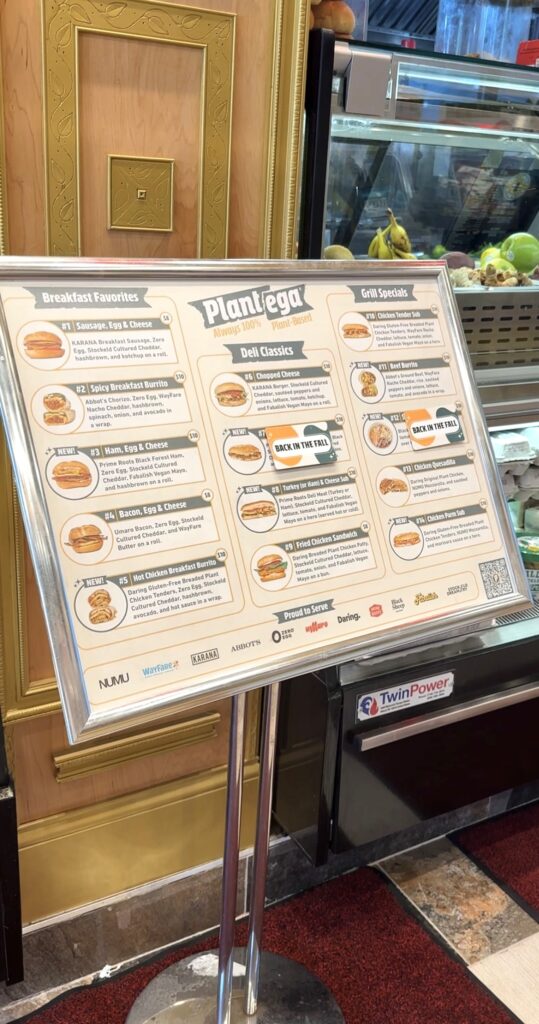
Plant-based meat – and the vegan sector in general – has had it tough over the last two years. Sales have dropped off, as has venture capital, while consumers have expressed dissatisfaction with overprocessing, high markups, and the taste of meat analogues.
Retail sales dropped by 12% in 2023, but in foodservice, the decline was only 6%. Consumers tend to be more receptive to plant-based analogues in restaurants, where the possibility of cooking a vegan burger badly is much lower than at home.
“I think the industry has a trust and discoverability challenge that can be alleviated if we get it right in foodservice,” notes Zacharias. “Foodservice has some inherent advantages that make it more accessible to new consumers. Here, plant-based products are presented in a familiar environment and context, which reduces the barrier to trial.
“Professional cooks get to showcase the products in the way they are intended to meet the needs and specific tastes of their customers. This helps drive consumer trial in a convenient way and can go a long way in making a great first impression about new products, and can change any preconceived notions consumers have of the taste and texture, as well as the functionality of the products.”
He adds: “Working with a range of brands and showcasing them under our platform has been a big part of the Plantega model since we launched.” By partnering with Plantega, these companies open up new distribution and trial opportunities via field marketing activations.
“We’ve not only sourced our ingredients from multiple brands, but have also been intentionally brand-forward in our branding and marketing,” says Zacharias. On the menu, you’ll see the company each product is from, which is complemented by signage around the store sporting brand logos.
“We also host various sampling and community events in NYC throughout the year to showcase our menu items and specifically talk to consumers about the ingredients used and the brands we partner with. Lastly, we create content for our social media channels that feature our brand partners, along with consumer reactions and feedback on their products.”
Zacharias reveals that the bestselling dish on the menu is the chopped cheese sandwich, which pairs the Karana burger with Cultured Cheddar cheese from Stockeld Dreamery. Other popular items include a BEC with Umaro bacon, Zero Egg, and Stockeld Cheddar, turkey/ham cheese subs featuring Prime Roots’s mycelium meats, and the aforementioned spicy breakfast burrito.
Working with so many brands at once may seem challenging, but Zacharias says that hasn’t been the case, because each of the 11 companies brings something different. “They understand that Plantega is a unique platform in a key US market that features their products in a complementary way, unlike any other sales channel,” he says.
“We are driving sales, but we’re also consistently connecting with new consumers who are passionate about our iconic NYC Deli-style sandwiches and discover new and emerging brands as a result.”
“Bodegas are as much an iconic symbol of New York City as our vibrant parks, subway system, or skyscrapers,” says Zacharias. “In a city where change is the only constant, bodegas have stood the test of time. They’ve witnessed neighbourhoods transform, seen trends come and go, yet they remain steadfast, with deli counters serving up comfort wrapped in wax paper.”
And despite soaring real-estate prices driving some bodegas out of business or forcing owners to pivot to other kinds of retail establishments, he believes “there is no sign that this cultural icon of the city is going extinct anytime soon”.
Veganism isn’t going anywhere either, especially in New York City. Since food makes up a fifth of its greenhouse gas emissions, the local government is working to reduce emissions by a third by 2030. All 11 public hospitals, for example, now offer plant-based meals as the default choice, a campaign that has witnessed great success. The Plant-Powered Fridays campaign at public schools, meanwhile, has led to a 28% reduction in emissions
It’s part of embattled mayor Eric Adams’s drive to green up the city. He follows a plant-forward diet himself, and celebrated his mayoral win in 2021 at a Plantega location. Across the US, 1,400 mayors have signed a resolution to promote a shift to plant-based diets, taking a leaf out of Adams’s playbook.

The NYC mayor also kickstarted the Plant-Powered Carbon Challenge earlier this year, with non-profit Greener by Default helping partners track emissions and share best practices on designing plant-forward menus. Challenging businesses to lower food-related emissions by 25% by the end of the decade, it has been taken up by Columbia University, The Rockefeller Foundation, catering giant Aramark, and the US Open, among others.
“It is incredible to see the NYC Mayor’s Office of Food Policy make plant-forward eating such a key pillar in their strategy to increase food security, promote access to and consumption of healthy foods, and support economic opportunity, environmental sustainability, and equity in the food system,” says Zacharias.
“I strongly believe that shifting towards a predominantly plant-based food system can have a profoundly positive impact, and I hope what’s happening in New York City encourages other local governments to take similar steps.”
Plantega’s evolution over the last few years has solidified Zacharias’s belief that consumers still want plant-based food, as long as it’s “fun, familiar, and satisfying”.
Among its major growth drivers now is the Plantega Kitchen & Catering division, which he describes as “highly tech-enabled”. It has been optimised for local D2C deliveries, as well as citywide catering clients looking for better vegan options for all meal types.
“Recognising that a significant number of meals in New York City are consumed within private institutions such as corporate offices and event venues, Plantega sees a tremendous opportunity to amplify our impact,” notes Zacharias.
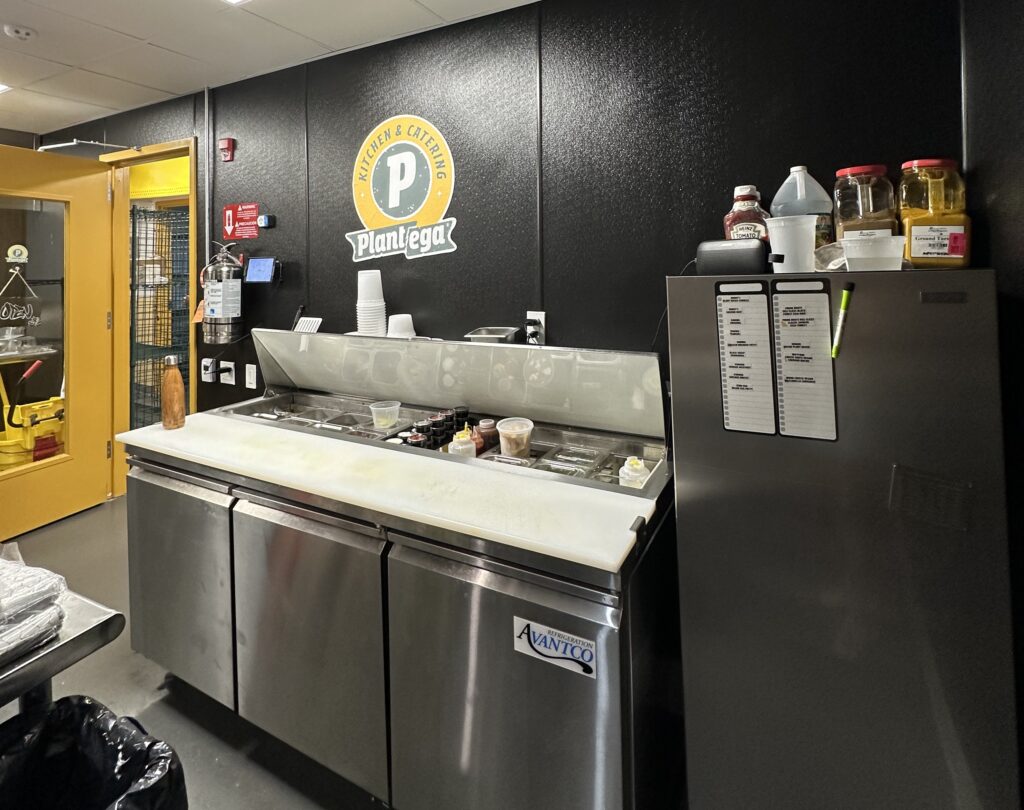
“This launch is timely as the return-to-office trend drives a catering boom in workplaces, and the climate crisis makes it imperative for organisations to reduce their food-based carbon emissions,” he adds. Perhaps most notably, he says the kitchen will “serve as a blueprint for our plan to scale the Plantega brand and operations outside of New York City.”
That’s part of the business’s five-year plan. “I foresee quick, comforting New York Deli-style sandwiches becoming a national phenomenon, and Plantega – with our authentic brand story having started in the deli counters of bodegas around New York City – being the brand that makes it happen,” outlines Zacharias.
“Plantega’s Chopped Cheese, Bacon, Egg & Cheese and other sandwiches will be sold in multiple cities across the US, through our own kitchens and via licencing partnerships,” he adds. “People will eat our food primarily because they love how it tastes and how the Plantega brand makes them feel. The fact that everything is plant-based will just be an attribute that makes it even better.”
The post Plantega’s Nil Zacharias: ‘I See Our Sandwiches Becoming A National Phenomenon’ appeared first on Green Queen.
This post was originally published on Green Queen.
What Happens When People Find Out They’re Eating ‘Owl’ Wings?
What’s the Difference Between Owl and Chicken Wings? These People Found Out
These People Tried Free Wings—Only to Find Out There’s a Catch
VIDEO: Find Out Why These Free Wings Had Foodies Flying Off the Handle
Free Wings Giveaway Takes a Dark Turn When People Find Out Who They’re Eating
‘That’s Gross’: Watch People’s Reactions to This Twisted Wing Giveaway
It’s a hoot! Musician Oli Frost joined PETA U.K. to turn the tables on chicken wing–eaters. Watch now.
What’s making people spit out the free wings they tried? Musician Oli Frost joins PETA U.K. to help the public think twice about who they’re eating.
The post VIDEO: Find Out Why These Free Wings Had Foodies Flying Off the Handle appeared first on PETA.
This post was originally published on Animal Rights and Campaign News | PETA.

Do not ingest plant-based food… if you enjoy the taste of average to mediocre food.
That is the call to action of a new, first-of-its-kind ad campaign backed by some of the leading companies in the US vegan sector.
The marketing drive is coordinated by the Plant-Based Foods Association (PBFA), and aims to highlight the benefits of plant-based eating in a quirky, deliberately contradictory way.
Devised with marketing agency AKQA Bloom, the first activation is called ‘Plant-Based May Cause’, featuring a 60-second spot with a 10,000-word leaflet that was present all over Climate Week NYC last month. The fast-paced, playful narration challenges the misconceptions and underlines the benefits – some obvious, some ‘unexpected’ – linked to a vegan diet.
It’s the first time leading brands in the industry have joined forces for a commercial campaign at this scale, with partners including The Kraft Heinz NotCo, Beyond Meat, Impossible Foods, TiNDLE Foods, Bel Brands, Daiya, Prime Roots, Mellody, Stockeld Dreamery, Armores Fresh, Milkadamia, and more.
“For years, the Big Meat and Dairy industries have been planting misinformation, so we’ve chosen to plant joy and deliciousness instead,” said AKQA Bloom co-founder and executive creative director Jean Zamprogno. “A better future for us and our planet begins with a shift in consumer behaviour, and no industry is better than ours to lead the way.”

The campaign ad comprises footage from a branded food truck the PBFA organised with chef Nina Curtis and the 15 companies at Climate Week NYC, where New Yorkers were offered free samples of plant-based dishes.
The video notes that eating plant-based may cause several effects, narrated in a way that feigns negativity. But these implications include vegan hot dogs causing you to love sausages more than your dog, non-dairy cheese making you want to only eat cheese for the rest of your life, and plant-based nuggets having no effect whatsoever – because “you’ll never realise they’re plant-based”.
The leaflet, attached to products from participating companies at Climate Week NYC as well as in grocery stores, is a seven-point guide underscoring the impact of eating vegan food. Some of these points are earnest, the others just fun.
For example, the leaflet lists “trouble sharing shareables” and “a crowded home at all times” as positive outcomes, as well as “severe urges to grill every day” and increased visits from your mother-in-law as side effects. But it also explains the true environmental and social benefits of plant-based food, from lower water consumption, land use, greenhouse gas emissions, and exposure to contaminants, to greater food access, better soil health, and a more robust local economy.

The guide also features several recipes to specifically highlight the fact that preparing vegan food is “actually very similar” to dishes with conventional meat and dairy. These include breakfast tacos, mozzarella sticks, mac and cheese, and chia pudding.
Doubling down on the tongue-in-cheek yet impactful messaging, one of the lines in a section outlining the best places to eat vegan food reads: “Try having plant-based yogurt in your apartment, which, if it’s in NYC, is already so tiny that it literally has a tiny carbon footprint. So, if you’re enjoying plant-based food in that ridiculously small kitchen/bedroom/living room/dining room, you’ll be doing double duty when it comes to reducing land usage.”
The Plant-Based May Cause campaign also has radio spots, while the leaflet will be handed out digitally and physically. The food truck is serving as a mobile platform to educate people about the health and climate benefits of plant-based food.
“This campaign marks a key moment for our industry. By coming together, for the very first time, as a diverse coalition of brands across 20+ plant-based food categories, we are engaging and inspiring a growing community of consumers around a singular marketing platform,” said PBFA CEO Rachel Dreskin.
“By collaborating with AKQA Bloom and our members, we’re demonstrating how strategic, unified messaging can broaden the industry’s influence and realise its potential and myriad of benefits.”
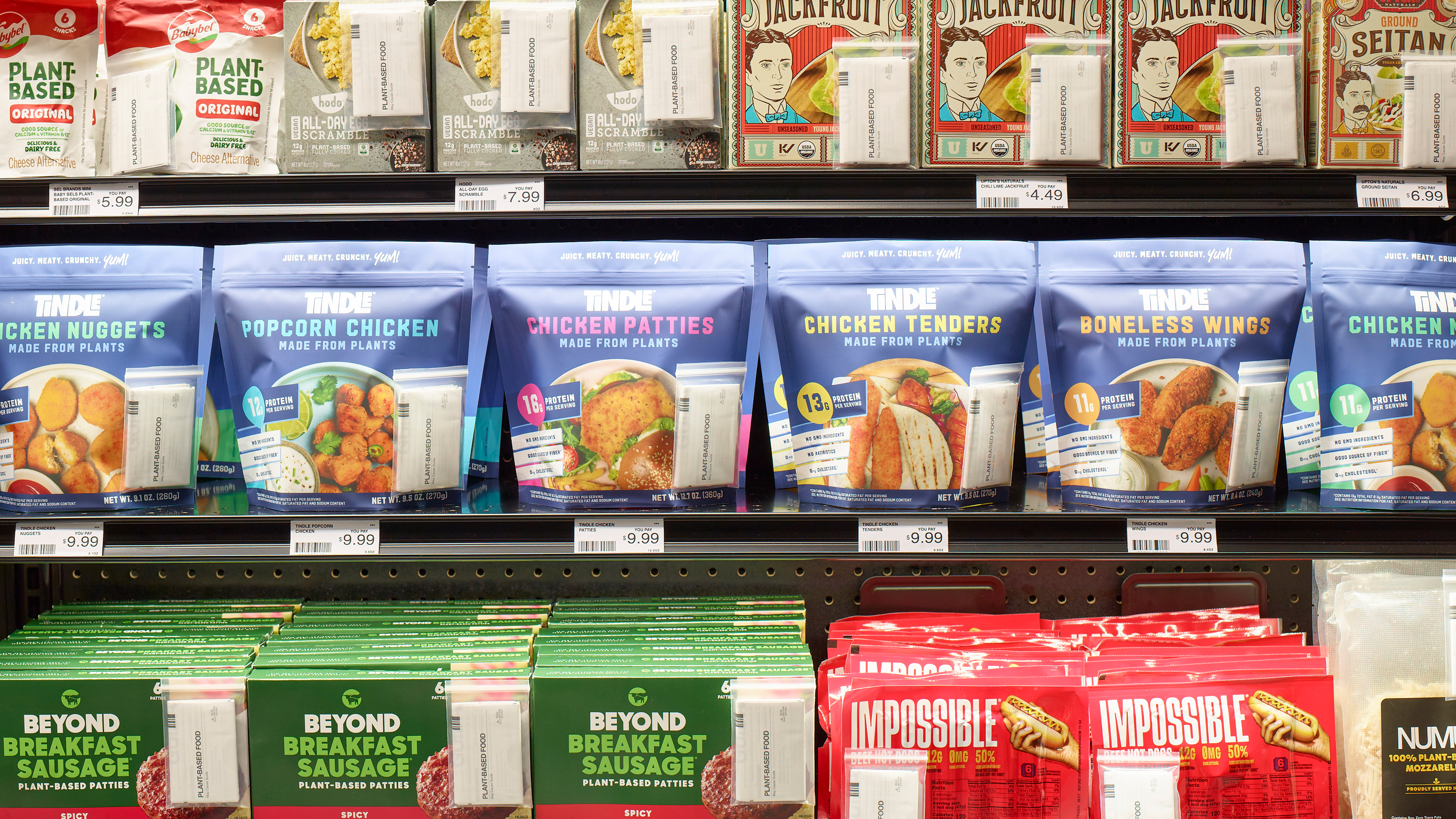
Alternative protein companies have been trying to collaborate on a joint marketing drive for a while now. Last year, it was reported that vegan businesses were hoping to form a coalition in the style of Got Milk? and The Incredible Edible Egg – two of the most successful consumer campaigns in modern US history – although some marketing experts expressed doubt over whether this could actually materialise.
Impossible Foods was part of the effort, with CEO Peter McGuinness saying there’s “a collective opportunity to extol the benefits of the category”, but underlining the difficulties of coordinating the coalition at a time of upheaval in the plant-based sector.
While the PBFA’s campaign isn’t a result of this effort, it’s still a strong signal of togetherness in the industry. This is important considering that meat analogue sales dipped by 12% last year, and investments were down by 24% – in 2024, funding has become an even bigger challenge for plant-based startups.
Elsewhere, some are working on a vegan checkoff programme, a take on the meat and dairy industry approach that collects government-backed funds from livestock producers to fund promotional campaigns.
UK-based Vegan Food Group’s Matthew Glover (who is also the co-founder of Veganuary) and Indy Kaur, founder of vegan consultancy firm Plant Futures, are spearheading this initiative. “We are looking to level up with this, consolidate funding and create a campaign which can fairly compete and give consumers a reason to choose to eat plants and not animals,” Glover told Green Queen in February.
The post Impossible Foods, Beyond Meat & Others Join Forces for First Plant-Based Industry Campaign appeared first on Green Queen.
This post was originally published on Green Queen.
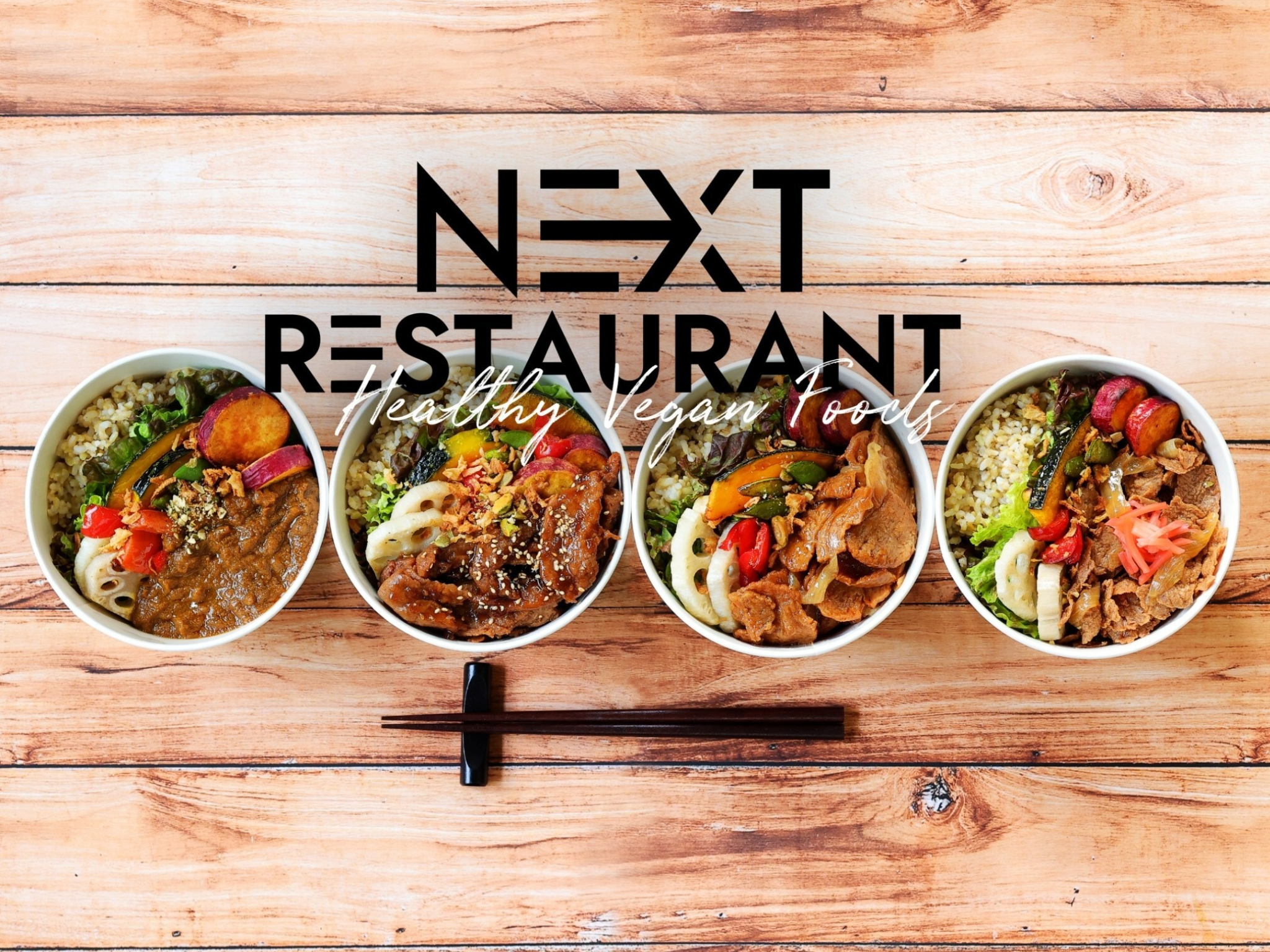
Fast-casual chain Wayback Burgers is going all-in on Asia’s hunger for plant proteins, establishing an all-vegan restaurant concept championing plant-based meat in Japan.
Wayback Burgers Asia, the Japanese master franchisee of the US hamburger chain, has opened Next Restaurant in Tokyo, which it describes as a first-of-its-kind concept in the city designed to overcome the ever-changing barriers of the foodservice sector.
The chain operates mainly as a takeaway and delivery site, with only limited seating for dine-in options. The restaurant operates a shared kitchen to prepare dishes from different restaurants, with visitors able to choose items from multiple menus at the same time.
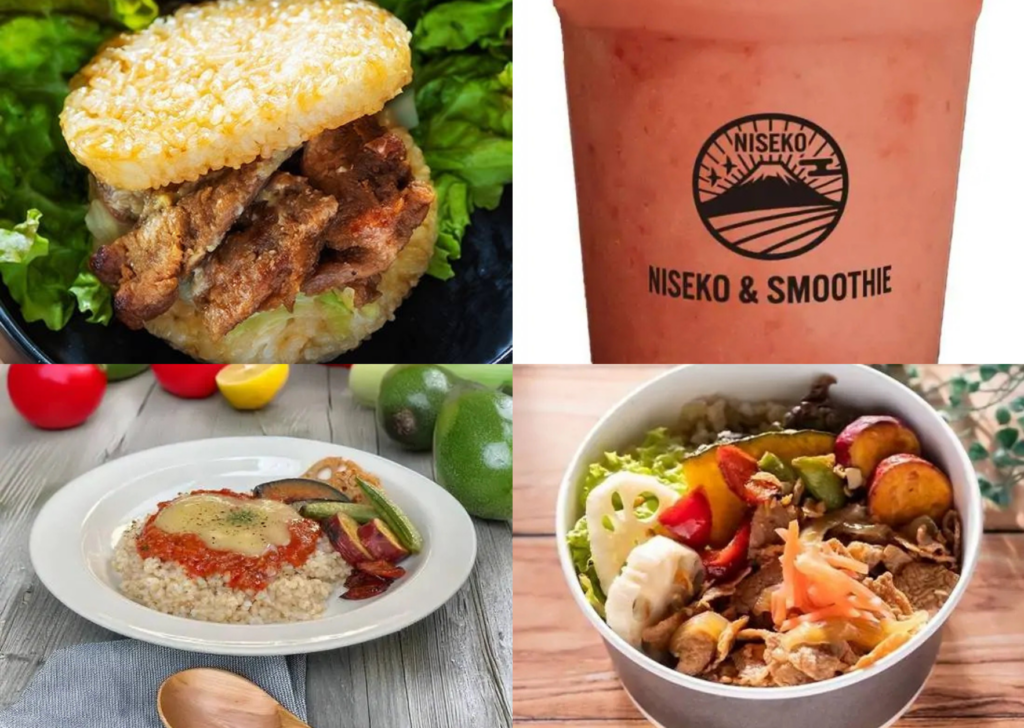
Wayback Burgers is a 33-year-old chain with over 170 locations in more than 20 countries using the franchise model. The chain has an extensive menu of beef burgers, chicken patties, shakes, and more, it does have a couple of meat-free options, using Impossible Foods and Gardenburger’s analogues.
The company opened its first site in Japan in 2022, but has now expanded its operations with the 100% plant-based concept of the Next Restaurant. “The traditional restaurants are now facing high procurement costs, labour shortages [and] general inflation, and consumers [continue to demand] high-quality, healthy foods while seeking better value for money,” said Wayback Burgers Asia CEO Koichi Ishizuka.
“Next Restaurant’s multi-brand restaurant model shares the same kitchen for better food preparation efficiency, and the pick-up and delivery concept allows us to operate within a small location.”
At Next Restaurant, customers can order from a range of vegan bento boxes, with options like foie gras kalbi, short ribs, pork and ginger, and a beef bowl. The eatery also keeps to its parent company’s hamburger legacy, with menu items like short rib or pork-ginger rice hamburgers, as well as a minced meat cutlet.
Moreover, Next Restaurant offers gluten-free pasta and doria (a type of rice gratin) tossed in tomato, bolognese or carbonara sauce, alongside entire menus for cheesesteaks and pizza (with flavours like tuna mayo, bulgogi, curry, and Margherita).
Wayback Burgers Asia has further created a vegan and gluten-free smoothie brand called Niseko & Smoothie, which uses fresh produce from farms in the town of Niseko, Hokkaido.
“It is franchisable and expandable to accommodate various existing restaurants’ menus,” Ishizuka said of the business model. “We are setting a new post-Covid restaurant business mode from Tokyo and expanding internationally.”

As Ishizuka alluded to, Wayback Burgers Asia is now exploring domestic and international franchise partnerships to take Next Restaurant global. Its second franchised eatery is set to open this fall too, in Kumamoto on Japan’s Kyushu island.
It comes amid a time of growing need for plant-based and other alternative proteins in the country. Japan has a net-zero target of 2050, with a shorter-term goal of cutting emissions by 46% by the end of the decade. But its current policies have been deemed “insufficient” by the Climate Action Tracker. And last year, research suggested that 45% of the country’s protein supply needs to come from alternative sources by 2060 if it’s to decarbonise.
A 2021 poll found that 53% of its population primarily viewed plant-based meat as having “low calorie and fat values compared to regular meat”, and just over a third (37%) viewed these products as “sustainable”. Around the same time, another survey found that less than 20% of consumers in Japan were aware of plant-based foods.
But things are changing now. This May, one study showed that three in four Japanese citizens had heard about or seen plant-based meat, with 21% displaying a broad understanding of these products. It also found that one in five respondents had tried meat analogues.
Showcasing long-term trends, a survey last year suggested that the number of vegans and vegetarians had gone from 4.8% in 2017 to 6.5% in 2023. Likewise, while only 16% of Japanese consumers were consciously lowering their meat consumption in 2017, this swelled to 26% last year.
These habits are part of the reason why alternative protein think tank the Good Food Institute opened its latest office in Japan earlier this month, noting the country’s ability to cater to Asia’s “skyrocketing meat demand in a more secure and sustainable way”.
Kimiko Hong-Mitsui, interim director of the office, told Green Queen: “Just as Japan developed and exported the cutting-edge technologies that brought solar power and other renewables to the world, we now have an opportunity to pioneer the next generation of alternative proteins – the food equivalents of clean energy.”
The post US Hamburger Chain Takes On Asia’s Plant Protein Appetite with All-Vegan Restaurant Brand in Japan appeared first on Green Queen.
This post was originally published on Green Queen.

9 Mins Read
In the next 25 years, the world will need 56% more food to feed its expanding population. But it has never faced a worse threat to food security than it does now, with current dietary patterns wreaking havoc on the planet, and climate change returning the favour in the worst possible ways.
Extreme weather events are decimating crop health, at a time when one in 10 people are undernourished. At the rate we’re going, the food system is simply not sustainable enough, either for a population that will be approaching 10 billion by mid-century, or for the planet it inhabits.
This is because the food system alone produces a third of all greenhouse gases, takes up 70% of the world’s freshwater, and is responsible for 80% of global deforestation. Agriculture also occupies nearly half of all habitable land – but 80% of this is attributable to livestock, which only accounts for 17% of our calorie supply, and 38% of protein consumption.
It’s why many companies are hoping to reshape the food system with future-facing, planet-friendly options, whether it’s plant-based food, cultivated meat, or fermentation-derived proteins. This industry – collectively called alternative protein – has made tremendous strides in the last decade or so, but it needs help.
Help from the public sector, that is. The meat and dairy industries are heavily subsidised by governments across the world, but alternative protein companies see a fraction of the same capital. To truly effect change, and actually make a bid to reach their 1.5°C targets (however unlikely this goal now may be), policymakers need to develop national strategies to propel this industry forward.
“Considering the vulnerabilities in today’s highly centralised global food system – where pandemics, geopolitical crises, and environmental disasters can have far-reaching impacts – a national plan that advances protein diversification helps envision a more resilient, future-ready food supply,” says Alla Voldman, VP of strategy and policy at the Good Food Institute (GFI) Israel.
The alternative protein think tank has worked with Monitor Deloitte to produce a three-step guide for governments across the world to adopt a national action plan for alternative proteins – whether that’s as a standalone approach, or a pillar within existing agrifood or bioeconomy strategies.
Voldman says such national plans help countries ensure their alternative protein progress aligns with broader national priorities and creates synergy across sectors and stakeholders. “This alignment fosters stability, especially in cases where short-term political shifts might otherwise divert resources or support away from long-term food security strategies,” she tells Green Queen.
She adds that these strategies enable greater inclusivity of countries with valuable infrastructure and resources and thus promote global cooperation: “Moreover, such action plans signal to the private sector that the government supports alternative protein development. This confidence encourages innovation, research, and investment, helping to build a robust ecosystem around alternative proteins.”

The framework targets policy officials, food alliances and NGOs, and sustainability-focused groups that can collectively play a pivotal role in shaping national strategies.
“Given that many policymakers may lack familiarity with the alternative protein ecosystem, these organisations, which have a broader view and understanding of the sector across the value chain, can offer vital insights,” says Voldman. The local expertise of NGOs and food organisations can help tailor strategies to a country’s specific needs, which is a key goal of the report.
Explaining the three-step framework, she says: “First, it encourages viewing the issue from the government’s perspective, understanding what drives government action, and aligning the strategy with national priorities. Second, it emphasises determining the role the country could play in the global food system, leveraging regional strengths to ensure resilience.
“The final step focuses on activation – the how that is sometimes missing from the advocacy discourse—taking a bottom-up approach driven by the local ecosystem, identifying market failures, and pinpointing opportunities where government intervention can have the greatest impact.”
The first stage – the motivation behind adopting such strategies – involves a range of different factors. Countries could be compelled to do so for greater economic growth, more resilient food security, better public health, meeting growing market demand, or as a means of more progressive climate and biodiversity action.

For example, Denmark – the first country to adopt a national action plan for plant-based food – did so to speed up its green transition, becoming a trailblazer in climate-friendly food production. But for countries like the Netherlands or Singapore, the aim is to reduce reliance on food imports and boost self-sufficiency.
National motivations can range from long-term strategic plans to adapting current policies. The former would include strategies like Singapore’s digital-first Smart Nation Vision and 30 by 30 food security initiative, China’s ongoing Five-Year Plan for agriculture, or Canada’s 2030 Agenda, all of which namecheck alternative proteins.
Meanwhile, short-term policies can shape long-term ambitions. Countries could have a specific budget for food and agriculture, allocate significant funds for economic growth, and take executive action. The US is the perfect example here – it has budgets like the Farm Bill, funds such as the Inflation Reduction Act, and commitments towards biotech and biomanufacturing.

When it comes to establishing a vision and assessing individual nations’ strengths and weaknesses, several factors are in play. The presence of an enabling environment determines whether there’s a foundation for economic development.
South Korea, which followed Denmark in establishing a plant-based transition plan, has focused on increasing the share of locally farmed products in its strategy. India, meanwhile is banking on its biomanufacturing capabilities to advance its smart protein sector. And nations like the UK, the US, and Singapore are host to multimillion-dollar research institutions set up by the Bezos Earth Fund.
Then there’s the market size, which provides context for the potential value alternative proteins could create domestically, and whether this fulfils the initial motivation. For instance, the US is a large market with a relatively high level of government spending available, enabling a more expansive vision for alternative proteins.
In contrast, Israel’s smaller market size means it’s better suited as an entrepreneurship and venture capital hub that can play an incubator role for research and new projects with global-scale potential. This brings us to the third dimension for establishing a vision: the innovation ecosystem. This outlines whether countries have the right blend of societal factors to help innovators who develop ideas and products, and take risks to launch new ventures.
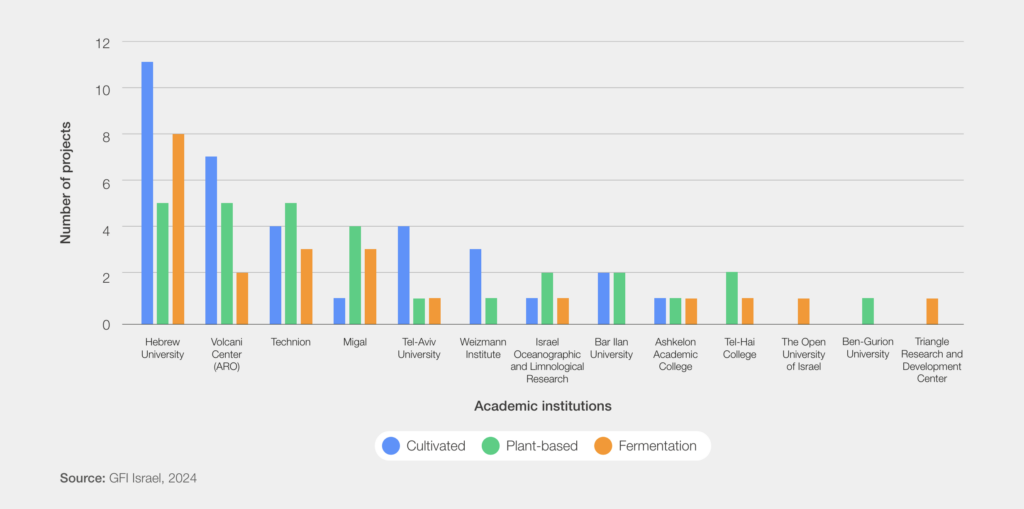
Israel is capitalising on its role as an innovation hub by targeting the creation of hundreds of new companies, manufacturing facilities, and significant job opportunities in the alternative protein space. “This highlights how strategic support from the government can foster innovation and stimulate economic growth,” suggests Voldman.
Finally, in the activation stage, there are two primary elements for stakeholders to consider. Countries must define a call to action by identifying critical shortcomings that could hamper its alternative protein goals, as well as the government policies that can bridge these gaps.
So if there’s limited research activity and domestic spending, state-funded grants can help remedy that. And if there’s a low rate of businesses going from pilot to commercial scale, regulatory advancements – like Brazil’s nod to using meat- and dairy-related terms on plant-based packaging and the approval of cultivated meat for sale – will go a long way in shifting that trend.
Meanwhile, developing an effective communication plan to convey the benefits of a protein transition is crucial too. Many countries are doing this by highlighting the employment potential, with studies showing alternative proteins could create 25,000 jobs in the UK, 10,000 in Israel, and 17,000 in Canada.
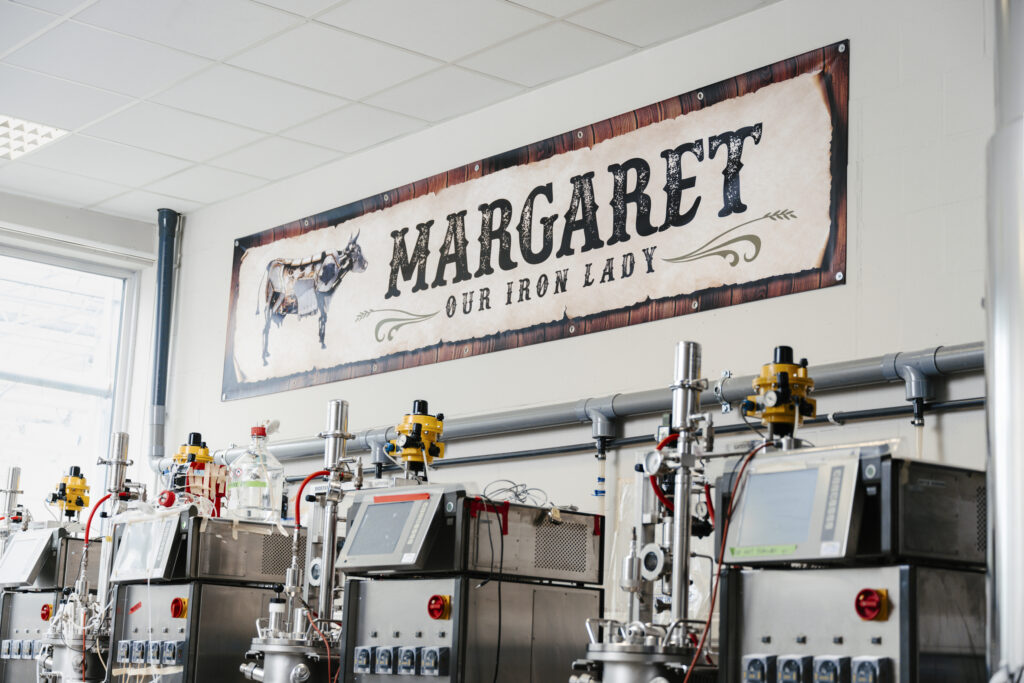
GFI and its partners are helping several countries across the world develop strategies to support the alternative protein industry, and is offering a free workshop to help organisations kickstart their own efforts. “There’s a growing recognition of the sector’s potential to drive economic growth, enhance food security, and address environmental sustainability, and many governments are increasingly exploring how to incorporate alternative proteins into their national policies,” says Voldman.
Collaboration between stakeholders, meanwhile, is key, says Rune-Christoffer Dragsdahl, secretary-general at the Vegetarian Society of Denmark, which helped shape the country’s action plan. “Throughout the process in Denmark, we drew inspiration from actions taken in other countries, and likewise, we hope others can be inspired by what has recently happened in Denmark and beyond,” he notes.
The report is intended aa a complementary tool to ensure public investments are made in areas with the highest economic and social returns. Research suggests that if governments pump in an additional $4.4B into the R&D and $5.7B into the commercialisation of alternative proteins each year, the industry could support nearly 10 million jobs by 2050.
But several hurdles currently impeded hinder policy progress. “One key challenge is that many countries are still figuring out how to maximise their existing resources to drive investment in alternative proteins,” says Voldman. “Each country has unique strengths – whether in research and development, agricultural resources, or manufacturing capabilities – but there’s often uncertainty about how to align these assets with the growth of an alternative protein sector.”

The lack of detailed, granular gap analyses is another significant barrier. “Policymakers need a clearer understanding of the specific gaps in their country’s alternative protein ecosystem and the potential return on investment from addressing them. Without this evaluation, it may be difficult to justify allocating public funds or prioritize investments,” she says.
“Additionally, it is sometimes assumed that every country needs to build a venture capital ecosystem or become a commercial manufacturing powerhouse to succeed in alternative proteins,” Voldman adds. In reality, each country can play a different role in the global alternative protein landscape. Some may excel in research, while others focus on sustainable agriculture or supply chain innovations.
“Accepting that there are multiple ways to benefit from the growth of alternative proteins can help countries develop more realistic and effective strategies,” she says, highlighting that these challenges can be addressed by leveraging existing national assets and adopting a more tailored approach to strategy development.
Doing so is absolutely critical to the future of the planet, its biodiversity, food security, and human health. As the report puts it: “If we’re to stay within planetary boundaries, business-as-usual food production won’t cut it.”
The post Exclusive: Think Tank Shows How Governments Can Create National Protein Transition Strategies appeared first on Green Queen.
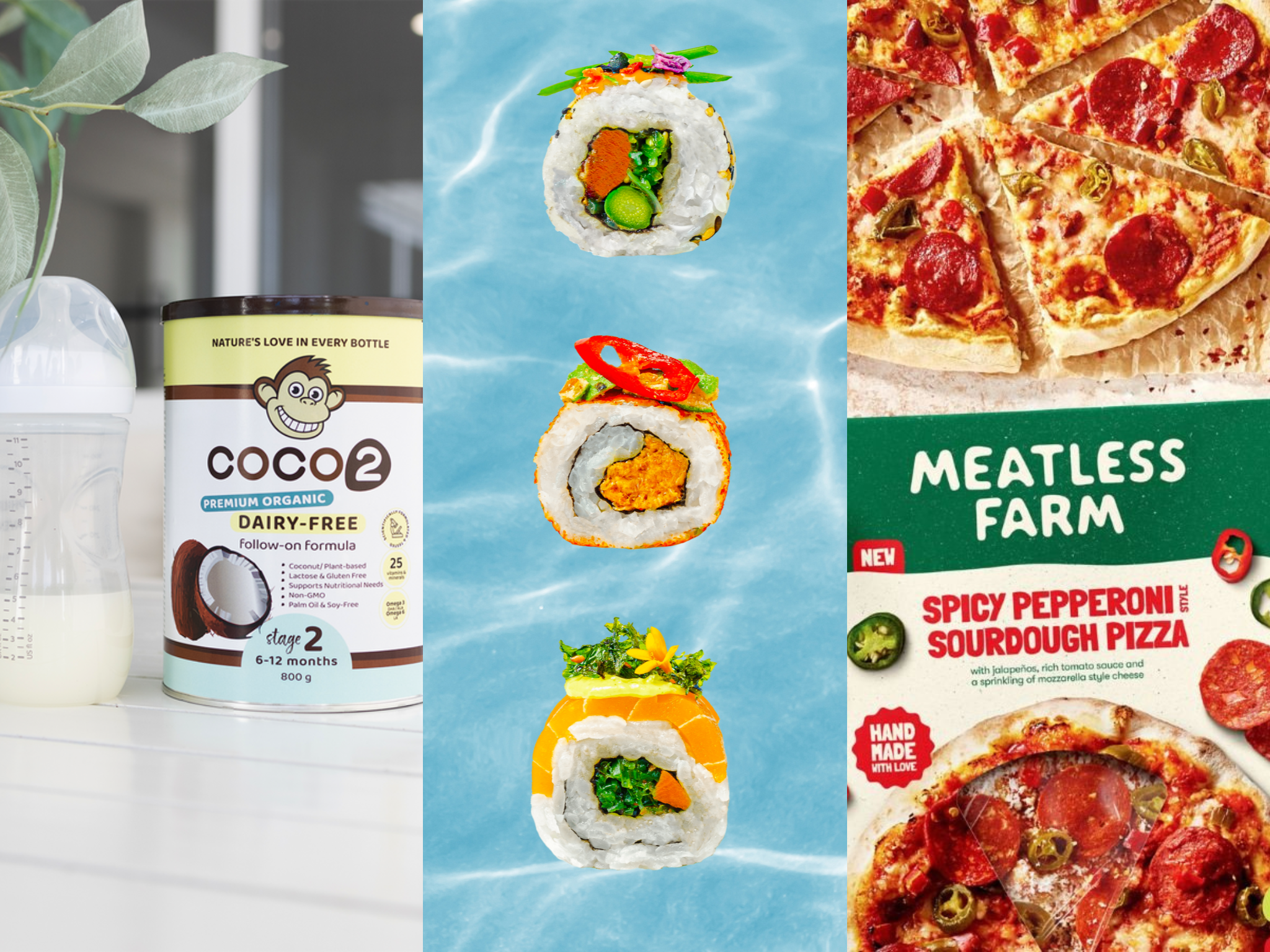
Los Angeles startup Before the Butcher has introduced a Cooked Plant-Based Breakfast Sausage Patty. The frozen product just needs to be reheated to an internal temperature of 165°F/74°C, and can keep in the freezer for 12 months.
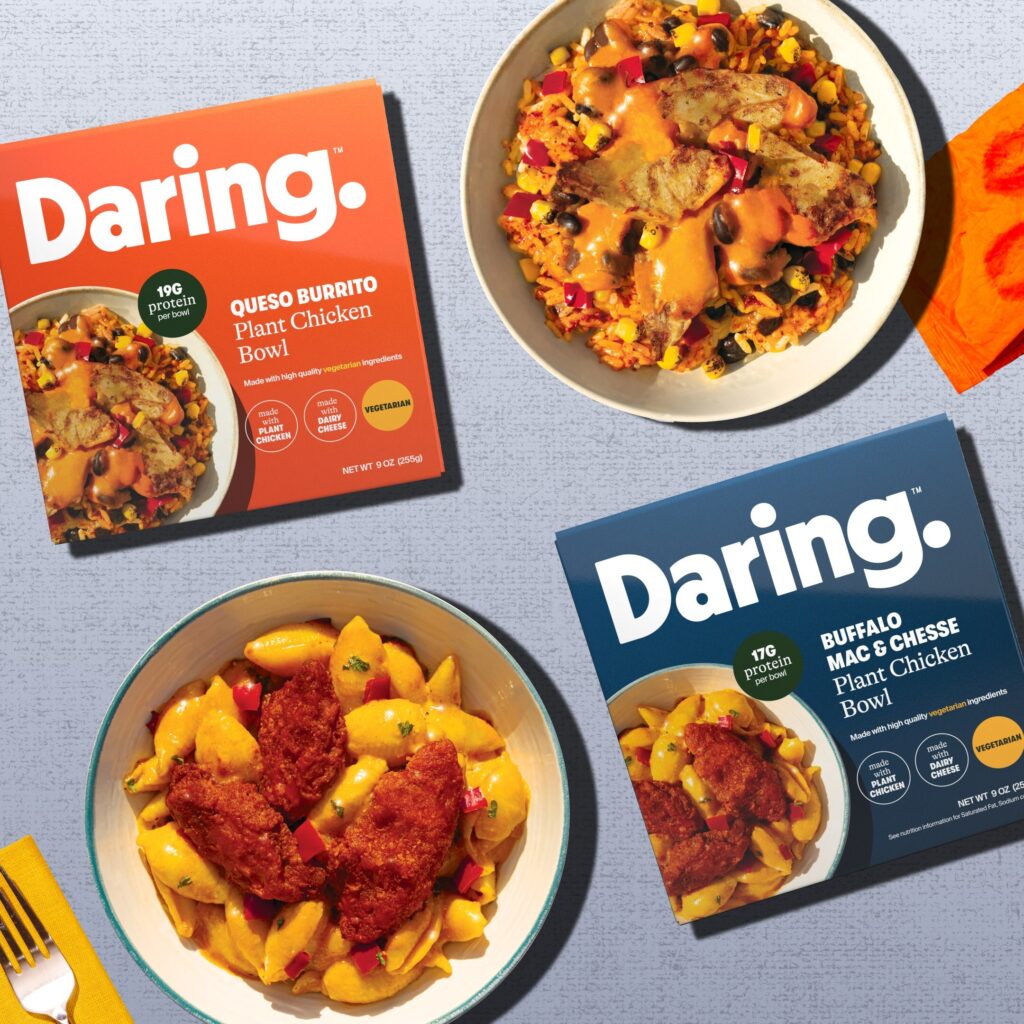
Also in California, plant-based chicken player Daring has launched two new frozen entrée bowls in Buffalo Mac & Cheese and Queso Burrito variants. Both contain dairy cheese, so aren’t suitable for vegans, and will be available at Albertsons, Target, and Publix stores nationwide.
US grocer Trader Joe’s has brought out an unsweetened version of its Organic Non-Dairy Coconut Beverage, which is available for $2.99 per 32oz pack.
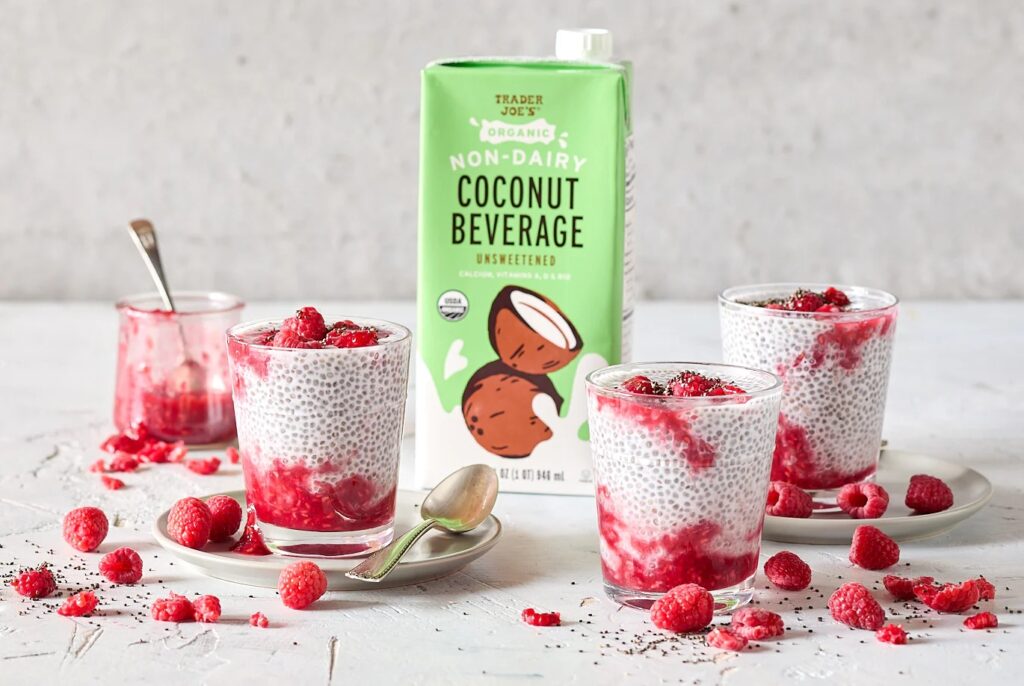
Across the Atlantic, GoodMills Innovation will exhibit three new texturants, two made from peas and one from fava beans and wheat, at the Fi Europe 2024 event in Frankfurt (November 19-21).
Dutch alt-seafood producer Vegan Finest Foods has released three plant-based sushi rolls under its Vegan Zeastar brand. They come in three options: Oshi No Salmon, Spicy No Tuna, and No Salmon Asparagus.

Spanish plant-based meat maker Heura is opening a pop-up called The Phamacy in France to celebrate its new additive-free white ham. The setting mimics a real pharmacy with staff dressed in medical gear and a menu in the form of prescriptions.
In the UK, plant-based brand Meatless Farm has added two vegan sourdough pizzas to its lineup in Ham & Mushroom Style and Spicy Pepperoni Style flavours (available at Sainsbury’s), while updating its existing Beef Style Meatballs, Pork Style Sausages, and Quarter Pounders (which can be found at Morrisons).
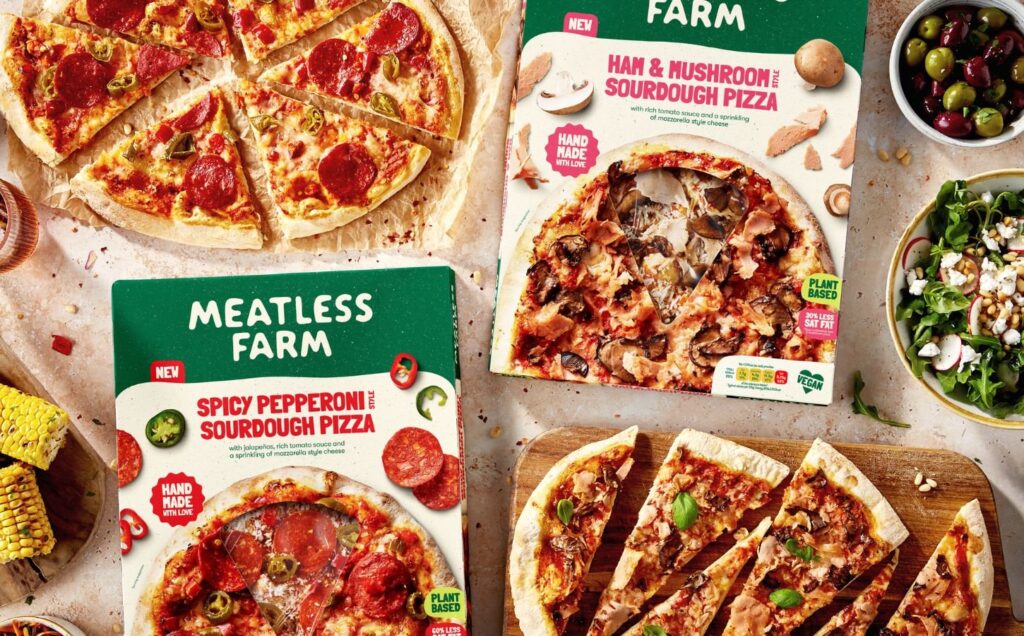
Fellow British plant-based meat brand THIS, meanwhile, has partnered with fresh pasta maker Dell’Ugo to release two vegan ravioli products. Available in Bacon & Cheese and Chicken & Pesto flavours, they’re available on the Dell’Ugo website and at Morrisons.
In more UK news, egg alternatives brand Oggs has launched Gingerbread Cakes and Hot Chocolate & Marshmallow Cupcakes as part of its Christmas lineup. The cakes can be found at Sainsbury’s and on Ocado for £3.95, and the cupcakes are stocked at Tesco Express, Sainsbury’s, Waitrose and Ocado for £2.35.
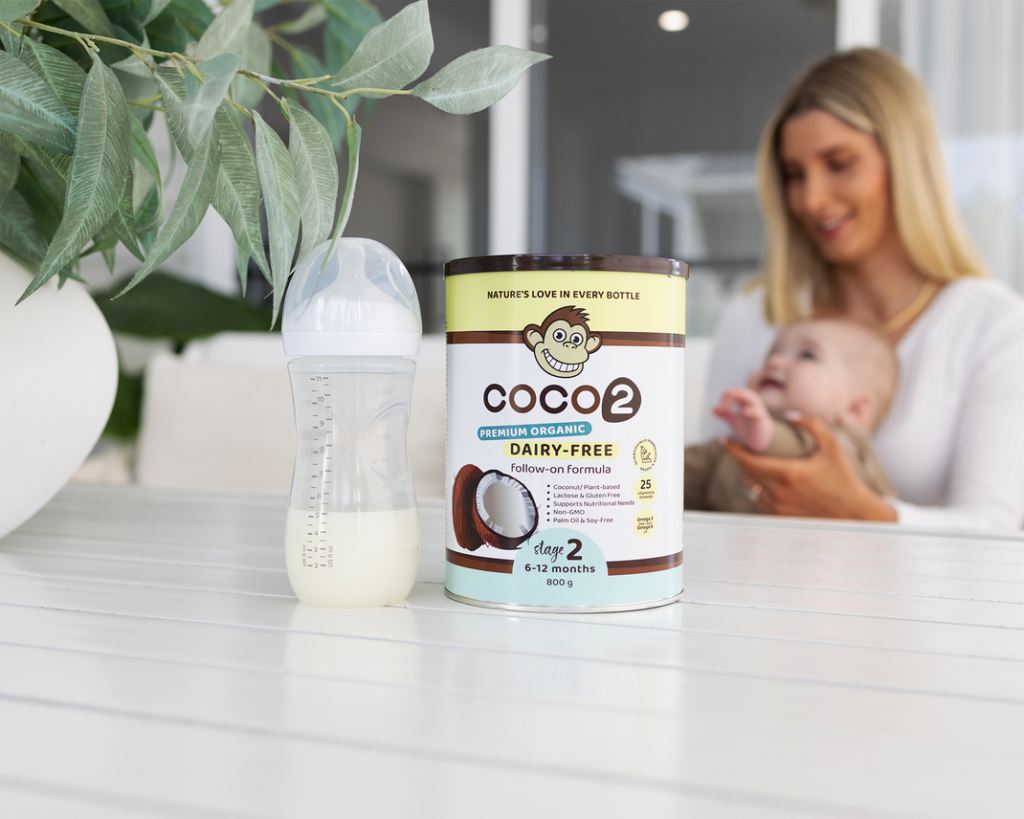
And Australia’s Coco2 has debuted what it claims is the world’s first coconut-based infant formula, which took 10 years to develop alongside the University of Queensland, parents, and healthcare professionals. It offers three products for different age groups: up to six months, six to 12 months, and 12+ months.
Marriott Hotels, the world’s largest hotel group, has enlisted AI-powered food waste startup Winnow‘s expertise in 53 of its kitchens in the UK, Ireland and Nordics, after reducing its waste by a quarter in the first six months of 2024 through the technology. The company now aims to cut food waste by 50% in 2025.
North Carolina-based cultivated seafood maker Atlantic Fish Co has won an SBIR PHASE I grant from the US Department of Agriculture, which it will use to advance R&D operations.
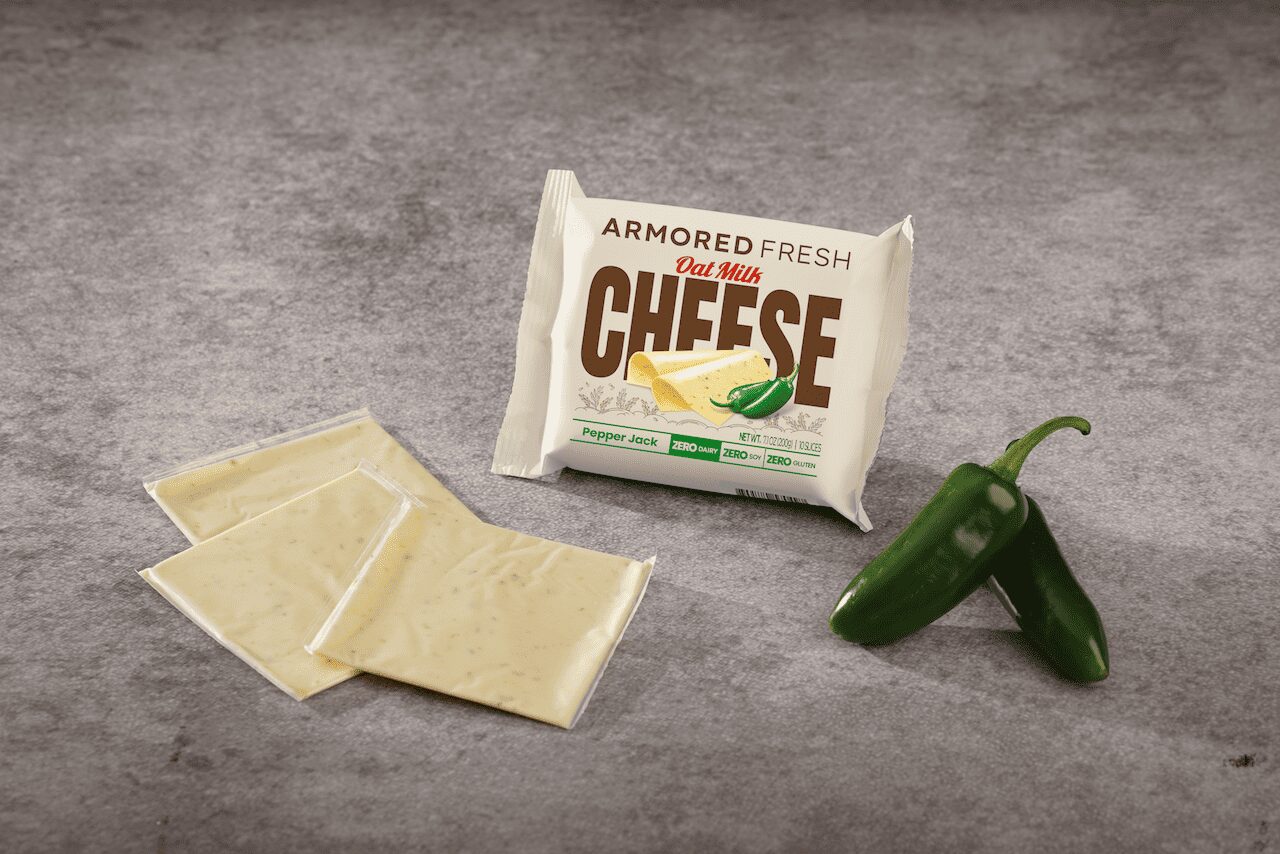
FoodBev Media has announced the shortlist for the World Plant-Based Innovation Awards 2024, with companies like MyForest Foods, Armored Fresh, Beyond Meat, Prime Roots, and Elmhurst 1925 among the finalists across 15 categories.
In the US, the Department of Agriculture, the Environmental Protection Agency, and the Food and Drug Administration have jointly released an online tool to help biotech companies – including those involved in cultivated meat, precision fermentation and molecular farming – navigate the regulatory pathway.

At the 2025 Osaka-Kansai Expo, the makers of Hello Kitty will feature the cartoon in an exhibit focused on the sustainability potential of algae. The character will be turned into 32 different types of algae, from triangular microalgae to wakame, looking to promote their role in planet-friendly food, biofuels, bioplastics, etc.
The judge presiding over Upside Foods‘s lawsuit against Florida’s cultivated meat ban held a hearing lasting over two hours, and has suggested he will rule by early November, well before the Art Basel event in Miami Beach (December 6-8), where the startup is hoping to showcase its chicken.

At the National University of Singapore, scientists have developed a scalable method for cultivating pork fat tissue using protein scaffolds made from secalin, a protein extracted from rye.
Alternative protein think tank the Good Food Institute Europe has published an updated edition of its scientific review on cell lines used in cultivated meat.
Finally, while promoting her new climate change movie The Wild Robot, Oscar-winning actress Lupita Nyong’o has endorsed eating plant-based food as one of the ways to “do something good for the planet”.
Check out last week’s Future Food Quick Bites.
The post Future Food Quick Bites: Coconut Infant Formula, Vegan Sushi Rolls & Regulatory Help appeared first on Green Queen.
This post was originally published on Green Queen.
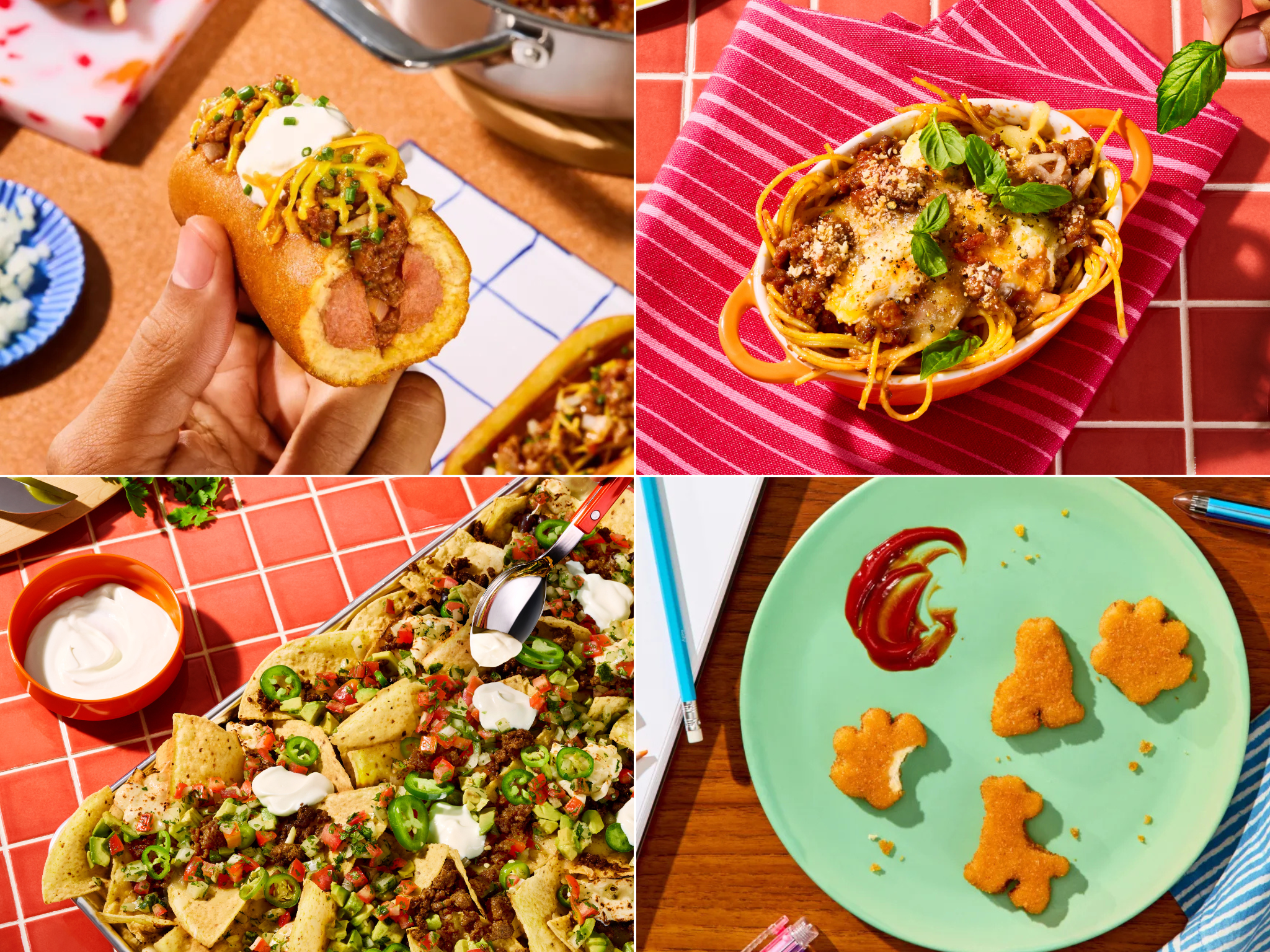
Impossible Foods is channelling its inner Mufasa with a new format of its vegan chicken nuggets, which are shaped as beloved characters from Disney’s The Lion King franchise.
The nuggets, which come two months before the premiere of Mufasa: The Lion King, are part of a new line of products released by the Californian plant-based meat pioneer, as it looks to meet families’ need for convenient options.
These include the kid-friendly Corn Dogs, which encase its signature hot dogs wrapped in a cornmeal batter), and Meal Makers, a two-strong range of flavoured Impossible Beef.
They represent the company’s first new product announcements in a year, following the aforementioned hot dogs in December 2023. The development comes as Impossible Foods has taken up the second-highest share in US retail in the segment, according to IRI data, with its beef and nuggets among products that are the bestsellers in their respective categories.

The Lion King nuggets are an extension of Impossible Foods’s long-standing alliance with Disney, part of an impressive overall foodservice record for the alt-meat giant.
“We’ve been very proud to work with Disney to serve Impossible products across their properties for the past four years, so it was a natural next step to collaborate on a new offering in the grocery aisle,” said Impossible Foods CEO Peter McGuinness.
“Our new Lion King Nuggets are a fun way for kids and adults to enjoy our delicious plant-based chicken nuggets – given we all know and love the epic movie, and, of course, the timeless soundtrack.”
They join the Wild Nuggies SKU in Impossible Foods’s shaped nugget suite, and contain 13g of protein and nearly 4g of fibre per 100g, as well as 60% less saturated fat than conventional chicken nuggets. Additionally, they require, 44% less water and 49% less land to produce, while emitting 36% fewer greenhouse gases.
Meanwhile, the Impossible Corn Dogs aim to evoke carnival nostalgia, pairing the beef hot dogs with a soft golden batter lodged upon a stick. Each corn dog has 9g of protein and 40% less saturated fat than conventional beef versions.

Doubling down on the need for convenience, Impossible Foods has spiced up its flagship beef SKU (literally) with the Meal Makers range. These come in Taco and Italian-Style flavours, although the exact seasonings used are under wraps for now.
Consumer testing has shown that the Italian-Style beef, which could be used to make lasagne, ravioli, homemade meatballs, and pasta sauces like bolognese, satisfied the beef cravings of almost 60% of tasters, and met or exceeded the expectations of nearly 90%.
Likewise, 90% of people also found the Taco Beef met or surpassed their expectations, while satisfying the beefy cravings of 63%. This flavour of the Meal Makers can be used in applications from nachos and enchiladas to burritos and, of course, tacos.
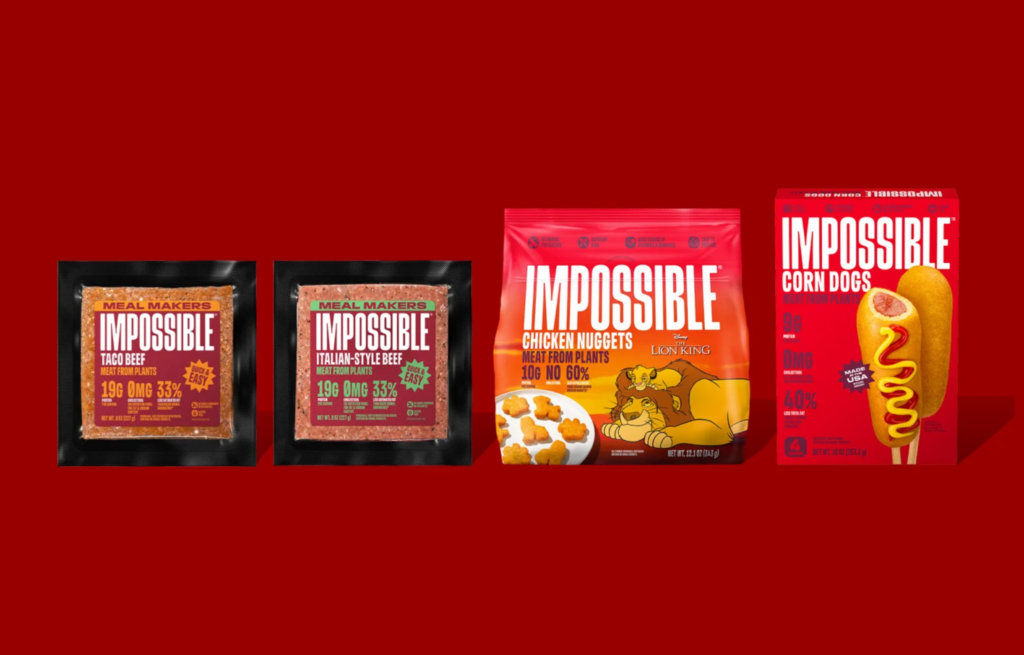
In June, a US survey focused on plant-based foods suggested that “convenience, visibility, and brand awareness are crucial factors” influencing purchasing decisions in grocery stores.
And a poll of 3,000 Americans in March revealed that while taste, price and health are still the most important purchase drivers for food, convenience is important to 57% of people (much higher than the 31% who cite sustainability).
Impossible Foods’s new products will come to grocery shelves in the coming weeks. The product launches follow the establishment of its Quality Meats pop-up restaurant in Chicago’s XMarket Food Hall, which is running throughout the fall.
This year, the company has also partnered with competitive eating champion Joey Chestnut, settled a lawsuit over its heme ingredient – taking over Motif Foodworks‘s business – and moved a step closer to entering the EU.
The post Impossible Foods Targets Convenience with New Pre-Seasoned & Family-Friendly Products appeared first on Green Queen.
This post was originally published on Green Queen.
Here are some of the riskiest-to-consume foods that have been recalled due to dangerous—and sometimes even fatal—outbreaks.
As of October 16, 2024, a nationwide recall expanded to nearly 12 million pounds of ready-to-eat meat products sold at Trader Joe’s, Target, Kroger, Costco, Walmart, and other retailers due to possible listeria contamination. Some of the recalled products include prepackaged salads containing meat, chicken wraps and bowls, and frozen meals.
Meat producer BrucePac was found to be the source of the bacteria. Listeria infections can cause fever, muscle aches, nausea, vomiting, and, in some severe cases, even death.
Foster Farms recalled its chicken in 2014 after a salmonella outbreak sickened more than 600 people in 29 states.
Chicken flesh can also be infected with bird flu. In 2023 alone, at least 58 million birds confined on farms were systematically killed—often by horrific methods, such as slowly suffocating them—to limit its spread. Worldwide, more than half the people with confirmed infections of the H5N1 strain of bird flu have died, and the World Health Organization has called the risk of the virus spreading to humans “an enormous concern.”
Additionally, in 2024 dozens of tigers in zoos in south Vietnam died after a bird flu outbreak. They were likely infected with the virus after being fed contaminated chicken flesh.
An estimated 90% of listeria infections in the U.S. result from consuming deli meat.
The largest U.S. listeria outbreak in a decade, linked to a Boar’s Head plant in Virginia, has reportedly killed at least 10 of the 59 people hospitalized across 19 states. The outbreak led to a nationwide recall of deli meats and the indefinite closure of the facility.
Eggs are a common source of salmonella—even if they come from farms labeled as “organic” or “free range.”
As of October 2024, a nationwide recall of eggs due to salmonella contamination had been escalated to Class 1—the most serious classification of recalls—meaning that they could cause serious health consequences or even death. An ongoing investigation into the salmonella outbreak linked to eggs supplied by Milo’s Poultry Farms—a company that claims to sell “cage-free” eggs—has found a total of 65 infections as of September 2024, and 24 people have reportedly been hospitalized so far.
Widespread and sometimes deadly listeria outbreaks have been linked to consuming cold-smoked salmon. Between August 2022 and November 2023, an outbreak tied to a Norwegian fish distributor resulted in more than 700 reports of listeria contamination.
Nearly half of all fish consumed worldwide each year are raised on land- or ocean-based aquafarms, which confine them to cramped, filthy enclosures, where disease can easily spread.
Shellfish such as shrimp, crabs, clams, and oysters are among the most commonly consumed sea life linked to hepatitis A, which can cause liver failure and even death.
Additionally, in August 2024 oysters from two facilities in Cape Cod were linked to four cases of campylobacter illness, which results from a type of bacteria that causes diarrhea, among other symptoms.
In 2017, a woman was infected with Vibrio vulnificus—a “flesh-eating” bacterium—that left her hospitalized and covered with lesions after she ate a raw crab dish.
In 2022, listeria cases spread across six states, causing the recall of 24 brands of brie and camembert cheeses. Of the six people who were infected, five were hospitalized.
Another multistate outbreak of listeria was linked to queso fresco and cotija cheese manufactured by Rizo Lopez Foods and reportedly caused 23 hospitalizations and two deaths.
An apple a day won’t keep the doctor away if you consume flesh, eggs, and dairy. In fact, animal-based products account for an estimated one-third of foodborne illnesses globally.
An extremely high percentage of all the flesh from the chickens, turkeys, cows, fish, and pigs slaughtered every year in the U.S. is contaminated with E. coli, campylobacter, listeria, or other dangerous bacteria that live in the intestinal tracts, flesh, and feces of animals. These illnesses can cause symptoms ranging from vomiting and diarrhea to organ failure and death. Farms—which often cram animals into filthy sheds, sometimes amid their own feces—are hotbeds of disease and bacteria. Animal agriculture even plays a role in foodborne outbreaks that are traced to produce, as these pathogens commonly originate from animal waste.
Animal agriculture increases the risk of disease and illness for everyone—even those who stick to veggies. The best thing we can do for ourselves, animals, the planet, and our fellow humans is to go vegan.
In addition to shellfish, other fish are also risky to consume:
And avoiding certain types of cheese isn’t enough, because all dairy is bad for you:
Don’t just avoid these animal-based products—keep all flesh, eggs, and dairy off the table. Make the switch today:
The post Your Next Trip to Trader Joe’s, Costco, or Another Grocery Store Could Kill You—Stay Away From THESE Foods appeared first on PETA.
This post was originally published on Animal Rights and Campaign News | PETA.